You're currently viewing a custom sorting.

Originally Aired: 1990-10-29
Synopsis:
The crew meets Tasha Yar's sister, Ishara. [DVD]
Problems
- Right after the phaser drilling and the away team beamed into the core of the alliance, Riker fired at an enemy and the phaser blast sent him flying halfway across the corridor! I imagine stun settings are pretty stunning, but that was an unrealistic blow. Despite this inconsistency, I rather enjoyed watching that. It's so funny to see that guy fly across the hallway like that!
Factoids
- In this episode it takes Beverly a few hours of testing to determine if Ishara is Tasha's sister. Just ten years later in Voyager, this kind of testing can be done in minutes.
Remarkable Scenes
- The poker scene at the beginning.
- Data's poker face.
- Riker: "Data have you got a flush or a full house?" Data: "It will cost you twenty to make that determination, sir."
- Data literally "throwing away" the cards he was asked to throw away.
- Data explaining Riker's trick to Worf and Troi, then taking the winnings.
- Data, describing Yar's death: "Lt. Yar was killed on Vegra 2 by a malevolent entity." Ishara: "In battle." Data: "No. She was killed as a demonstration of the creature's power without provocation."
- I like the scene where they're talking about using the phasers to drill a hole for the transporter and removing Ishara's implant. The dialog was all technically correct and appropriate.
- Ishara begging Data to leave.
My Review
I found Ishara and Data's interactions with each other a bit trite. There have been better episodes exploring Data's emotions and ability to form friendships. Though Ishara's latent disgust with her sister was realistic and interesting. To that end, I enjoyed the cameo. Though I don't think it was a surprise to anyone that Ishara was going to betray everyone, so her "friendships" with everyone seemed obnoxious. A decent, though a bit flawed episode.

Star Trek Pic - 1x04 - Absolute Candor
Originally Aired: 2020-2-12
Synopsis:
The crew's journey to Freecloud takes a detour when Picard orders a stop at the planet Vashti, where Picard and Raffi relocated Romulan refugees 14 years earlier. Upon arrival, Picard reunites with Elnor, a young Romulan he befriended during the relocation. Meanwhile, Narek continues his attempts to learn more about Soji while Narissa's impatience with his lack of progress grows.
Problems
- How did they know to beam Elnor aboard too along with Picard?
Factoids
- This is the first episode of Star Trek to not show a character wearing a Starfleet uniform.
Remarkable Scenes
- Elnor: "Why don't you like children?" Zani: "Because they're demanding, distracting, and interfere with duty and pleasure alike."
- Elnor: "You told me stories about Data. He had an orange cat named Spot." Picard: "That's right." Elnor: "I've still never seen a cat."
- Elnor: "Why do you need me?" Picard: "Because I'm an old man and you're a young one. And you're strong."
- Picard trampling over the "Romulans only" sign.
- Elnor: "Please my friend, choose to live." Adrev ignores him and is decapitated shortly thereafter. Elnor: "I regret your choice."
- The space battle against the old style Romulan warbird.
- Seven of Nine's appearance. Seven: "You owe me a ship, Picard."
My Review
This episode starts off with a tone straight out of Firefly and closes with a green-blooded Romulan decapitation followed by a space battle featuring an old style Romulan Bird of Prey straight out of TOS: Balance of Terror; cliffhangering with Seven of Nine! Whew! Hopefully we get a good explanation for why she showed up at just the right time. Was she following Picard? In any event, the space battle was one of the best ones featured in Star Trek in quite some time. Yes of course Discovery and the Kelvin films have their fair share of action, but often their action is overkill and not well earned. Unlike those, this dogfight between the La Sirena and the old style Romulan Bird of Prey isn't overwrought in the slightest. It's just the right amount of action we needed to add a bit more fun to an already fairly strong story.
The exchange between Picard and Senator Adrev was also a highlight of the episode as a window into the Romulan feelings of betrayal by the Federation. It's understandable that the excessively secretive nature of Romulan culture would cause many of them to believe that the Federation totally failing to organize a competent relief effort in the face of both overwhelming logistical challenges and internal political turmoil might have been an intentional conspiracy to lull Romulans into a false sense of security so that they would end up in a significantly weakened position by placing undue trust in an ancient enemy, leaving Picard in the unenviable position of exclaiming something to the effect of, "It's not what it looks like!" And having Picard express outrage to Elnor about needlessly killing Adrev when presumably a non-lethal way of subduing him would've sufficed was also a nice and necessary touch. It makes sense that Elnor would do that and that Picard would react to it that way.
There are only a few wrinkles in this episode. Adding "Emmet" to the flock of Rios' holograms further compounds the annoying ambiguity about the status of sentient holograms relative to the ban on androids. Also while the ending of this episode is great fun, the pacing of the episode otherwise drags a bit at times. Even so, this is one of the stronger episodes so far.
The following are comments submitted by my readers.
- From Azalea Jane on 2021-08-05 at 9:24pm:
D. Jurati, being candid: "Anyone else think the 'Way of Absolute Candor' sounds potentially annoying?"
OMG. It took me a second, but then I burst out laughing. Personally, I think absolute candor sounds like a fantastic idea, in theory.
I knew Seven of Nine was in this series, but I didn't know when or how she would show up. I haven't even watched the seasons of Voyager she's in, but her appearance was still an amazing and gratifying moment. - From JD on 2021-09-06 at 1:52pm:
I didn't notice it when I first watched it when it came out - Soji's little data-style head bobbing tick!
It was so obvious now I was looking for it! When she's walking through the cube with Narek... and its really obviously reminiscent of data.
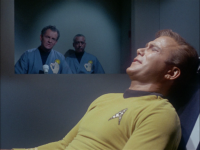
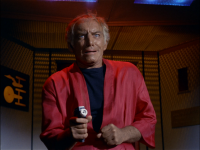
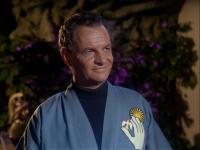
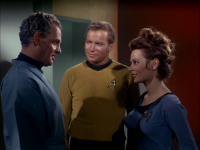
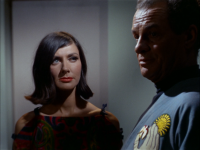
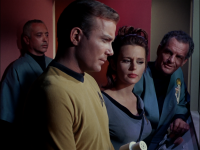
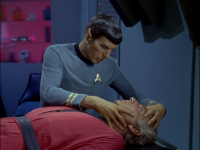
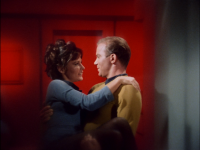
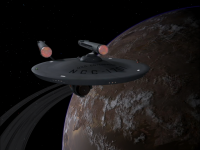
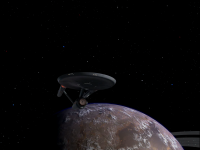
Star Trek TOS - 1x09 - Dagger of the Mind
Originally Aired: 1966-11-3
Synopsis:
A new treatment for the criminally insane has deadly results. [Blu-ray] [DVD]
Filler Quotient:
2, filler, but an enjoyable episode nevertheless. You can skip this one, but you'd miss out on some fun.
- It's worth noting that this is the first episode to feature a Vulcan mind meld. However, none of the exposition revealed here about that requires that this episode be seen before any of the other episodes featuring mind melds.
Problems
None
Factoids
- This episode establishes that Vulcans are capable of telepathy when it is focused on an individual through touch.
Remarkable Scenes
- McCoy and Kirk arguing over Gelder.
- McCoy forcing kirk to launch an investigation.
- Kirk annoyed with McCoy's selection for his assistant.
- Adams' toast: "To all mankind. May we never find space so vast, planets so cold, heart and mind so empty that we cannot fill them with love and warmth."
- Noel planting hunger in Kirk's mind.
- Noel planting fond memories of a romantic encounter between them in Kirk's mind.
- Adams' death, nasty!
My Review
An escape attempt by a criminally insane man that isn't what it seems. Certainly an original plot for Star Trek so far and during the first twenty minutes of the episode the plot is well paced and intelligently constructed. It's unclear whether or not McCoy's suspicions will be validated until almost halfway through the episode. Unfortunately, once it becomes clear that Adams is up to no good, the pacing of the episode crashes as the episode begins to focus solely on slowly revealing the exact nature of what specific evils Adams is up to. Of particular note are the frequent, lengthy scenes where Spock and McCoy attempt to access Gelder's memory. Likewise, I would have preferred fewer and/or shorter Kirk-in-the-brainwashing-chair scenes.
Kirk's interactions with Noel were considerably more interesting. While her character was a bit annoying at times for being all too eager to defend Adams even after the originally all too trusting Kirk had moved on from that attitude, the rest of her characterization was well done. I'm amused that Kirk and Noel apparently had some sort of fling at a Christmas party and that while she clearly wishes it had been more than that, she's a great deal more comfortable with the reality of those events than Kirk is. Their sexual tension is well played, tasteful, and relevant, unlike similar scenes in some previous episodes.
What doesn't play as well are Adams' motives. Since the episode offers us little to go on, we can only conclude that he somehow went mad with the power to enslave people with his beloved brainwashing machine. While it's never made clear just what his plans for Kirk and Noel were once they discovered what he was doing, it stands to reason that he was attempting to wipe their memories of what their investigation had revealed. But if that was what he was trying to do, then why was he wasting his time planting so much other nonsense in Kirk's mind when he could have just planted the memory of an uneventful investigation and sent him on his way? Once again we're forced to just accept that another dignified Earth celebrity suddenly went inexplicably crazy. This is already becoming quite a cliche.
The following are comments submitted by my readers.
- From rhea on 2008-04-27 at 4:16pm:
just a polite request: could you maybe give it a rest with the pacing? People in the 60s weren't as used to sensual overload as we are today. Just because an episode seems slow to a person who is used 20 cuts per minute does not mean it is bad - I keep thinking that the fault, if you will, is the audience's. I wish things like intelligent detail, good dialog, character revelations or daring experiments (for the time, acknoledging that this is a classic/cult show) would count more in your reviews. - From tyrannorustus on 2008-07-08 at 7:18am:
I'm currently working my way through TOS with your reviews and for the most part find myself in agreement, though I disagree on your comments concerning the pace of the episode. What makes preceding episodes so agonizingly slow paced is the fact that the viewer clued in at least 20 minutes ahead of the crew (e.g. "The Man Trap" and "Charlie X"), making the reaction shots of Kirk's pensiveness and Spock's eyebrow furrowing nearly insufferable. This episode doesn't have that same feel because the viewer is learning along with the crew. For example, there is no obvious music cue to let the viewer know too early that Adams is up to no good. While I don't agree with the previous poster that people in the 60s weren't used to visual over-stimulation (This is the decade that brought us "2001" and "Lawrence of Arabia" after all) I agree that criticizing the show on pacing is inappropriate. Every scene contributes to moving the plot forward and the dramatic build up is very well done. In particular, the parallel climax of Spock's mindmeld with Gelder and Adams' assault on Kirk's mind is well done. A very good episode from the early days of the show. - From CAlexander on 2011-04-10 at 8:04pm:
I basically liked the episode. Dr. Adams does a good job of being a creepy sociopathic sadist. My only complaint is that it is excessively foolish of him to lock Kirk and Noel in a room with such an obvious escape route. But at least his behavior is consistent – he let Van Gelder get away too!
As far as the question of Adams motives, it is true that they don't reveal much to us, which is too bad. But what we do see of his personality seems internally consistent to me. Here was my impression of Dr. Adams:
Dr. Adams has always been an egotistical, sadistic sociopath. He has probably covered up many crimes, and took up penology in the same way that, in other TV stories, an arsonist might take up firefighting. He wrote some good papers and used his manipulative charm to trick the well-meaning but stupid Federation bureaucracy into giving him a penal colony where he could be all powerful. And it worked, until Van Gelder escaped. Being an egotist, he assumed he could bluff Kirk into leaving him alone with Van Gelder, just like he bluffed all the other Federation officials. But when he finds it didn't work and realizes Kirk and Noel have figured out what is up, he can't resist the perfect setup for a little sadism. Then he locks up Kirk and Noel and tries to figure out what to do. Given what we see of Van Gelder, it is clear that while the neutralizer is pretty impressive in the short term at making post-hynotic suggestions, it is far less effective in the long term. He can't just wipe Kirk's mind and let him return to the ship – without constant re-use of the neutralizer, Kirk is bound to recover his memory. Adams knows he is in big trouble, but his ego tells him there must be a way to regain command of the situation. It fits his sadistic style to try to turn the neutralizer on full bore and try to torment Kirk until he can break him down completely. Hard to know what exactly he was thinking, since the plan doesn't get too far. Perhaps it involves brainwashing Kirk into "loving" Dr. Adams and working with him. Perhaps he hopes to drive Kirk insane so the crew will leave him at the penal colony.
- From Mike Meares on 2012-02-25 at 2:56am:
This was a very good episode and a good review by Kethinov. Although I agree with the remarks by CAlexander.
I did notice a couple of minor problems with this episode.
The box that is beamed aboard from the Tantalus Penal Colony and the one Dr. Marcus Van Gelder is hiding in is labeled Classified Material - Do Not Open. But the box is clearly unlocked and Van Gelder opens it from the inside with ease. Would the Tantalus Colony really send off Classified Material without checking to see if it is locked down properly?
When Van Gelder reaches the Enterprise bridge, he attacks and knocks out a security guard. Even after Van Gelder is subdued by Kirk and Spock, Dr. McCoy makes no effort to check and see if the security guard is all right.
When Spock does the mind meld on Van Gelder there is a slight problem. Van Gelder is in great pain but at no point does Spock show any signs of pain himself. Strangly this is in direct contridiction to Spock's mind meld with the Horta in "The Devil in the Dark." Spock took on the pain the Horta was feeling, why doesn't Spock take on the pain Van Gelder felt?
This has gotten me thinking too. Would the vulcans have developed a technic whereby you take on the feelings of others? Especially since the Vulcans work so hard to suppress their own emotions?
All in all though "Dagger of the Mind" was pretty good. The acting by Morgan Woodward and James Gregory were really good. I think it would have been a nice touch to show a painfree Van Gelder at the end of the episode. Woodward did such a great job showing the pain Van Gelder went though, it would have been wonderful to see Val Gelder "healed."
I also liked the build up in this one too. The story kept you guessing for a long time. However, I do think they could have made it last longer. When Kirk and Helen are first introduced to the neural neutralizer there is a tech operator in the room. After Kirk leaves the tech operator begins to tell the patient in the chair that if he tries to remember any part of the discussion he will feel teribble pain. I think that gave away the plot way to early.
I wasn't crazy about the "romance" angle thrown into the story. How many ex girl friends does Kirk really need? However, I did enjoy how they handled this one. At first you can actually feel how upset Kirk is about the whole ordel of working with a woman that he had some contact with outside the ship. It was a different approach than they normally did or since and one that was very refreshing.
And I said it before and I will say it again: I love having two people man the transporter room. I wish they had kept that up.
- From Schreck on 2013-05-23 at 8:35pm:
I wonder how many episodes of TOS had to do with insanity of some kind. It seems it is where the writers keep going to it with almost always negative results…I give it a 6.25 and my brother a 7.25 - From Alan Feldman on 2014-05-31 at 4:53am:
DAGGER OF THE MIND
Morgan Woodward is awesome in this episode. He said playing Van Gelder was the most physically and emotionally exhausting acting job of his career. Also, it took 3 weeks for him to return to normal after playing the role, during which he was anti-social.
Re your comment about seeing a normal Van Gelder at the end, what would bring him back to normal? Can the machine be used to undo the damage?
If the machine empties your mind, and Kirk had a dose at full blast -- twice, even! -- how could he have any mind left? He'd be a vegetable. At the end, Noel says it wasn't set high enough to kill when Adams was there. So why didn't it kill Kirk?
Whenever the power is out, the emergency lights are awfully bright!
OK, when the force field is down, Spock says, "Get some security people and follow me down." Why aren't the security people _already_ there? Moreover, why don't they have "security people" there 24x7? Seems like a no-brainer.
To Mike Meares:
Helen was not an ex-girlfriend. There was just that single incident at the Christmas party, and it's not clear at all exactly what happened.
Kirk had four ex-girlfriends:
Ruth in Shore Leave
Areel Shaw in Court Martial
Janet Wallace in The Deadly Years
Janice Lester in Turnabout Intruder
If I missed any, please do tell.
Hey, Helen _Noel_ at a _Christmas_ party. Coincidence?
AEF, aka betaneptune - From gee on 2014-12-06 at 2:05pm:
There is a glaring continuity error regarding the security screen of the penal colony. Selected script excerpts below.
Berkeley: energize
Kirk: having trouble, gentlemen?
Berkeley: I just don't understand the problem, sir
Kirk: you're beaming cargo down to a penal colony, Mr. Berkeley
Berkeley: Their security force field, sir.
Kirk: ...might lead to the power supply, short-circuited, it would cut off the
security force field
Dr. Noel turns off the master power switch
security guard turns it back on, after a struggle with Noel
Noel kicks him into high voltage circuit, killing him
Berkeley: Mr Spock, force-field is gone, I can send you right to the source of
the interruption
Spock: get some security people and follow me down
Noel escapes back through conduits
Mr Spock beams down, turns off 4 switches next to "Security Screen" and lights
go off
Spock "Enterprise, this is Spock, force-field has been eliminated"
Spock flips another switch (apparently the same master voltage switch) which
re-enables power to the mind chamber
- From Zita Carno on 2018-08-09 at 2:50pm:
A lot of credit has to go to Dr. McCoy who, for all that he called himself "an old country doctor", was light-years ahead of everyone else. He was the one who pushed the reluctant Spock with the urgent "Will it work---or not?" Spock actually performed a quieter version of a powerful Vulcan mind-fusion, coupled with telepathic hypnosis, in which he delivered two suggestions in a half-whisper---one of well-being and relaxation, the other of weightless suspension. Van Gelder was not in any pain at the time, having been pumped full of tranquilizers, and the combination exerted a calming effect on his mind so he was able to describe his ordeal. And this was not the last time Spock would use this particular technique; it was a lifesaver in many instances. - From Chris Long on 2018-12-10 at 1:40am:
This episode was really awesome in some parts and truly inconsistent in others...
The force field inconsistencies go even further than others observed! At the start, they had no problems communicating with the ship back and forth but couldn't send cargo. Then once Kirk and Noel are on the planet, the force field prevents commo. minor, perhaps, but still bugged me.
Why prevent Lethe from joining the toast? And why the stupid toast anyway? It seems to me as I think back to the 60s, that people on TV were toasting all the time! Perhaps that is why but today it seems unnecessary and stupid.
As far as Spock's melding compared to the Horta, in this case, he completely calms Van Gelder from the get-go. He couldn't do that with the Horta.
I agree that Morgan Woodward's acting was awesome and he should have gotten an Emmy for it. Very emotional to watch. Maybe he did!
Noel, planting the hunger notion should have been enough for her to know she was playing with fire by trying to plant all the Christmas BS in his mind afterward.
I agree that it would have been a much better conclusion to see Van Gelder sane and well.
Maybe also not destroy the machine. It did work and surely could be modified to have safeguards in place. Perhaps a set-up where two people are required to activate it so that no one person can get evil with it.
And why were the security forces in the place on board with the obvious insanity? I suppose Adams could have used one of the insane criminals to pin a guard in the chair one by one until they were all in with the madness.
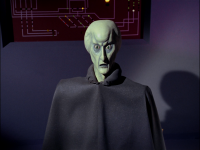
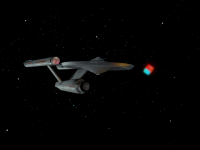
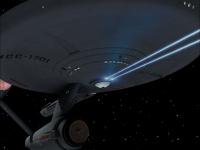
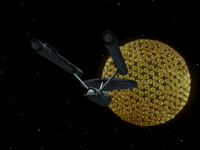
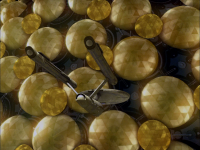
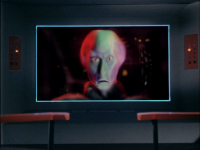
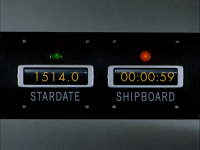
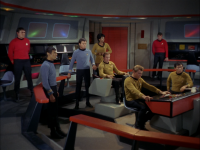
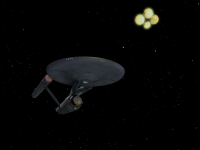
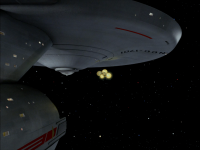
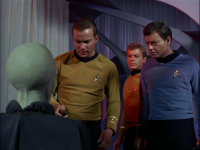
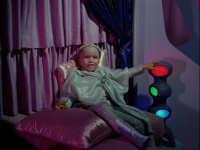
Star Trek TOS - 1x10 - The Corbomite Maneuver
Originally Aired: 1966-11-10
Synopsis:
Kirk bluffs his way past what appears to be a powerful alien. [Blu-ray] [DVD]
Filler Quotient:
3, bad filler, totally skippable.
- Pretty lame episode with no significant long term continuity. The factoid about Spock's parents is nonessential and can be gotten in context in later episodes when it becomes relevant.
Problems
- Visual continuity is a bit off in this episode because it was one of the earliest episodes to be produced despite it being aired so much later. As such, it's easy to notice some obvious out of place details, such as Uhura's uniform being the wrong color.
- Why did Scotty tell the away team to bend down to accommodate the low ceiling when the next room over was tall enough? Why not just beam them into that room instead?
Factoids
- This episode establishes that the Enterprise can fly at warp speed in reverse.
- This episode was nominated for the 1967 Hugo Award for Best Dramatic Presentation.
Remarkable Scenes
- McCoy purposely ignoring the red alert to make Kirk finish his physical...
- McCoy: "What am I, a doctor or a moon shuttle conductor?" (Count #1 for "I'm a doctor, not a [blah]" style lines McCoy is famous for.)
- McCoy, talking to himself: "If i jumped every time the light came on around here I'd end up talking to myself."
- The Enterprise's attempts to escape the cube and eventually destroying the cube.
- Kirk complaining about having a female yeoman.
- Sulu very quickly compensating for Bailey's delinquencies.
- Kirk determined to help the enemy in need.
My Review
An episode with a terrific theme and a terrible execution. The spirit of Star Trek and the mission of the Enterprise, to peacefully seek out new life and new civilizations, is demonstrated to its fullest effect here. Despite what easily could have been an armed conflict with what appeared to be a hostile alien species, Kirk's actions prevail in cultivating a peaceful ending, complete with establishing diplomatic relations and a cultural exchange. That all sounds great until you start to examine the details of the plot more closely, at which point unless you're willing to put up with a lot of stylistic oddness, the episode comes off as largely a dramatic failure due to its overwhelming awkwardness.
There are three details of the plot which render the episode difficult to watch. The first and most obvious detail is the incredibly slow pace. I bet I could find over ten minutes of unnecessary material to cut from the episode just from the various scenes where dramatic music plays while the crew stares anxiously at the viewscreen awaiting their impending doom. It's completely unnecessary for us to spend so much time taking in closeups of each individual character's reaction to each individual plot development several times in a row. Camera focuses on viewscreen, camera focuses on crew, camera focuses on viewscreen, camera focuses on other crew... gets old fast.
But even editorial cuts to speed up the pacing wouldn't save us from the insufferable behavior of Bailey and Balok. Bailey's oft-recurring incompetence and emotional outbursts happened so frequently that I found myself largely agreeing with McCoy's flagrant questioning of why Kirk ever promoted the guy to a bridge officer in the first place. Likewise, Balok's overwrought and intensely awkward proclamations of doom and gloom at various points throughout the episode were reminiscent of the sort of bad acting you'd expect to find listening to a cheesy sci fi radio show from the 1950s. Granted, the acting on this show is not typically stellar, but Balok's was bad even for this show's standards. As for the "real" Balok revealed at the end, the less said about that aesthetic choice, the better...
The final difficult detail to deal with is Balok's shoddy reasoning for his stated motives for his actions, something which is becoming all too common on this show for antagonists. Throughout the episode, everything Kirk does just seems to irritate Balok more and more for no particular reason. Every time Kirk offers Balok the hand of truce and friendship, Balok slaps it away. He claimed he did this to rule out deception in Kirk's statements, but in so doing he gave Kirk plenty of reasons to flee and leave Balok's ship disabled in order to ensure a safe escape. Had Kirk chosen to do that, Balok never would have gotten a chance to participate in the peaceful cultural exchange he desired. As such, his tactics were flawed and worked only because of Kirk's innate desire to take questionable, unreasonable risks in the spirit of fulfilling his mission.
The following are comments submitted by my readers.
- From John Bernhardt on 2010-01-12 at 5:44pm:
This was the first episode produced after the two pilots. - From Paul Loudon on 2010-10-01 at 2:22pm:
Uhura is in a yellow uniform because it is only the third episode ever filmed, her first appearance and hence they were still working these finer points out. - From CAlexander on 2011-04-11 at 4:13pm:
I thought this was a solid episode, though certainly not perfect.
- I thought Balok's behavior was strange too, but I interpret it differently. His ship was never really disabled. He was essentially a superbeing who was testing the crew. Superior races in Star Trek consistently have very picky opinions about what makes a lesser race worthy of contact. So I believe he was testing them to see if they "had evolved to a point" where they were worthy of a cultural exchange.
- I agree that Balok's acting is way over the top. But I don't mind, it is part of the charm. Except that his repetitiousness gets monotonous after a while.
- I agree that some of the scenes are stretched too long. On the other hand, it can be nice to see a show with a slower pace once in a while. After all, it is still a lot faster paced than real life.
- My main complaint has always been that I was quite unimpressed with Kirk's bluff. Everyone acts like it is this daring poker bluff, but to me it sounds more like a caricature of a bluff. It is the sort of bluff I might create if I was writing a story about how great Kirk is at bluffing, but had no creativity myself to come up with a clever bluff, so instead I just write that Kirk says something ridiculous and the enemy believes it, "proving" that Kirk is a great bluffer. The bluff is ridiculous; his delivery is good, but not that good. Fortunately, the story doesn't depend on Balok believing the bluff; I assume he didn't, but just pretended that he did as part of the test.
- I like the bantering between Kirk and McCoy. Except for the complaints about having a female yeoman – what is that all about?
- Science Note: The cube is 107 meters on a side and 11000 metric tons. But Scotty says the cube is solid. That would make the density of the cube extremely low, around 1% of the density of water, so it is made of something very lightweight.
- From Mike Meares on 2012-02-26 at 3:03am:
I thought this was a great episode! Maybe not perfect but is anything really perfect? I thought the Corbomite Maneuver was one of the best episodes from the first year!
And considering it was only the third episode filmed in the series the execution was pretty darn good.
What I thought was flawed was Kethinov’s review.
The Corbomite Maneuver was taut, tense and dramatic and it keeps you on the edge of your seat the whole time. What Kethinov calls the “incredibly slow pace” was actually what I loved most about this episode. You can almost feel the tension the crew is feeling as you are watching it. I always enjoyed it when Kirk and McCoy butted heads and their heated exchange in this episode is really good. You can even see the sweat on the crew’s faces which made it all the more realistic.
When Kethinov complains about the pacing I can almost hear Bailey saying, “I don’t understand this. Spock’s wasting time. Everybody else just sitting around. Somebody’s got to do something!” The feeling Kethinov gets from watching the episode is exactly what the crew is feeling. And that is what good drama is all about.
Granted the corny figure of Balok leaves a lot to be desired, but look at the shoestring budget the network had them on. Cut them some slack please. A chessy sci-fi radio show from the 50’s probably had a bigger budget.
And as for Balok’s motives I totally agree with Calexander here. Balok was from an advanced race and the whole thing was a test to see how the Enterprise would respond. Did we really believe that Balok would destroy the Enterprise at the end of the ten minutes? I thought so at the time but looking back I can now see he had no intention of ever doing that. When he allowed the Enterprise to “supposedly” disable his ship this again was another test. If the Enterprise left him to die on his own then he knew this was not a race Balok’s people wanted to have any contact with.
Fortunately, the writers had the Enterprise, or more correctly James Kirk, make the right choice. That of placing the safety of alien life above the safety of his own life. This kind of moral is what DID SET ( past tense!!!! ) Star Trek above all other science fiction films and TV. And why I enjoyed the first two seasons of Star Trek ( and a couple of the Star Trek movies )so much.
As for the bluff, I loved it. I still do. I still crack up every time I hear Spock say, “A very interesting game, this poker.”
And I always wondered if McCoy ever did teach Spock to play poker? LOL.
As for Kirk’s complains about the female yeoman, I think he was just venting to McCoy about Rand “hovering” over him like a mother. Which brings me to my only complaint of this episode, and really it is a complaint of the series as a whole. And that is the role of the yeoman was always played by a woman. I felt this was sexiest. I think you will find in the U.S Navy over half the yeomen are exactly that MEN! Nowhere that I have ever seen has there ever been a male yeoman in Star Trek and I think it is a weakness of the series as a whole.
All in all a thoroughly enjoyable episode and one I would highly recommend to anyone starting out watching Star Trek! - From Alan Feldman on 2012-09-23 at 6:17pm:
The Corbomite Maneuver
Terrible story, but with some fun moments here and there.
In short, the main problem with this episode is that Balok is incredibly cruel and unreasonable -- and that this is somehow justified by the claim that he was only "testing" the Enterprise crew, albeit with faulty logic, to determine their "true intentions".
Re Kethinov's review: I mostly agree with it, but I think that his final paragraph goes too easy on the episode.
>----o----<
On to the story:
The Enterprise is minding its own business when a "space buoy" chases our heroes down and holds them trapped for what will be 18 hours. (What did they do during that 18 hours?)
OK, they convene in the briefing room. Uhura looks like she's sitting through a long, really boring class. And Sulu has his head down on the table! Were they in that briefing room the entire 18 hours?
I like this dialogue:
[In the briefing room]
KIRK: Anything further, gentlemen?
SPOCK: I believe it adds up to either one of two possibilities. First, a space buoy of some kind.
KIRK: Second?
SPOCK: Flypaper.
KIRK: And you don't recommend sticking around.
SPOCK: Negative. It would make us appear too weak.
KIRK: It's time for action, gentlemen. Mister Bailey . . .
So it took 18 hours to get to this point?
OK. Kirk finally decides it's time for action. He decides to try to get away from the thing in a spiral course. So Balok tightens his grip on the ship and then has his "space buoy" bombard the Enterprise with deadly radiation. Kirk recklessly waits until near-lethal levels are reached and then finally fires phasers to destroy it. (Just what exactly was he waiting for? I found myself screaming at him, "Fire the phasers already!") And then Balok has the chutzpah to complain!
"Having ignored a warning buoy, and having then destroyed it, has demonstrated your intention is not peaceful."
What? Acting in self-preservation somehow demonstrates hostility?
OK, after destroying the cube, the Enterprise goes forward.
Then the giant flagship Fesarius puts a tractor beam on them, takes control of the ship, gives them 10 minutes to pray or what, after which they will be destroyed. The Enterprise ejects a recorder marker but Balok destroys it. Bailey loses it. Then the bluff trick. But what if Kirk hadn't made the bluff? What would Balok have done? Destroy them? Probably not. But the Enterprise crew didn't know that! That leaves, "Ha ha, just joking!" Seems pretty damn cruel to me. And couldn't they have dispatched a "subspace" message instead?
Then more crap from Balok with the small tow ship and such. And Kirk nearly ruins his ship to pull free. This scene goes on for too long. And somehow the Captain knows the "maximum temperature" is way off. OK, maybe there is a huge safety factor implicit in the "maximum temperature. Nonetheless, we have Kirk being totally reckless again.
Now, after all this crap Balok put them through, Kirk is supposed to respond favorably to a distress call? This is all some kind of test? Test of what? To see how much crap they'll put up with and still respond to a distress call?
It's like you and your comrades are POW's of a ruthless enemy. You've been horribly mistreated. Then you are forced at gunpoint to line up against a wall, face the wall, after which you are told you are to be shot. Then the soldiers lay down their guns, pick up some cameras, and shoot photos of them. This is effectively what Balok did to the crew of the Enterprise. Would you want friends like this?
And how about testing Balok? Is his behavior somehow acceptable? NO! It's cruel. Pure and simple. I mean, why can't we test _him_ for _his_ intentions? What would _you_ conclude from his behavior? Granted, it was the Enterprise that was trespassing, but the crew had no reason to believe that. And once Balok confronted them with the spinning cube, he proved that _he_ was the one who had hostile intentions and was being totally unreasonable, to boot!
There's too quick a resolution too late in the show. It feels like a cheat. Similar to a "deus ex machina", though I'm not sure whether this is really the same thing or not. Regardless -- I mean, really: Balok: "It was a pleasure testing you." . . . Kirk: "I see." That's it? And that, all of a sudden, makes everything hunky-dory? Couldn't Balok at least have apologized: "Sorry, gentlemen, for scaring you half to death and nearly destroying you and your ship, but it was 'only a test', and I got a real kick out of it." Yeah.
It's annoying enough having a sudden last-minute out-of-nowhere save like this, but to help someone who put you through such hell for no good reason? Hell, on that note I'd think an alien with this much power need not fear the Enterprise in the first place.
And then they leave Bailey behind! Who's to say Balok won't put him through hell just like he did the Enterprise and crew? How do they know that Balok will ever let Bailey return? And what about the cuisine?!
Would _you_ want to hang out with this Balok dude?
>----o----<
A few short points:
Bailey reports that the buoy is 1593 meters distant. That's about a mile! It's clearly a lot closer than that. (I only have the re-mastered version, unfortunately. So I don't know if it's the same in the original.) And based on the ship being 289 m long and the spinning cube being 107 m on a side, the scale of everything is _way off_ anyway.
It's funny when Janice places the napkin on Kirk's lap. How could Grace Lee Whitney do that with a straight face? Now that's acting!
Spock says that Balok is "in some manner reminiscent of [his] father". Say what? Totally absurd. Please. This must have been some desperate "filler" material.
Uhura says "hailing frequencies open" some seven times, and practically nothing else until the end when she tells us about Balok's "distress signal".
About that shot of Sulu turning around at about 7m20s: Is this the same shot seen in many other episodes?
Rand with the coffee: Nice random element to throw in. Nice contrast to the gravity of the situation.
This Balok dude is really into curtains, no? His "ship" doesn't look much like a ship. It looks like a curtain store. Must be a budget-saving device.
Which ship was which? When I first saw this episode literally decades ago I thought the small ship was not manned by Balok. Balok stayed on the big ship, safe from any possible Corbomite device and thereby thwarting Kirk's bluff! But as I watch it now it looks like he _was_ on the little tow ship. So what was the point of that? And why does he have the big ship?
Memory Alpha has a page about the Fesarius: http://en.memory-alpha.org/wiki/Fesarius. Among other things, it explains that the special effects to make the large ship was so difficult that it held up the episode, resulting in it being the tenth to be shown.
Balok says he thought his distress signal was "quite clever". In isolation it _was_ clever, as the distress call was aimed at "the mother ship", and likely not strong enough to be heard (though I'm not sure how you could determine these things). But this is not a dude deserving rescue.
Spock was clearly unhappy about not finding a solution to the problem. Is this not emotion?
Boy, it didn't take long for Scotty to evaluate the engines!
>----o----<
On the bright side:
o Yeoman Rand serving greens to Kirk.
o The look of evil Balok.
o Spock, Bailey, and Sulu in the adrenaline-gland scene.
o The hilarity of the briefing-room scene.
o The chess and poker bit. Spock: "A very interesting game, this poker."
o Yeoman Rand serving coffee.
>----o----<
On readers' comments:
John Bernhardt pointed out that this was the 1st post-pilot production. Quite believable, as Spock is still using his "loud voice" from time to time (and complains about Bailey raising his!). He clearly still has at least some of the mannerisms of "early Spock" from the pilot episodes, though to a lesser degree.
I agree with CAlexander about Kirk's bluff being not that good and such.
A similar Corbomite bluff was used in "The Deadly Years", but was better-played and more believable as a severe-overkill self-destruct mechanism, as opposed to the "reverse reaction" mechanism we see here.
Re Mike Meares' comments:
There's "keeping you on the edge of your seat", and there's "let's get on with it already". I found this episode to be more of the latter.
Why should one place the safety of alien life above one's own? (And this goes double for such a cruel alien.) Behavior like that would quickly doom a species to extinction.
AEF - From Strider on 2012-10-06 at 6:01am:
This is one of my favorite episodes, and I watch it frequently, all the way up to the last segment with Balok. I always turn it off when they're going into the transporter. I actually love Clint Howard as an actor, but I hate that last segment.
But up to that, I think it's one of the best episodes in the series. Kirk completely owns this episode. He's human enough to be anxious about the fate of his ship and crew, but he's the one that comes up with all the solutions. Even Spock is ashamed that he can't come up with any logical solutions. And for once, they get out not because some all-powerful entity decides to let them go, but because Kirk is ingenious and courageous. The crew is in awe of him; you can see it on the faces of everyone on the bridge from Spock to Sulu.
I never found the pacing slow. I, too, found that it built tension throughout the episode. When they counted down the 10 minutes and then they didn't die, that was a huge moment! You can't create moments like that without investing some time in it. - From Dos Flores on 2012-12-28 at 5:36am:
Oh dear. I was nodding along with each of your episodes reviews and ratings, right up to this one - one of my favorite!
I thought the pacing, really quite different from typical original series fare, was one of its selling points. Was Balok's behavior and response over-the-top theatrical in its Booming Menace and Evil? Well, yes! Because it *was* an act, one-dimensional and heavy-handed, designed precisely to be unreasonable, in order to put them through a dramatic wringer, psychologically, and see how they'd react under duress. And the disabled ship may have been, as someone suggested, a poor way to test their altruism, considering what he had just put them through, but it was a great way to test their level of aggression or vindictiveness, precisely BECAUSE of what he had just put them through. There was a third option, after all, besides either aiding or not aiding a helpless and disabled enemy vessel... what would a Klingon commander have done in that exact situation, for example?
This episode was also some of Shatner's most restrained acting, and it's a nice reminder of the fact that, when ego and diet pills weren't making him, well, Shatner, he really *could* act. I liked this completely grown-up Captain Kirk, and can actually see him with some emotional weight on him in that command chair. His interactions with McCoy, including quietly snarling at him under pressure, feel real, as do his frustrated attempts to get through to an obviously overmatched bridge crew member. ("Promoted too fast"... uhm, ya think?) He certainly would have made my short list of people to maroon with a strange alien...
And more! The scenes between Spock and Kirk this early in the series are a huge selling point for the episode, laying such fine groundwork for what is already being shaded as a deep connection. When Kirk, stressed out by the unreasonable countdown to destruction, verbally cuts at Spock for not having a magic-bullet solution, Nimoy just nails the response. You can see his sense of having personally failed the Captain, and it hurts. Plot holes? For sure. But no more than I think are typical for the series overall, and with some nice tension and pacing for distraction! - From Schreck on 2013-05-23 at 9:08pm:
A very early episode that is very slow moving, but offers a few nice moments that clearly show where the crew and Kirk will be going in the future…plus we get Clint Howard!!! I give it a 7 and my brother a 6.25 - From CAlexander on 2013-09-03 at 10:07pm:
There has been some discussion about whether Balok’s behavior is reasonable or unreasonable, but I would like to point out that our judgment of Balok’s behavior makes no difference to the episode. We have to keep in mind what Kirk’s mission is. Kirk’s mission is to establish peaceful relations with Balok’s people. If Balok’s culture considers it appropriate to put strangers in mortal danger as a test of character, it isn’t Kirk’s job to tell them that their cultural customs suck. How does it benefit the Federation to needlessly antagonize foreign cultures by denigrating their value systems as inferior to that of the Federation? Kirk’s job is to suck it up, smile, and make good relations with the strange representative of an extremely powerful and dangerous foreign government. - From Alan Feldman on 2013-11-17 at 2:42am:
To Dos Flores:
Regardless of whether this was a great way to test Kirk and crew (and I claim it wasn't), how can you possibly justify such cruelty? You seem to have absolutely no concern for the well being of our heroes. Take the radiation attack, for example. Even though it did not kill them then right there and then, it must have surely caused numerous cases of radiation sickness. (Realistically, it would have. Well, I suppose it turns on just what Spock meant by "tolerance level" and "lethal zone". It's not like everyone would instantaneously drop dead at any point, but having entered the "lethal zone" it seems to me that many should have gotten radiation sickness and cancer and what not. Hey, just for the test, right?) And the Enterprise might have easily been destroyed at some point. A lot of wear and tear, at least. These things are somehow insignificant and justified?
To Dos Flores and CAlexander:
What would you have thought if Captain Kirk and crew did all this to a technologically inferior culture who were just minding their own business, just like the Enterprise was? What if either of them did it to you? And if you have children, them? Your kids getting radiation sickness? Just for the test, eh?
This was like an elephant testing the intentions of a mouse.
To CAlexander:
Balok was way beyond unreasonable. He was evil, pure and simple. And he deserved zero good will, irrespective of anything else. Severe punishment would be appropriate. He bombarded the Enterprise with lethal radiation for crying out loud! That's pretty damn hostile, if you ask me.
What about the Axis powers? Would you have tried to establish peaceful relations with them? Hmmm. Someone tried with one of them. It didn't turn out too well. So you would say that maybe they were just testing us? That our job was to suck it up and let the Axis powers have their way?
Kirk frequently denigrated alien cultures' customs. He also did something about it! Here's a list.
Romulans and Klingons in any episode they appear in.
Balance of Terror
The Return of the Archons
Space Seed (well, the culture of Kahn and his crew)
A Taste of Armageddon
Who Mourns for Adonais?
The Apple
I, Mudd (the androids' culture)
The Gamesters of Triskelion
A Piece of the Action
Patterns of Force
By Any Other Name
The Omega Glory
Spock's Brain
For the World Is Hollow
Plato's Stepchildren
Wink of an Eye
The Empath
The Cloud Minders
The Savage Curtain
In all these episodes he not only judged and disapproved of the alien cultures; when he could, he put things right, as he should have. And the Federation had no problem with it, to boot.
AEF, a.k.a. betaneptune - From Rick on 2014-08-26 at 5:03pm:
At Alan Feldman:
I dont think you understand the way that "superior" beings are portrayed on Star Trek. From the view of the inferior beings (in this case humans) their actions may seem cruel but that does not make them cruel by their standards (presumably because we cannot understand their standards). Q is a great example of this. Heck, the Federation is a great example of this! Dont you think the prime directive seems extremely cruel to the inferior beings that it negatively affects?
Anyway, Balok's portrayal is very consistent with the portrayal of superior beings on Star Trek, and therefore shouldnt be considered a negative to this episode in particular. - From Alan Feldman on 2014-09-14 at 9:50pm:
At Rick:
"I dont think you understand the way that "superior" beings are portrayed on Star Trek. From the view of the inferior beings (in this case humans) their actions may seem cruel but that does not make them cruel by their standards (presumably because we cannot understand their standards)."
Sorry, I don't buy your explanation. It's a cop-out. Cruel is cruel.
I think you used the last occurrence of the word _cruel_ above to mean immoral. Regardless, I find Balok to be both cruel and immoral.
Now, morality is a slippery term, and I don't want to get into an extended philosophical discussion here, but I think the following is beyond question:
Balok was cruel, hostile, highly unreasonable, and hypocritical.
So what bothers me so much is how all this was just hunky dory in the end, and how this testing was somehow legitimate and justifiable. Imagine if our heroes did the same to some inferior race or species.
What Balok did was awful and he deserves jail, not friends. And why should we go by his standards, anyway? Criminals and psychopaths have their own standards. Would you give _them_ a pass? What's not to understand?
"Q is a great example of this."
I know next to nothing about Q. I have seen probably not more than one or two episodes of each of the spin-offs. I care primarily about Star Trek TOS. The rest is of little or no interest to me. Even the Star Trek TOS movies don't interest me as much as the TOS TV show. Q and such is not Star Trek to me.
As far as being inferior: In this case it's just a matter of technology. It's not like a human compared to a worm or a single-cell organism.
"Heck, the Federation is a great example of this! Dont you think the prime directive seems extremely cruel to the inferior beings that it negatively affects?"
Re the Prime Directive:
Even D.C. Fontana, when asked about it said, "You mean the one Kirk violated all the time?" [Ref. http://youtu.be/ZtEBNNkouck starting at 2:34.]
There are approximately 11 episodes where the Prime Directive might apply. In only eight of them is it mentioned explicitly (Archons, Apple, Piece of Action, Private Little War, Patterns, Omega, Bread, and Hollow). In almost all of them, Kirk interferes. In fact, Spock asks Kirk in many of these episodes if they had violated (or should violate) the Prime Directive, with Kirk always making up some answer that may or may not pass muster. In a few he tried to undo damage that was already done by others. The Directive was taken most seriously, regardless of consequences to our heroes, in "A Private Little War," and most especially in "Bread and Circuses."
So where's the damage? [Perhaps you're thinking of the one TNG episode I actually saw in its entirety, in which Picard refuses to interfere, even though the civilization in question was doomed to extinction without some outside help. But this is the TOS forum.]
"Anyway, Balok's portrayal is very consistent with the portrayal of superior beings on Star Trek, and therefore shouldnt be considered a negative to this episode in particular."
The closest I can see to Balok in TOS are the Melkotians and the Vians. But the Melkotians had some justification because they made it crystal clear to Kirk right at the outset that the Enterprise was trespassing and should promptly go away. Balok had no justification whatsoever. He was hostile from the outset. The Vians were also pretty bad, but at least they weren't rescued or befriended in the end. Oh, the Metrons also did some testing -- a rather complicated morality case I choose not analyze at this time.
In TOS, each case of "superior beings" is different. I don't see how you can classify them so narrowly. Trelane was immature, a hypocrite and a psychopath. Gorgan was power-hungry. Apollo was overly egotistical and selfish. The Salt Monster, the fog creature in "Obsession," the huge "cell" in "The Immunity Syndrome," and the ravioli monsters were basically just dangerous animals. The Organians were peaceful and super powerful. The entity in "Day of the Dove" was pretty much evil, don't you think? Sargon was good, Felicia teetered, and Hannock was evil. Jack the Ripper in "Wolf in the Fold" was pure psychopath. I'll skip the rest. All the evil beings were either destroyed, incapacitated, or taken away by others, the exception being Balok.
What bothers me the most in this episode is Kirk's rescue attempt and befriending of such a contemptible person. That is contrary to what he did with every other evil entity in the show.
- From Rick on 2015-02-27 at 7:41pm:
" [Perhaps you're thinking of the one TNG episode I actually saw in its entirety, in which Picard refuses to interfere, even though the civilization in question was doomed to extinction without some outside help. But this is the TOS forum.]"
Actually there are multiple episodes in TNG where the Enterprise lets a species go extinct. Additionally, in "The Last Outpost" Riker specifically states that the Federation has let numerous races go extinct even though they could have intervened to save them. I imagine if those people that were needlessly killed knew the Federation couldve saved them they mightve thought it was a tad cruel. - From thaibites on 2015-09-30 at 8:08pm:
The best thing about this episode is creepy, little Clint Howard. If you didn't grow up with this episode, you will never understand. I love when he laughs and drinks Tranya - it's so fake, it's awesome! Clint should've gotten and Emmy for this. Love those wacky teeth, too.
I need some Tranya... - From Alan Feldman on 2015-11-14 at 3:47am:
Yet more on "The Corbomite Maneuver".
In reply to Rick on 2015-02-27 at 7:41pm:
Letting a civilization needlessly go extinct _is_ cruel. And it makes no sense, to boot.
Yet another strike against TNG.
>----o----<
On my list of Prime Directive episodes, a few should be removed, like "Space Seed" and "By Any Other Name". Maybe one could make a case for non-interference in a few of them of the ones still on the list. But I think blind unthinking adherence to it, as if it were perfectly constructed by lawmakers of infallible wisdom, is foolhardy.
AEF - From CAlexander on 2017-04-09 at 3:06pm:
To Alan: The Klingons (like the Axis, etc.) are a good example. They did far, far, far, far worse things than Balok, but the Federation still made peace with them by TNG, even though they were unrepentent. And it is easy to see why – as per Yesterday’s Enterprise, if they hadn’t, the Federation would have been conquered. The Federation is quite capable of engaging in diplomacy with violent cultures when it is in its own best interests. While Kirk certainly loved interfering with alien cultures when he got a chance, but they were different situations for many reasons I’d love to discuss but don’t want to spend the space on, but generally involving foes either still actively threatening the Federation or actively continuing to engage in reprehensible conduct or Kirk being in a position of power, none of which was the case with Balok.
However, thinking more on this I believe I may have missed something important here. If I recall, the setup was that the Enterprise was on a mission to invade First Federation space to establish contact, and ignored express warnings to not to enter. If interstellar law works like international law on Earth, the First Federation would be well within its right to destroy the Enterprise (remember the Soviet Union shot down U2 spy planes that weren’t even armed, the Enterprise could have reduced the First Federation planets to radioactive slag if unopposed). The Enterprise must have known they were risking a war by entering, and after discovering Balok incredible power, they must have been overjoyed by the end that he wasn’t going to retaliate and that, in fact, they had succeeded on their mission with far less loss of life than they may have anticipated.
- From Alan Feldman on 2017-07-08 at 6:41pm:
To CAlexander:
Well, the Enterprise did not know it was intruding on anyone's territory. The cube came out of nowhere and held them "still" for 18 hours. The Enterprise was minding its own business -- mapping uncharted regions of the galaxy. Hardly a crime! (I put "still" in quotation marks, as Star Trek's concept of motion is pre-Newtonian physics. I could go on, "but I digress.") As for the U-2 spy plane, they knew they were flying over the Soviet Union. Kirk et al. knew nothing. It's one thing to negotiate. It's another to walk into the lion's den.
TNG is not TOS. I don't know what "Yesterday's Enterprise" is. I guess that's an episode of TNG. Not relevant in my book.
And when Balok faked the distress call, what if it were a trap? That's not exactly an invitation for negotiation! Clearly not a good-faith gesture!!!
C'mon. I seriously doubt the Enterprise was even the slightest threat to the First Foundation. In fact, Balok himself said so! So why bother with the test? Especially given how cruel it was.
Again, would you sanction the Enterprise doing the same things to an inferior civilization? Really?
Again, Balok was hypocritical in that it was okay for him to test our heroes, but not the other way around. Why should Kirk and company trust Balok without testing _him_? In fact, it was Balok who was _clearly_ (no test needed!) showing hostile intentions. If anything . . . cripes, we're talking hypocrisy of the first order. Sorry, but this is not a situation amenable to negotiation.
Retaliate for what? Self-defense?
I don't think I can explain it any better. - From Chris Long on 2018-12-10 at 2:21am:
Shy does a kid this young with obviously rich parents have so many filling?!?!?
I guess the 'rich parents' is the key...
Christ! the boy was messed up before he started and still scores H-Wood roles?
Please try not to tell me it was because he was "SUPER TALENTED!!!", because he wasn't and I, being much better looking would've been a million more times charming. Just sayin'... and my teeth wouldn't have been an embarrassment in later years!
... but I'm not bitter.

Star Trek Voy - 3x06 - Remember
Originally Aired: 1996-10-9
Synopsis:
Torres has troubling dreams. [DVD]
Problems
None
Factoids
None
Remarkable Scenes
- Janeway's music lessons.
- Torres revealing the horrors of Anaran history to everybody.
My Review
The Anarans have the ability to directly transfer knowledge telepathically, giving someone the benefit of years of experience in a few seconds. As Tuvok put it, very "fascinating." Aside from that, this episode is remarkable in that the telepathic "attacks" on Torres weren't really attacks but entirely harmless. TNG has shown us far too many telepathic attacks (on Troi), so this episode gives us a refreshing new perspective on an old concept. The telepathic stories resembled Nazi Germany toward the end, with the forced resettlements and whatnot. The "resettlements" are nothing but executions. Torres reveals the horrible truth to everybody in a fit of rage, but with no way to prove any of this, including the murder of the woman, nothing is accomplished. So she shares her new memories with another Anaran directly. The episode ends with hope that the truth behind this coverup will now be revealed. All things considered the story is quite moving. But way too much time is wasted on the flashbacks and the basic plot has been done better in episodes like TNG: The Inner Light. So this episode comes off as nicely crafted, but also as a rehashed filler.
The following are comments submitted by my readers.
- From Pete Miller on 2006-08-17 at 3:29am:
I REALLY enjoy these types of episodes, where a lifetime of experiences is transferred to someone's memory (like TNG "The Inner Light"). This episode was extremely powerful, and really is one of Voyager's better offerings in my opinion. Very Star Trekish! - From Dejan on 2007-12-07 at 12:09pm:
Great clothes in this one for Voyager crew (Harry and Tom). - From attractionmagnetical on 2015-03-15 at 10:18pm:
One wonders why the older woman didn't try to establish more of a friendship with someone else (for example, the young woman who accepts the memories at the end) and transfer the memories more directly, having gained that person's confidence (so as to avoid any backlash from authority figures). Surely there have been opportunities over the course of her life to share these experiences without risking her safety. Or, even, why didn't she just approach Torres directly and ask to share her memories so that she wouldn't go and get any other authority figures involved? Doing this secretly only risked dragging in lots of people to suppress the knowledge. (I know, I know, this didn't happen because then we would lose a lot of the drama. Still, it feels cheap.)
Also, there's a point where Janeway is discussing some plans, and Tuvok finishes her sentence for her. She responds by saying something like, "I wonder when was the last time I actually surprised you" -- presumably referencing the fact that he knows her so well. Except he just said something to that effect two episodes ago (in "The Swarm") in response to her announcing her plans to go straight through the aliens' space against their wishes! Not sure how much time elapsed in-Universe, but it seems like she has a pretty short memory.
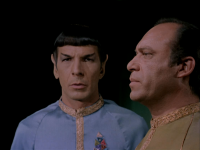
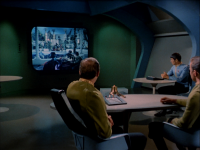
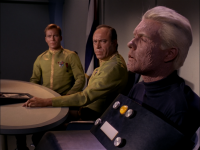
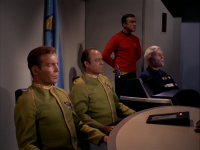
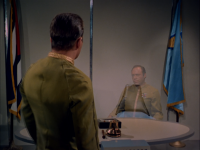
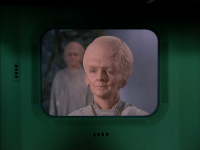
Star Trek TOS - 1x12 - The Menagerie, Part II
Originally Aired: 1966-11-24
Synopsis:
Spock hijacks the Enterprise to return an injured Captain Pike to Talos IV. [Blu-ray] [DVD]
Filler Quotient:
2, filler, but an enjoyable episode nevertheless. You can skip this one, but you'd miss out on some fun.
- Neither the first, nor the second part of The Menagerie is essential viewing if you're trying to plow through only Star Trek's essential exposition and stand-out classics, but it's definitely among the better episodes. If you do decide to watch The Menagerie, I recommend skipping The Cage unless you're willing to put up with the clip show to get the additional texture.
Problems
- This episode unfortunately inherits many continuity errors due to reusing material from The Cage. See my review of The Cage for a complete list of them.
Factoids
- This episode (both parts) won the 1967 Hugo Award for Best Dramatic Presentation.
Remarkable Scenes
- The revelation that the commodore was an illusion.
- The Talosians welcoming Pike back to their world.
My Review
The pacing of part two crashes hard. Even if you opted out of seeing The Cage prior to watching The Menagerie, the plot still seems to spend a conspicuous amount of time making excuses to put as much of Pike's flashback experiences with the Talosians on screen as possible. At one point Spock is even asked why he doesn't just explain to the court what he's trying to demonstrate and his absurd response was that they wouldn't believe him if he simply explained it, so he has to show it instead. The court then proceeds to make a unanimous vote finding Spock guilty, a redundant action seeing as how he already entered a plea of guilty in part one, at which point despite having both admitted his guilt and having been found guilty by the panel of judges, Spock astonishingly continues to be allowed to present testimony.
All of this nonsense gets justified at the end by the rather meager excuse that Spock and the Talosians were working together to create delays, including the illusion of the commodore's presence aboard the ship, so that Kirk would not attempt to regain control of the ship in time for it to arrive at Talos IV. Using the Talosians' power of illusions to misdirect Kirk was a reasonably good idea for a plot point, but hinging the entire second part of the episode on misdirecting the audience as much as Kirk (annoying the audience in the process) all so the episode could get away with having as little plot as possible was pretty weak.
What's worse is we learn that the whole reason why Talos IV is a forbidden world is because the government bought into the Talosians' absurd fear that establishing some kind of normal trade relations would result in their power of illusions spreading, destroying others as they've destroyed themselves. This fear is a shoddy justification for barring any travel to or communication with Talos IV and an even worse justification for enforcing such a nonsensical law by enacting the death penalty. I was hoping for some new exposition that might at least attempt to give some rational reason for the existence of such a draconian law, but the episode didn't even really bother. What points I grant this episode are mostly riding on the well executed dramatic premise and potential of part one, which part two satisfactorily concluded, but largely failed to do justice to.
The following are comments submitted by my readers.
- From jaylong on 2007-10-09 at 4:12am:
not really a review. but for people who stumble upon this, how do you guys feel about these two episodes being chosen to be remastered and released into the theatre?
i really think they could have chosen a better two episodes, but i'm down.
here's the info if you've been under a rock;
http://www.fathomevents.com//details.aspx?eventid=685
"An in-theatre exclusive greeting from creator Gene Roddenberry’s son, Eugene “Rod” Roddenberry is included, as well as a behind-the-scenes look at how the episodes were digitally re-mastered from the original negatives – including the reinvention of the old TV show special effects using new CGI animation, and the orchestral re-recording of the show’s theme music."
Nice, new CG? I hope Jar Jar isn't in it... - From Orion Pimpdaddy on 2007-10-12 at 2:55pm:
Yeah, I can't wait to see this episode in the theatre. I kind of wish they would show a couple of other epidoes instead, but this episode is still classic. - From rhea on 2008-04-27 at 5:37pm:
Not a full review, just two additions to yours, which I agree with, especially when it comes to the blatant absurdities. Overall, I still enjoyed the episode very much for the thorough character portraits it gave us.
- an additonal problem: I do not understand how Spock could get off the hook this easily. This is a military organisation, and insubordination is a major crime, whatever the reason. Now, if a commanding officer is unable to perform his duty, then mutiny should of course be accepted, but compassion is usually not a reason for the military to spare someone a court martial and/or punish them. Not credible, now way.
- an additional highlight: Kirk. This is one of the very very few times we see Kirk in full military commander mode: calm, cool, deadly, convicting a friend to death because this is what his duty demands of him. Usually, he is all buddy with his crew and very angry/emotional or con-manish with his enemies, but hardly ever the hardass officer who can send a man to his death if he has to. Now we know why he got command of a vessel with 400+ crewmembers. It's powerful, and very well acted out by Shatner. - From CAlexander on 2011-04-15 at 6:04pm:
I love the Cage, but to the extent that the Menagerie is considered separately from the Cage, I am not fond of it. I find it to be a rather forced framing device to re-show the Cage. Everything about the trial is artificial. In particular, the concept that Spock risks the only remaining death penalty on the books is just ridiculous, a totally unnecessary attempt to pump up the drama. Really, Spock risking his career would be quite bad enough. - From menagerie on 2011-08-21 at 7:25pm:
I agree that the second part largely lacked plot or original exposition, and at times made me feel as if I was re-watching "The Cage." But I disagree that any of it is very absurd or particularly annoying.
I don't think it's fair to criticize the episode for "misdirecting" the audience. Something like 25 - 50% of all of Star Trek seems to be "misdirection" - arguably, that's the best part. In any case, it's almost universally used towards good dramatic effect, and this episode really isn't any different.
First of, the trial and it's semi-absurdity is explained quite well by the context and the Talosian involvement, including of course the fabricated commodore. And Kirk was going along with it and glossing over its absurdity because he was captivated by the story and wanted to know the truth.
There's some question about whether it was necessary in the first place, but to give the show credit, Kirk asks that question outright! And it does make a certain amount of sense. Would Kirk otherwise disobey Starfleet orders, risk court martial (and even execution), to assist Spock in helping Pike? Someone he deeply respects, for sure, but has almost no personal history with? To clinch the whole matter, we have to remember that Pike was initially opposed to the whole thing! The trial and the recap was as much to convince Pike as to convince Kirk as to convince us, the audience. In my eyes, it makes sense, and is done well (although I do agree that the sheer amount of reused footage starts to feel a bit contrived and was perhaps a bit much).
So we are left with the final criticism. Why the travel and communication ban? Why enforce it with the death penalty? I think it makes sense if you consider it. There's more than just the face-value reasons, the threat of Humanity developing "the power of illusion" and meeting the same fate as the Talosians.
Consider also the sheer power represented by the Talosians. A handful of these folks (perhaps even one) took complete control of a Starfleet flagship, and outmaneuvered its entire crew, its first officer, and its captain. Even at the very end, after Pike escaped from his menagerie, he had no way to get back onto the ship. They were completely at the mercy of the Talosians - the only card they had to play was committing suicide.
It's safe to guess that this is the most powerful species Starfleet has ever encountered. Sure they proved "too intelligent to kill for no reason," and quite reasonable and benevolent even, but wouldn't it be prudent to stay clear of something so completely out of your league? Especially when they have a history of treating humans as we treat "lower" animals? And even if they were benevolent, what if some renegade captain, or crazed scientist, or even a random stowaway or something learned how to replicate their powers? The threat would potentially be worse than a WMD going on the black market.
Compound all that with the one explicitly suggested reason, the hypothetical danger of "the Keeper's" prophecy - that we would all become as helpless and on the verge of extinction as they - and the draconian ban begins to make some sense.
Facing something of nearly limitless power, something they could not even begin to understand or control, in the hands of mysterious beings on a mysterious planet, fleet command decided to, for the time being, just strike the whole matter from the record, classify the whole thing - so no one gets either too freaked out or too curious - delete Talos from the map, and forbid all contact. It shows prudence, and it makes some sense.
So, in conclusion, I think this two-parter is fantastic - I concur with the reviewers compliments, and even disagree with some of his critiques. - From Wiley Hyena on 2012-05-12 at 4:38pm:
This is one of the site's most inaccurate review ratings. Menagerie II is one of the best, if not the best, episodes in all of Star Trek. The reunion of Pike and the girl, beginning with Pike's wish to go, is great drama. - From Schreck on 2013-05-23 at 10:17pm:
I did not like the second part nearly as much as the first…it could have something to do with the constant rehashing of The Cage…I give it a 6.25 and my brother a 7…Our average ratings for the two parts are a 6.63 for myself and a 6.75 for my brother - From Stewart Snider on 2019-03-05 at 11:11pm:
I was around when this aired in 1966. At age 12, I was puzzled where the old footage came from. It wasn't public knowledge then that The Cage was the original passed-on pilot, so I just assumed they shot it for this episode. This didn't look like a 13-years-older Enterprise and it didn't make sense for Spock to be emotional. These, along with all the other plot problems mentioned here still did not keep me from being mesmerized by the other-worldliness of this episode. Kirk's final look at the Talosian Keeper conveyed how I felt.
One thing I haven't seen mentioned here: I think the actors knew there were huge problems with most of the stories, and just took it on themselves to make their performances so good that viewers would want to watch anyway. I'm in awe of them, for this reason. Even though I think Shatner is a narcissistic ass.

Star Trek TNG - 6x07 - Rascals
Originally Aired: 1992-11-2
Synopsis:
Several crew members are turned into children. [DVD]
Problems
- The science behind this episode is horrible. How did the transporter shrink their clothes? What happened to Picard's artificial heart? And how did the transporter unshrink everyone's clothes when they went back through?
Factoids
- Guinan's father is over 700 years old.
- The writers ended the episode without showing Ro revert back to adulthood because they considered leaving her that way permanently.
Remarkable Scenes
- The actors for the child versions of the characters were pretty good selections.
- Picard trying to ignore the limitations of his new form.
- O'Brien's reaction to Keiko.
- Troi: "You could return to the acadamy, take another degree, brush up on your Latin." Picard: "And be Wesly Crusher's room mate?"
- Troi: "A second childhood. Without the pain of growing up again."
- Guinan picking on Ro.
- Guinan's proposed solution to the takeover.
- The child's computer.
- Picard freaking out at the Ferengi about seeing his "father" Riker
- Picard pretending to be Riker's son.
- Riker bullshitting technobabble.
- The children "tagging" the Ferengi.
My Review
The Ferengi conquering the Enterprise so easily seemed a little absurd. And why did the Ferengi even bother trying to unlock the computer? They could have just tractored the ship to Romulan space. I'm sure the Romulans would have been more interested and more able to crack the computer lockout... This episode suffers greatly from both logical and technical problems. Forgiving them briefly, this episode bears great humor. It's great fun watching the crew as children and how they're treated by the rest of the cast. It's also great fun watching the children outsmart the Ferengi. Besides the humor, the idea that they could live to be twice the age of normal people was also intriguing, but disappointing that in the end no one decided to remain a child; not even Ro who would have been perfectly suited for that role. A fine idea for an episode, but very poorly executed.
The following are comments submitted by my readers.
- From Pete Miller on 2006-05-07 at 3:03am:
I agree. How did two klingon birds of prey disable the enterprise immediately and then proceed to board it and commandeer it so easily? That was ridiculous. I hate the ferengi so much. - From DSOmo on 2007-10-12 at 7:58am:
- Once again, the creators use the "just switch the DNA with the transporter so everything will be ok" plot trick to fix the problem of changing the crew back to adults. At least the creators are consistent. This is basically the same solution they used to resolve a crisis in "Unnatural Selection." (see "Unnatural Selection" Fan Commentary for more information on this subject.)
- When asked by the Ferengi captain how many people are on board the Enterprise, Riker replies, "One thousand fourteen" (1,014). During the episode "Remember Me," Data claims there are 1,014 people on the Enterprise at that point. What are the chances - given transfers, promotions, childbirth, etc. - that there would be exactly the same number aboard the Enterprise during both these shows?
- Worf needs to get back to the phaser practice range. When two Ferengi materialize on the bridge, Worf fires a shot and misses! The Ferengi can't be more than twenty feet away, and the chief of Security of the Enterprise misses?
- When Picard first attempts to access the main computer from a school terminal, the top of the screen reads, "Classroom 7." When Picard meets with Riker, he asks Riker to turn on the computer in "schoolroom 8." - From djb on 2008-05-27 at 8:29am:
This episode was fun, though it brings up two rather sticky subjects (aside from obvious ones, like, how their clothes shrunk and Picard magically had hair).
One is how easily the Enterprise, the flagship of the Federation, was captured. By those god-awful Ferengi, no less. I mean, it's certainly possible for the ship to be captured, but I'd expect it to maybe be a bit more of a struggle. It was a cakewalk! And, wouldn't there be security measures, like some kind of automatic lockdown if the shields fail? Or something? I mean, come on. It could have been epic.
The other is the "age reversal" problem, which was also an issue in "Unnatural Selection." If a transporter can accidentally convert adults into children, couldn't it be configured to do it intentionally? Wouldn't that basically make the transporter an immortality machine? Wouldn't that mean that anyone, once their bodies have aged past 50 or 60, or whenever, could just enter the transporter, be reverted to children (with adult minds) and live another several decades with a younger body, and repeat ad infinitum? Maybe it could be configured to revert someone to, say, 29, instead of 12, and then people could go in for an "age-reverting" every 5 or 10 years without going all the way back to 12? The social, economic, and medical ramifications are ludicrous. Talk about messing with nature!
I thought the casting of young Guinan and young Ro were excellent; it happens that the actress who played young Guinan also played a young version of the character Whoopi Goldberg played in "Sister Act." Keiko didn't really look like herself, but it's hard to tell with aging. Also notice that young Picard's accent is just slightly different from regular Picard's? Hmmm.
Some episodes, though, have "priceless" moments that are somewhat incidental but memorable. "Schisms" had Data's poetry, which was genius. This one's priceless moment is Riker feeding the Ferengi complete nonsense about the computer. Bilateral kelilactirals... Heisenfram terminals! Wonderful touch. - From JRPoole on 2008-09-11 at 4:08am:
Ughh. This is perhaps the most ridiculous episode of the Next Generation. The O'Brien/Keiko stuff was creepy and interesting, but Colm Meany didn't act it very well, probably because the plot was dumb he couldn't take it seriously.
On top of all this idiotic mess with the children, we have another incredibly stupid Ferengi episode. The Ferengi are the Jar Jar Binks of TNG and an embarrassing black eye on the series. They become more believable in DS9, but here they are always bad news. It's already been documented that children are a bad idea on Trek, and the combination of the two here is dreadful.
Thank God the writers didn't go ahead and make this episode inarguably canonical by leaving Ro as a child. Therefore, I move that this episode be struck from the canon, as nothing significant arises from it, it's thankfully never mentioned again, the science is ludicrous, and the whole package is utter shite. - From The Crytter on 2009-06-07 at 2:50pm:
A hugely fun episode. I enjoyed it but for a few niggling details.....
1) A case of mistaken identity:
The Klingon Bird's of Prey are identified as "B'rel" class.
The B'rel class Bird of Prey is well known to be a scout vessel, approximately 90 meters long and 130 metres wide. Whats more, the B'rel class has only a crew of 12, and could not carry very many troops in addition.
The Birds of Prey that attack the Enterprise are clearly at least as wide as the Enterprise herself (467 metres). And they can cleary carry enough troops between them to overwhelm to Enterprise crew. These vessels are clearly of the "K'Vort" class cruiser variant of the Bird of Prey!
2) Has Commander Riker become a wimp???
2 vs 1 or not, the supposedly state-of-the-art Galaxy class Flagship-of-the-federation USS Enterprise goes down with barely a whimper! It fires just one shot in retaliation. Absolutely pathetic! Commander Riker is usually fairly gung-ho, and pretty handy in a fight. But here he simply lets the Enterprise take several minutes of pummeling before he orders Mr Worf to return fire, and even then with only a single phaser burst! With his hesitation and poor response to the attack, he basically gifts the Enterprise to the Ferengi!
Commander Riker should have ordered Mr Worf to return fire as soon as they were attacked, and then concentrated fire on one of the Birds of Prey. The Enterprise is powerful enough to disable a K'Vort class cruiser in fairly short order with sustained fire, and once one was out of action the Ferengi crew of the other would no doubt have decided that discretion was the better part of valour, and retreated.
So in short, the Enterprise seriously needs it's ship recognition files updating, and should have won the fight with it's attackers. This, of course, means that this whole episode should never have taken place.
A shame really, considering the episode as a whole is such good fun! Enough fun, that i'll forgive the writers for the irritating errors. - From rpeh on 2010-06-14 at 10:33pm:
You lot take this far too seriously.
Yes, the science is rubbish. Yes, the ship was taken over too easily. Yes, there are other problems.
But this episode is fun! The young versions do a brilliant job, young Guinan especially, and as long as you watch it all when you're in a good mood, it's a funny episode.
Sheesh! Some people would even take Trouble with Tribbles seriously! - From baron on 2010-12-03 at 6:30pm:
Riker didn't attack the ships because they were klingon ships. He didn't raised the shields because he would have had no reason to and that would be seen as a hostile gesture. He had no way of knowing that they were ferengi. He would have at least tried to hail them before he started firing. He wouldn't want to risk starting a war by firing at them first for no reason. Unfortunately, they had already attacked and disabled the enterprises sheilds at that point. - From Quando on 2011-08-25 at 12:40am:
The absolute best part of this episode was when the Ferengi caught little kid Picard calling Riker "Number One". The Ferengi looks at kid Picard kind of funny, and Picard quickly says "he's my number one Dad!" and gives Riker a big hug. My kids laughed about this for days.
Also, what happened to the rest of the 1,014 people on the ship? The only people to try to do anything to stop the Ferengi are the people on the bridge and some little kids. Meanwhile several hundred fully-trained starfleet officers are sitting quietly somewhere twiddling their thumbs. - From Wes on 2012-03-22 at 1:27pm:
This marks the last episode the O'briens are on TNG. The next time we see Chief O'brien is on DS9 in Emissary. - From railohio on 2014-07-22 at 2:33am:
Overall I found the episode enjoyable, however there is one continueing point involving the Ferengi that I need to meet
The bridge crew spends so much time spilling out statuses and sensor readings during the battle, that they only manage to actually fire once. Once!! If they really wanted to win, they would disable the enemy as quickly as possible (or at least try to) and worry about the damages and casualties after. They would avoid even more casualties in the process.
Another thing I found a bit funny actually was during the shuttle mishap. While the shuttle is experiencing "turbulance," the shuttle does not seem to move at all, and it appears they are just dancing in there chairs. Quite entertaining if you catch it - From Mike on 2017-04-17 at 3:19am:
Whatever you think of this episode, you have to agree that the kid actors really nailed their performances. All four of them were great! Their scenes were the best parts of this episode: Guinan and Ro's interaction, The O'Briens' awkward time together, and young Picard's dealings with the crew.
As for the Ferengi taking over the ship, I think this episode is mostly just for laughs. After all, whatever cunning the Ferengi may have had in their initial capture of the Enterprise was clearly used up and the crew was able to outsmart them with comical ease. You just can't take the Ferengi seriously in TNG, and the idea of involving them in an episode where some crew members are transformed into children seems to fit nicely.
From a canon point of view, I can see why this episode pisses off some fans. Maybe we can just agree that this was a facepalm moment for Worf and his security team, after which they ran numerous drills to make sure they'd never be humiliated by losing the flagship to a gang of Ferengi ever again. - From Chris on 2018-02-17 at 4:06am:
Without looking at the episode... whatever... more stupid than Kirk and the boys getting old!
Please!!! - From Chris on 2018-02-23 at 10:21pm:
I must've been in a foul mood when I posted my irritation of this episode without watching it.
Sometimes I just forget that this is, after all, not science, but science-FICTION!
If one cannot tolerate a bit of whimsy now and then, then one needs to re-adjust their attitude maybe...
Anyway, I did notice that they did make a half-assed attempt with the costuming on Ro and Guinan only...
Riker's gibberish was awesome but it would have been funny if somehow he could have squeezed in, as a shout out to Kirk, something about Fizzbin! ;-)
The interaction between Keiko and Miles was pretty poignant, I think. - From Chris on 2019-08-01 at 1:54am:
One last... comment. I think it might have been cool if Keiko's daughter recognized her for who she was regardless of how she looked! Miles would have freaked out and there would have been much less drama between them but the drama could then have been taken in ANY direction from there!
Could've been more fun?
Is it fun, funner, funnest?
Is it dead, deader, deadest?
These are questions that torment me...

Originally Aired: 1995-11-6
Synopsis:
Chakotay is stranded on a planet. [DVD]
Problems
None
Factoids
- Captain Sulu supported Chakotay's entrance into Starfleet.
Remarkable Scenes
- The Doctor listing the descriptive words for pain.
- Chakotay and Janeway discussing the absurdity of religion.
- The Doctor sneezing.
- Neelix and Tuvok have something in common. They breed orchids. :)
- The Doctor at the height of his symptoms.
- Paris: "The ship might make it with no inertial dampeners, but we'd all just be stains on the back wall."
My Review
What the crap? Another alien species, from the Delta quadrant no less, has visited Earth many years ago. How many does that make now? How much of a cliche has this become by now? Seriously, what is so interesting about Earth? Well, I at least found Chakotay's flashbacks interesting. Another interesting detail is Janeway's affinity for ship landings. This is her second attempt at landing the ship, she suggested doing it in another episode before this one, totaling three episodes that involve at least a mention of a ship landing. I enjoyed the Doctor's sickness too, but really the most enjoyable things about this episode were the sub plots and not the main plot. An exploration of Chakotay's Native American heritage is cool, but not when it's done with cliche++.
The following are comments submitted by my readers.
- From Pete Miller on 2006-08-02 at 6:36pm:
Janeaway is a fucking idiot for wanting to land the ship. Let's see, how many times did the enterprise land? Oh! 1 time, when it was destroyed. She's already going for a second attempt in one season. It was completely unneccesary and a complete lack of judgement on her part. Putting the ENTIRE crew at risk to maybe land and help Chakotay. Why didn't they just replicate another shuttlecraft ;) They did it so many times in the series, seeing as they started out with 2.
But yeah, Janeaway is a stupid dumbass. I put the ship landing thing in the same category as Sisko using the Defiant every time he wanted to leave the station. Completely unneccesary. - From Remco on 2009-01-14 at 11:33pm:
When Kes was pissed at the Doctor and said she wished that the he could feel pain for once, I said to myself: "well, he has, in Projections". It's a waste that he didn't mention this. It was only 6 episodes (weeks?) ago. - From Penguinphysics on 2013-01-17 at 5:46am:
I realize that this is a really small nitpick, but the use of the word DAMPENERS is not correct. When the inertial momentum of the vessel is compensated for, this is DAMPING, which is an absorption of energy (usually in relation to oscillations). A DAMPENER would be something like a shower or hose. A seriously insignificant nit to pick but since the technical advisors work so hard on other things it would seem that they could keep this consistent. - From Inga on 2013-07-30 at 9:54am:
Pete Miller - Voyager is a new kind of ship, maybe it's easier and safer to land it, so the decision is not necessarily stupid. - From Azalea Jane on 2024-01-25 at 8:53pm:
Yeah, this ep was... kind of WTF. It's especially cringe if you know about how the supposedly Native American consultant they had for Voyager was a phony. But cultural insensitivity aside, it's kind of astonishing to imagine that a bunch of extremely Earth-specific things would be localized to this tiny region of the other side of the galaxy. Well... maybe not "a bunch", but between this and "The 37s", it's really pushing, even for Star Trek.
One little detail I liked was how without his communicator, Chakotay couldn't understand the aliens until they gave him their own UT. Kes adding a couple hours to the Doctor's illness program was fantastic. I love Kes.
This show has a lot of potential, and a lot of great moments so far, but it so badly wants to be TNG that it isn't finding an identity of its own.
Voyager is designed with landing capability, so the previous commenter's complaints about it landing are invalid. (What IS a valid complaint is how imbalanced it looks when it's on the ground, like it's about to tip over.)

Star Trek Voy - 6x09 - The Voyager Conspiracy
Originally Aired: 1999-11-24
Synopsis:
Seven suspects there is a conspiracy. [DVD]
Problems
- It's kind of annoying that there's a "nearby Talaxian outpost" this far away from Talaxian space.
Factoids
- Thanks to the catapult in this episode, Voyager has shaved about 3 years off their journey. This means Voyager has traveled the equivalent of about 51 years since it began its journey. (10 years [Voy: The Gift] + 5 years [Voy: Year of Hell] + 2 years [Voy: Night, rounded down] + 1 year [Voy: Hope and Fear, rounded up] + 10 years [Voy: Timeless] + 15 years [Voy: Dark Frontier] + 3 years [Voy: The Voyager Conspiracy] + 5 seasons of conventional warp = 51 years.)
Remarkable Scenes
- Seven of Nine's complex web of reasoning for how she discovered the parasites Neelix accidentally brought aboard.
- Voyager stumbling on the space catapult.
- Tash regarding his catapult: "Catapult a vessel across space, in the time it takes to say 'catapult a vessel across space.'"
- Seven of Nine speculating that a tractor beam recovered one of the reactors on the Caretaker's array.
- Seven of Nine outlining her conspiracy theory to Chakotay.
- Seven of Nine outlining her new conspiracy theory to Janeway.
- Seven of Nine accosting Naomi.
- Janeway and Chakotay confronting each other with (perhaps not so) subtle innuendo.
- Chakotay: "You didn't poison the coffee did you?" Janeway: "Not any more than I usually do."
My Review
This episode is both annoying and wonderfully hilarious at the same time. Seven of Nine's conspiracy theories reminded me of clinically paranoid people who have nothing to do but study the intricacies of world politics all day so that they can invent government conspiracies. A nice tip of the hat there. But Seven's behavior was hardly rational. It seemed pretty clear early on that Seven's theories were bogus, so it was kind of annoying but also somewhat funny watching as she managed to convince both Chakotay and Janeway of conflicting theories. Kind of reminded me of a sleazy car salesman. While Seven's actions made the plot kind of exciting, I think Voyager's cooperation with Tash is the remarkable part about the episode. Tash's catapult reminds me a lot of Babylon 5's hyperspace gate. A small deficiency, why didn't Voyager get the schematics of this catapult? They could have attempted to build another one; and even if they failed they could at least transmit the schematics to Starfleet so that the Federation could build some and send some to Voyager in sequence. Oh well.
The following are comments submitted by my readers.
- From Pete Miller on 2007-01-02 at 9:05pm:
This episode kind of reminded me of DS9: Whispers. The convincing conspiracy theories demonstrates how evidence can be arranged to support all kinds of wild theories, and that correlation does not necessarily mean causation. It also makes fun of a lot of current conspiracy theories that violate Occam's Razor to a ridiculous extent. - From Thoms on 2008-03-12 at 12:57pm:
I like Voyager, but why don't they wear more casual clothes when the eat, have dinner or are in own quarters. Like Riker on TNG or Sisko. - From a2a.com on 2011-12-27 at 5:34am:
You know, I think it takes a current or former conspiracy theorist to fully appreciate this episode. I think it did quite a spectacular job and has several important lessons, among them: good and plentiful data does not necessarily mean good information, and even good information does not always translate to actionable knowledge. Our brains loathe chaos, yet the natural and socio-political world is inherently chaotic. Its easy for us to find patterns where none exist. And find solutions and false answers to questions that may ultimately be too complex or bizarre to even begin to answer.
I love how at the end we're left wondering...What *was* that 'tracking beam' that Seven found? Some kind of astrometric lab artifact? Or something more bizarre? - From Rick on 2013-04-09 at 4:09am:
This episode is awful and an abomination of logical reasoning.
I went to the grocery store today. Was I picking up food to eat, or establishing channels to monopolize the local food supply to gain power?
Simply adding or and then a random conclusion to explain simple behavior is shown in this episode to be compelling reasoning. After all, it pretty much convinced the top two officers. - From OmicronThetaDeltaPhi on 2014-01-23 at 9:39pm:
One amusing nitpick: When Janeway tried to regain Seven's trust, she said "Stardate 52840 - the captain orders Seven to study her parent's journals...". Clearly the writers mixed up the events of "11:59" and "Dark Frontier".
I suppose we could argue that it was Janeway who made the error, but there is no way Seven - in full-paranoid-mode - would have trusted her after such an inconsistency.
And to Rick:
The fact that you deny your quest of world domination, is evidence enough that these suspicions are true ;-) - From Mike on 2017-06-15 at 11:20pm:
I did like Tash's catapult, and the episode was intriguing until Seven went all tinfoil hat and laid out wildly speculative theories to both Chakotay and Janeway, apparently within mere hours of each other.
Lost in all that, though, was one question: what was that tractor beam in the middle of the explosion of the Caretaker Array? That's never sufficiently answered. It's never even made clear that it's the same technology that eventually wound up with Tash. You could assume something survived the explosion and he eventually got his hands on it, but that doesn't make clear what the tractor beam was. Kind of an unsolved mystery of the episode, I guess. - From The Emergency Obumpresidential Hologram on 2022-03-02 at 8:39am:
This episode could have been good, but I agree with Rick, Sevens reasoning was random, she badly needs logic lessons from Tuvok.
And even worse that Janeway and Chucky immediately fall for it and betray each other to the point they start wearing weapons!
Add to all of it that Sevens information was at times flat out wrong, like when she talked about the Chakotay-Seska child plot, which wasnt even his child in the end.

Star Trek Voy - 7x18 - Human Error
Originally Aired: 2001-3-7
Synopsis:
Seven experiences more emotions. [DVD]
Problems
None
Factoids
- The teaser of this episode is the shortest ever on Voyager at only 43 seconds long.
Remarkable Scenes
- Seven's opening piano performance.
- The doctor: "Rock-a-bye baby, in the spacedock. When the core blows, the shuttle will rock. When the hull breaks, the shuttle will fall. And down will come baby, shuttle and all."
- Seven discussing hairstyles with Torres...
- Seven: "Slice these vegetables transversely in five millimeter increments."
- The metronome scene.
- Seven's medical emergency and the doctor stumbling on her fantasy.
- Seven disarming the alien weapon.
My Review
Great continuity with Voy: Unimatrix Zero. I was wondering if they'd pick up on Seven's behavioral changes whilst within Unimatrix Zero and thankfully they did. Unfortunately this episode ends with the biggest anticlimax in Voyager history for which I subtract points. I couldn't believe the way the episode just ended well before it began. I was totally enthralled in the story of Seven of Nine finally becoming truly human, jumping over that last hurdle to humanity. But instead of letting the doctor treat her and instead of picking up on the real Chakotay's advances, she dismisses them both right out of hand so she could remain a workaholic. How sad. This episode parallels TNG: Lessons in that it features some more extremely beautiful piano music. I'll never forget the Moonlight Sonata scene in the Jeffries Tubes in that episode. Likewise I'll never forget the metronome scene between Seven and holographic Chakotay here. With only eight episodes left, the plot thread left wide open in this episode is at the top of my list for loose threads to resolve. Never end a story this way!
The following are comments submitted by my readers.
- From JemHadar359 on 2008-04-08 at 3:55am:
I'm not sure off the top of my head, but wasn't the teaser for "Scorpion Part I" shorter? - From Nicholas on 2009-01-18 at 1:21am:
I found one thing puzzling.
Apparently Seven has this Borg implant that causes her to shut down whenever she is about to experience higher emotions. As this has never been noticed before, is the breakup with her holographic toyboy more emotional for her than ANYTHING she has experienced over the last three and a half years, including Icheb nearly sacrificing himself for her, One, John Kelly, all her mother-daughter moments with Janeway, memories of her parents and so forth? - From g@g on 2012-01-28 at 8:58am:
You know what, this episode rocked. Somehow I didn't feel totally let down by the "anticlimax." The episode is called "Human Error," afterall. All things cannot end well, and people can't always make the right courageous, well-balanced decisions. Human beings, even ex-borg, don't progress linearly - there are a lot of steps backward, and the end is rarely certain or even clear.
Anyway, I'm rambling, but I second the reviewer about the most memorable piano scene and the other good qualities, and disagree about the ending being thoroughly lousy (especially in hindsight, having scene where this all leads in the season finale). - From Dstyle on 2015-08-07 at 8:41pm:
I agree with the previous comment: to consider the ending to be a disappointing "anti-climax" misses the point of the ending. It's easy to take emotional risks when you have nothing on the line; it is far more human to be nervous and guarded in real life. We saw this once already in this episode, when Seven socialized and gave a toast at the holographic baby shower, yet made a weak excuse to miss the real one.
I found the ending to be highly relatable: how many times, as a young teenager dealing with new and confusing emotions, did I imagine scenarios where I would approach my love interest boldly and confidently, only to waver in real life and avoid the encounter entirely? I imagine anyone who was a teenager had similar experiences. This is Seven's middle school dance, except she's at the dance with adults who all already know how to navigate these types of situations. - From McCoy on 2017-11-10 at 8:52am:
It wasn't anti-climax. It was true and totally in-character for Seven (in time she became my favourite character). I have a social phobia diagnosed and I know, what I'm talking. This episode was about me and all people suffering similar problems. "Happy end" would be out of place here. - From Lloyd on 2017-12-31 at 4:26pm:
I agree with the anti climax was horrendous.. but i still loved this episode..!
I really have no idea why the writers decided to do that - not further this storyline.
Some storylines benefit from leaving it open ended - the desire to see more are what make some epsiodes great. But not this one! Being left wanting more is infuriating and completely unsatisfying. - From Graham Bessellieu on 2019-09-08 at 3:12am:
This is an excellent and essential episode for Seven of Nine's character development! The romance with Chakotay is captivating and endearing.
While I agree that it leaves the viewer hoping for her to break through that final barrier, perhaps it just goes to show how difficult it is to break the habits of her programming.

Star Trek Voy - 5x05 - Once Upon a Time
Originally Aired: 1998-11-11
Synopsis:
Neelix comforts a little girl whose mother is missing. [DVD]
Problems
None
Factoids
None
Remarkable Scenes
- Naomi: "Neelix, don't move." Neelix: "What's wrong?" Naomi: "The Borg lady." Neelix: "She has a name, you know." Naomi: "Seven of Nine, Tertiary Adjunct of Unimatrix 01. Don't look! She'll assimilate you." Neelix: "Naomi, Seven is a nice person. And she's a valuable member of this crew." Naomi: "I don't want to be in her Collective." Neelix: "I don't think there's much danger of that."
- Naomi: "The doctor talks too much."
- Janeway regarding coffee: "One more cup and I'll jump to warp."
My Review
There's nothing particularly wrong with this episode other than it's boring. The whole episode is an excuse to do something with the Naomi character, which is good in a way, as she's been neglected somewhat, but the way in which it was done was quite annoying. Shuttle crash episodes are a huge cliche, and putting Samantha Wildman in danger just so the writers could write a story around Naomi Wildman was kind of cheap. Getting to see elements of Naomi's daily life however was interesting, as it gives us a chance to see what life in the 24th century would be like for a child. We've had bits of this from TNG and DS9, but this episode is probably the best depiction yet. Still though, the writers have proven that they can write a decent story around children in TNG: Disaster, among others, and I would have expected better here.
The following are comments submitted by my readers.
- From Pete Miller on 2006-11-06 at 2:49am:
That holodeck program is the most inane thing I have ever seen. Naomi seems way too old to be entertained by such nonsense, and I frankly felt insulted being subjected to watching it. I kept jumping every time it came on in case my roommate was about to come in. - From Vincent on 2011-10-05 at 11:25pm:
I find it odd that the shuttle crew were running out of air on an M class planet. The away teams sent out to rescue them were able to breathe the atmosphere without aid, so why couldn't the Paris or Tuvok find a way to ventilate air between the interior and exterior of the of the shuttle?
Placing the manufactured danger to the shuttle crew aside, I thought this was an enjoyable exploration of the way different people prepare for their own death (the shuttle crew), handle the death of family (Neelix), and the ethics of censuring the truth from a child. - From Jadzia Guinan Smith on 2015-06-15 at 5:27pm:
Wait, they had Holographic entertainment when Janeway was a kid? She's in her early-mid 40s in the 2370s, which means this stuff had to be around in the 2340s. But wasn’t it established, in TNG: Encounter at Farpoint, that this was brand new technology during that time (circa 2360s)? I seem to recall Riker seeing the newfangled programs (which he had vaguely heard about) for the first time when he came aboard the Enterprise. Anyway, totally boring episode, aside from Naomi expressing her fear of the “Borg Lady” and trying to fake out Neelix with “I am borg”.... - From Dstyle on 2015-06-20 at 3:52pm:
I actually really liked this episode a lot. Perhaps it's because I lost a close family member when I was young and just became a father myself, but I got a bit misty several times while watching this.

Star Trek Ent - 1x18 - Rogue Planet
Originally Aired: 2002-3-20
Synopsis:
While exploring an uncharted planet, Enterprise crew members encounter a group of aliens who are hunting down indigenous creatures for recreation. [DVD]
Problems
None
Factoids
- Hunting went out of style on Earth over 100 years ago according to Archer.
Remarkable Scenes
- Archer: "Do Vulcan captains have their portraits hanging at the high command?" T'Pol: "Vulcans are revered for their accomplishments, not for the way they look." Tucker: "Except for the really important ones who get mummified."
- Reed: "Follow me." Archer: "Why don't you let me play captain for a while, Malcolm?"
- T'Pol to Archer: "With respect, captain, I wonder if you would be so determined to find this apparition if it were a scantily clad man?"
My Review
A painfully slow plot. This episode has the honor of being the first Star Trek episode I've ever fallen asleep to during my first viewing. It probably has a lot to do with the fact that the setting is so dark and that very little actually happens. I was also disappointed that this episode was so much of a rehash. We've seen too many shape shifters before. Hell, we've even seen shape shifters living on a rogue planet before, when Sisko first visited the Founders' homeworld! We've also been told in DS9: Treachery, Faith, and the Great River that the Founders were hunted. So, let's recap. Founders: 1. live on a rogue planet, 2. are shape shifters, 3. are hunted. The aliens of this episode: 1. live on a rogue planet, 2. are shape shifters, 3. are hunted. Throw in the fact that the hunters in this episode have a similar moral structure to the Hirogen, and the rehash-o-meter starts going through the roof! Ranting of rehashes aside, I thought the episode was morally correct. I found the whole hunt as distasteful as the crew of Enterprise and I was glad they found a way to sabotage the hunt without actually attacking the hunters directly. It was a clever solution.
The following are comments submitted by my readers.
- From Zorak on 2016-09-22 at 10:31pm:
I have to disagree about the morality of Archers actions. First off, the hunters were very good to them and Archer could have easily gotten them killed with his actions. Second, he never even tried to reason with the hunters or explain his position. He just up and decided these people and their cultural practices are evil and wrong and going behind their backs and sabotaging them was the only answer.
Sloppy writing and another poorly done morality play in my opinion.

Star Trek TNG - 7x01 - Descent, Part II
Originally Aired: 1993-9-20
Synopsis:
Picard, Troi and Geordi are held prisoner by Data. [DVD]
Problems
- It seems unlikely that Hugh's individuality could have caused so much chaos in the collective and that a whole ship of Borg would just somehow all become individuals. It makes sense that the Borg would have severed the renegade Borg from the collective though. We can rationalize this by saying the whole thing was some kind of fluke. But it's a stretch.
Factoids
- This is the last Lore episode.
Remarkable Scenes
- Crusher in command of the Enterprise.
- Data trying to be funny amidst the torture.
- Beverly executing her tricky warp speed exit to get people off the planet.
- Beverly using metaphasic shielding to enter the sun's corona. Excellent continuity with TNG: Suspicions.
- Taitt destroying the Borg ship.
- Data's announcement that the emotion chip was damaged when Data fired on Lore.
- Data almost phasering the emotion chip.
- LaForge: "Maybe some day. When you're ready."
My Review
This episode provides the expected explanation for the Borg's seemingly silly behavior in the previous episode, along with Data's emotions. Lore, who believes himself perfect, happened to be in the right place at the right time when Picard returned Hugh to the Borg in TNG: I, Borg. Lore takes over the confused Borg and uses them to assemble an army. Also as expected, Dr. Crusher gets the nice screen time she deserves. She does an excellent job commanding the Enterprise. Unfortunately, despite these details, while the premise sets itself up weakly, the conclusion finishes the episode off even weaker than before. The only redeeming qualities are Beverly's performance commanding the ship and Data's final scenes with Geordi at the end. Beyond that, a disappointing plot.
The following are comments submitted by my readers.
- From Orion Pimpdaddy on 2006-06-06 at 1:46am:
Whith the Borg powerful once again under Lore, what do they have to show for it? They have only one ship protecting thier leader, which gets fried by the sun. On the ground, they have a large gang of Borg living inside a building. Where is the army of Borg that assimilate whole planets?
- From TashaFan on 2008-10-31 at 7:41am:
One thing that bothered me about the premise is, if the Borg assimilate individuals, every one of those individuals lived a whole life as an individual with a sense of self. So why would Hugh developing a sense of self for a few days be so disruptive to the collective or even to a single cube? - From Zaphod on 2011-04-14 at 12:59pm:
How can Data feel the urge to develop emotions if he doesn't already have emotions? How can he show signs of withdrawal without emotions? He doesn't have unpleasant feelings so what's the problem? Physical symptoms? Again, why would he even bother if these symptoms don't lead to negative emotions?
Why would he want to befriend anyone without emotions?
How can a character as badly written as Data be part of a TV show? A lot of questions and no good answers. ^^ - From ElGuapo on 2011-11-30 at 9:30pm:
Problem: When Geordi is strapped down to the table, you see him move his hand almost completely out of the restraint with ease. He slips it back in as if nothing happened.
A decent episode. It's good to see Hugh return, and I've always liked the Lore episodes. - From dan on 2012-04-20 at 4:07am:
I loved this episode (both parts). It might not have been the deepest plot, but it was exciting in a way few Trek episodes are. Great continuity with Hugh, and Dr. Crusher using the metaphasic shield. The scenes with Geordi and Data were quite intense. Also loved seeing Data take out Lore one and for all.

Star Trek Voy - 3x12 - Macrocosm
Originally Aired: 1996-12-11
Synopsis:
Voyager comes under siege. [DVD]
Problems
- The concept surrounding the macro viruses is a little ridiculous, but not too bad.
Factoids
- This episode establishes that Klingons have a redundant stomach. Good continuity with TNG: Ethics.
Remarkable Scenes
- Janeway making a fool of herself in front of the Tak Tak.
- Ensign Wildman was watching Neelix' "Good Morning Voyager" program. Good continuity with Voy: Investigations.
- Janeway says Neelix has a high fever and fluid in his lungs. Neelix replies, "Lung." Good continuity with Voy: The Phage.
- Janeway suiting up for war.
- The doctor's "attention to detail."
- The doctor grabbing a macro virus and killing it with a hypospray. He then says: "Well, one down, ten billion to go."
- Janeway using Neelix', Paris', and Kim's resort program as bait for the macro viruses. Just like Picard luring the Borg in Star Trek VIII: First Contact. :)
- Janeway knifing one of the macroviruses then unleashing her antigen bomb.
My Review
So the diplomatic genius Janeway finally falters and Neelix has to save the day in the beginning of this episode. That's a detail I like on many levels. It shows that Janeway isn't perfect, and that Neelix is actually useful. That may sound somewhat cruel, but that's the impression the writers have been giving us since day one. That Janeway is infallible and Neelix is just a cheerful passenger. Unfortunately, this episode spends most of its time on these "macro" viruses which are utter scientific nonsense. The main issue is a scaling problem; the characteristics of viruses scaled a meter wide don't translate at all. My favorite tidbit in this episode is how they were somehow able to hover. In the end, this episode has the same problems that TAS: The Infinite Vulcan had, really. A giant Spock is no better than a meter-wide hovering virus. At the risk of bashing this episode Voy: Threshold style, I must say I'm far more forgiving of this episode than I am of TAS: The Infinite Vulcan or Voy: Threshold because once you get over the science of the episode, it's really quite good. And honestly, some of the macro stuff could be rationalized. Aside from the opening scene where Neelix shines, this is Janeway's episode. I can't really say much else besides bravo and good job. This is one of Janeway's better episodes. The doctor too was also fun to watch. A decent episode.
The following are comments submitted by my readers.
- From adam on 2010-09-27 at 6:57am:
Trying to be Ripley from Alien..? Interesting. Didn't realize how buff Janeway was. - From Inga on 2013-09-03 at 4:35pm:
@adam that's exactly what I thought! :) - From Hugo Ahlenius on 2013-10-30 at 12:36pm:
Something that doesn't make sense - they are growing a lot, but out of what? They would need to harvest matter out of somewhere (proteins/atoms etc)... - From thaibites on 2014-03-12 at 1:46am:
OK, here's one more for you. When the creatures emerged from a victim, they made a sound like a buzzing fly. They had no wings, so how could they make that sound? (I guess if you can magically hover in air, you can make any sound you want.)
I liked this episode a lot. Good action and suspense - Janeway was a badass bitch!

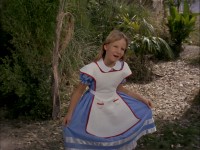


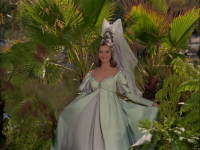
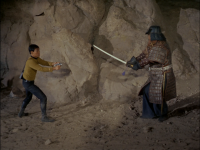
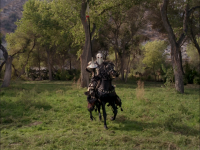
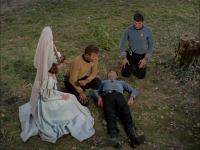
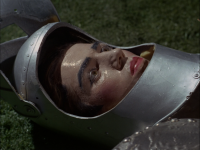
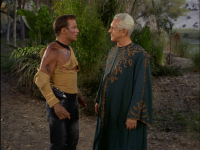
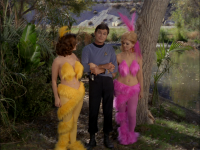
Star Trek TOS - 1x15 - Shore Leave
Originally Aired: 1966-12-29
Synopsis:
On shore leave, the crew's thoughts come to life. [Blu-ray] [DVD]
Filler Quotient:
2, filler, but an enjoyable episode nevertheless. You can skip this one, but you'd miss out on some fun.
- This world is revisited in TAS: Once Upon a Planet, but it is not necessary to see this episode before watching that one.
Problems
- The yeoman's broken uniform was broken on the wrong side after she changed back into it after taking off the Medieval dress.
Factoids
None
Remarkable Scenes
- Kirk getting a massage from his yeoman thinking it was Spock.
- McCoy to Sulu regarding Kirk: "You've got your problems, I've got mine. But he's got ours, plus his, plus 430 other people."
- McCoy seeing things from Alice in Wonderland come to life.
- McCoy describing what he saw to Kirk and Kirk believing he was joking.
- Spock maneuvering Kirk into taking some time off.
- McCoy and Kirk joking about the rabbit and reminiscing about Finnegan followed by Finnegan appearing out of nowhere and starting a fight with Kirk.
- Sulu's fight with the samurai.
- McCoy's apparent death.
- Spock and Kirk running through a set of dangerous illusions.
- McCoy's reappearance in the company of some 23rd century playboy bunnies.
My Review
This silly, whimsical episode manages to do humor better than any other so far. For most of the episode the unusually light hearted tone serves as a nice change of pace and the nonchalant way in which the crew investigates the strange things they're seeing is amusing. It was nice to see the characters get lost in some mostly harmless fascinations without the need for the plot to manufacture some danger to justify the aside. Unfortunately, things got considerably less entertaining after McCoy's apparent death.
Granted, it was a fantastically shocking moment when McCoy suddenly died while refusing to believe what he was seeing was real, but the shock's implications weren't taken quite seriously enough as the episode seemed to stubbornly refuse to change its tone once McCoy had seemed to die. The most annoying example of this is that Kirk's immediate reaction to McCoy's apparent death is to start chasing down imitation Finnegan so he can delight himself with an irreverently prolonged brawl with his imaginary friend.
I find it beyond irresponsible that Kirk would choose to focus on this rather than getting some answers. Sure, he tries to ask Finnegan for some answers, but Kirk should have known better than to expect Finnegan to give them to him. After a while Kirk seemed to give up on answers anyway and just enjoy the fight at which point Spock restores some sanity to the plot by deducing the cause of these manifestations.
Another unsatisfying aspect of the plot is the alien race which owns the planet who refused to identify themselves and the purpose of their seemingly uninhabited planet until after the crew was sufficiently traumatized. This omission of such a basic courtesy to foreign visitors to their world was rationalized by the idea that this alien race is so intelligent that they're unable to think the way humans do; a weak excuse. Overall though these critiques are small flaws in what is otherwise a highly entertaining story that is predicated on well executed comical absurdity.
The following are comments submitted by my readers.
- From technobabble on 2010-11-23 at 12:03am:
I enjoyed this episode very much as well, lighthearted romp in a pastoral backdrop after a tense space battle.
Only explanation for Kirk's Finegan reaction after McCoy's death is the fantasy world's hallucinations may had an affect on psychologically distracting the crew. Like Sulu shooting the firearm and fascinated with it without being cautious.
- From CAlexander on 2011-04-23 at 5:24pm:
The main plot is effective if you accept the premises. Not an episode of great significance, but memorable.
- The episode is sort of a variant of the Naked Time, revealing the hidden fantasies of the characters.
- I came to the same conclusions as the previous comment. The crew acts irrationally from the very beginning, paying little attention to the peculiar inconsistencies of the planet. Everyone acts like they are intoxicated by the visions they see. The show seems to imply that this is a normal part of being a humor episode, but if you want to look at things logically, it makes a lot more sense if you assume that the planet can influence minds as well as read them.
- From Mike Meares on 2012-04-10 at 7:44am:
A highly entertaining episode of Star Trek, which I thoughly enjoy. And still enjoy watching it, despite the many, many, many flaws in the script.
I loved the concept of the show. And much like the Enterprise crew I become mesmerized by what I am seeing appearing right before my eyes.
But if we take a step back and look at this episode "logically" it is really a very weak story, filled with a lot of mistakes.
I rate this episode a six because of it's entertaining value. But it could have been produced much better.
Over the years some of the writers have admitted that this episode, as well as many other episodes, went though so many re-writes that the flow of the story suffered greatly. It is said Roddenberry was re-writing scenes as they were actually being shot. Not sure how true that is, but it would explain some of the problems in the story.
The biggest problem in the script is the death of Dr. McCoy. The story explains that this race is so advanced that it can "repair" or bring someone back to life who is stabbed to death in the chest! REALLY? And we are suppose to beleive this just because they say so! I am sorry the explaination leaves something to be desired!
And while we are on the subject, this knowledge is something the Federation is not really interested in? Give me a break please! No one seems to care that this race can actually bring back the dead! I get more reaction from somebody when I show I can open a bag of bagels.
To make matters worse, this "advanced" race doesn't realize that the crew of the Enterprise doesn't understand what is going on the whole time! You have to ask yourself: why doesn't this advanced race show themselves after McCoy's death? Instead they "sneak" away McCoy's body without explaining to the rest of the crew what they are doing! The race continues with their illusions even though it is clear to a two year old human ( we must assume their two year olds are smarter than our two year olds! ) that at that point the crew of the Enterprise had abosolutely no idea what the hell was going on around them.
And the crew's communications were interferred with because of transmissions of this "advanced race". Even the transporter power aboard the Enterprise. REALLY? And this "advanced race" doesn't realize this at all? You have got to be kidding me?
Spock even says that the power was so strong that he reasoned that they only enough energy to beam down one more person before they lost the use of the transporter. Gee how lucky for them. I ain't buying it.
And as Spock is beaming down Sulu makes a staement that I am still scratching my head about. Sulu says, "Someone beaming down from the BRIDGE." Oh really? And how does Sulu know where the person is beaming down from? Spock could be beaming down from the Sick Bay for all Sulu knows. Correct me if I am wrong, but if you saw someone beaming down wouldn't you just assume they are beaming down from the.... eh.... oh I don't know.... THE TRANSPORTER ROOM!
All of these mistakes are due to the writing and should have been corrected before fliming. And they are all weak plot devices used to make the story workable, but they are just not every creative.
Everytime I watch this episode I have to ignore these aspects of the story or else I can't enjoy the show.
It is very odd but this episode can be summed up in three words. Enjoyable but flawed!
- From Scott Hearon on 2014-03-05 at 11:48pm:
Just watched this episode, and I agree with much of what "Kethinov" has to say. It gets annoying to see the downed crew members give Spock so much flack. It was a bit overdone (presumably in the name of selling this particular element of the episode), but I liked the basic premise and dynamic.
Yeah, that ambassador was a real jag-off. Could have been much less heavy-handed with that character.
The choice of giant, hairy primitives seems odd. I can't help but think that this was a bit of dumbing down, possibly by the network, so things didn't get too (gasp!)...intelligent or creative!!
Overall, though, it's a decent enough episode. Nice job touching up the visuals, too. What year did they do that, anyway? They look damn good. - From Yonagonaf on 2016-04-23 at 7:07pm:
There is a word in the sentence “The yeoman's broken uniform was broken on the wrong side after she changed back into it after taking off the Medieval dress.” that needs to be changed.
The word “broken” is incorrect.
The words “torn” or “ripped” are used when describing damage done to material.
In this case a uniform.
- From Kelly on 2017-08-17 at 11:15am:
A very fun and scenic episode, that is not really deep, but simply meant to be a getaway fantasy episode. Just watched it 2 times in a row, over the last few days, but found several small but still irking mistakes!
On a planet with supposedly no life or animals or bugs, a few close ups show flies around the faces of characters, especially the scene with Ruth.
There are tree stumps, and logs on the ground that are obviouly chainsaw cut.
The grass is freshly cut and there are even trails leading around, and one thing no one seems to ever catch, a BUILDING in one scene with Kirk and Spock walking around the glade. Look again its a hut that appears to have a natural look made from maybe logs and plant material, but none the less an actual building. I Know the crew was all excited, but no one saw any of this??
Most likely obvious mistakes, but could have been better hidden!
- From Jake on 2019-11-23 at 2:04am:
I think some take this episode a bit too seriously. But if you watch the show closely you can catch all sorts of little things. Like the chain on the tiger's paw. Or that the strafing plane is one time a Navy Corsair, and then suddenly a Japanese Zero. Or the changing dress tear. But this, like many others, just needs to be watched for entertainment which it did provide.

Star Trek TAS - 1x12 - The Time Trap
Originally Aired: 1973-11-24
Synopsis:
While exploring the Delta Triangle, where many starships have disappeared, the Enterprise is attacked by several Klingon vessels. [Blu-ray] [DVD]
Problems
- Kirk claims the stardate is 52.2. WTF? I don't normally say anything about stardates, but when they start going backwards I start getting annoyed.
- Scotty claimed the SS Bonaventure was the first ship with warp drive. This is not correct. Maybe he meant it was the first Federation ship with warp drive?
Factoids
None
Remarkable Scenes
- Kirk: "Mr. Spock has come up with a formula which may just get us out of here." The screen shows a bunch of symbols and numbers that don't make any sense. Hilarious.
- Kor and Kirk working together.
- Spock pretending to be nice to the Klingons as an excuse to touch them and probe their minds to find their hidden intent.
My Review
This episode bears an obvious reference to the Bermuda Triangle. The residents of the triangle formed a kind of miniature Federation, though it's not credible that the alien Elysian council is so ruthless in their methods of enforcing their odd laws, thankfully they don't get a chance to. Remarkable detail: the Elysian council is made up of several races we've already seen before. Such as an Orion female, a Tellarite, and even a Gorn!
No fan commentary yet.

Star Trek DS9 - 2x02 - The Circle
Originally Aired: 1993-10-3
Synopsis:
Relieved of her post and sent back to Bajor, Kira helps to reveal the hidden force behind The Circle and a greater secret that could destroy them all. [DVD]
Filler Quotient:
0, not filler, do not skip this episode.
- This arc sets up a number of long term plot threads, including Bareil's relationship with Kira.
Problems
None
Factoids
None
Remarkable Scenes
- The scene with Kira, Odo, Dax, Bashir, O'Brien, Quark, and finally Vedek Bareil. I love all the fast and confusing dialog.
- Kira's orb experience.
- Kira: "If you want to change the government, minister Jaro, you vote to change it. You don't sneak up from behind it with a dagger."
My Review
The plot thickens with the revelation that the Cardassians are supplying the Circle with weapons. Winn is scheming again and the reason for Kira's reassignment is revealed to be a political maneuver. Sisko's decision to disobey orders and stay aboard the station to fight the political uprising is an interesting twist for his character since the pilot. The focus on the characters preserving their friendships with the Bajorans was a nice acknowledgement of the sadness of being torn apart expressed so eloquently by Jake being prevented from seeing his girlfriend in the last episode. Perhaps the best scene of the episode is when Minister Jarro stands up on the ledge in the hideout like a James Bond villain confessing his evil plot to Kira. Overall though the episode is just dragged out far too long. A faster pace might have improved it somewhat.
The following are comments submitted by my readers.
- From djb on 2008-12-19 at 9:45am:
I'm coming to LOVE the character of Vedek Winn. Not because she's likable, rather the opposite. She's superbly acted and written, so much so that every time I see her I literally want to reach into the screen and rip her throat out. Excellent!
Other than that, I'd agree with Kethinov... not a whole lot more to this ep than building up to some hopefully momentous conclusion, which I haven't watched yet.
Also nice to see good character development for Kira, and nice to see how much Kira and Sisko have grown close over the previous year. Also cool to see Odo and Quark (gasp!) working together? Neat orb sequence too.
A solid 5. - From Bernard on 2010-02-08 at 1:18am:
This episode is unneccessarily drawn out to the extent that it almost ruins the gathering pace of plot created by the climax of season one and homecoming. Solid 5, but should have been so much better! If only they had dared to concentrate more on the Bajoran politics and less on our heroes doing boring things such as rescue missions.
Which just reminds me, exactly what is our good Doctor ordered to do when he finds Kira? Slap a com badge on her and call for transport. What does he actually do? Starts treating her wounds! Fortunately this kind of gaffe is actually IN character for him.

Star Trek Voy - 2x22 - Innocence
Originally Aired: 1996-4-8
Synopsis:
Tuvok crash-lands on a moon. [DVD]
Problems
- The whole premise is nonsensical. We're supposed to believe these people are born fully grown and die as children? I mean come on!
Factoids
None
Remarkable Scenes
- Ensign Bennet's death. A touching death for a redshirt.
- Tuvok babysitting.
- Tuvok singing.
My Review
A good Tuvok episode, but a poor sci fi episode. The science of people being born elderly, their age reversing, and they die as children is just ridiculous. You've got to give the episode props for Tuvok's performance; he did a fantastic job with the children. I also liked the initial diplomatic meetings between the crew of Voyager and our aliens of the week. It's nice for once to see peaceful aliens instead of someone who wants to conquer Voyager or steal her crew's organs and whatnot. Janeway also handled the points of contention between our aliens of the week well too. Good acting is nice, but the premise is just too ridiculous to warrant a high rating.
The following are comments submitted by my readers.
- From Remco on 2009-02-05 at 3:29pm:
This was a pretty boring episode. It's a shame, because I don't think the premise is necessarily ridiculous.
Some coincidence it is, that I just saw "The Curious Case of Benjamin Button" in the cinema a few days ago. The premise is very similar. Benjamin is born with all the signs of old age, and then he grows younger. This episode's idea must have come from the same book as the film is inspired by.
One thing that differs between the film and this episode, is that the film is much more interesting. It focuses on the lives of two people: one growing younger and one growing older. The episode instead doesn't do very much with the premise. We don't get to see what it is like growing younger. Instead, we have a mystery plot regarding some monster, Tuvok babysitting, and some diplomatic discussions on Voyager.
The final moments between Tressa and Tuvok make the episode a lot better than it should have been. - From JRPoole on 2009-03-23 at 2:54pm:
If you overlook the presence of children, which is almost always a bad idea on Star Trek, and the utterly ridiculous plot twist with the reverse aging process, this is pretty solid. As is, it's pretty wretched. I give it a 3. - From thaibites on 2013-11-17 at 7:16am:
They should've had Jonathan Winters on this one.
Nanoo, nanoo.

Star Trek Voy - 7x16 - Workforce, Part I
Originally Aired: 2001-2-21
Synopsis:
The crew works on an unknown world. [DVD]
Problems
None
Factoids
- The Quarran ships are a reuse of the Breen ships from DS9.
Remarkable Scenes
- The sight of the impressive Quarren city.
- Janeway to her supervisor: "I can already tell it's going to be much better than my last job."
- Seven the "efficiency monitor."
- Tom having discipline problems
- Tuvok, the funny man, a joke teller.
- The doctor as the Emergency Command Hologram. Nice reference to Voy: Tinker Tenor Doctor Spy.
- The sight of Neelix' ship leaving the shuttle bay.
- Neelix and Chakotay "abducting" Torres.
My Review
Impressive. Voyager has been abusing two part episodes lately, squandering time. But this is a case where the two part episode is used well. Part one is sufficiently complex, giving us many sets and many problems. I was very pleased to see the doctor get to play Emergency Command Hologram for real, fantastic continuity with Voy: Tinker Tenor Doctor Spy. The way he and eventually Chakotay, Harry, and Neelix all deal with the problem was very professional and a lot of fun to watch. Part one has thus far made great use of Voyager's diverse elements and continuity. Besides the ECH, we see the return of Neelix' shuttle, Torres' pregnancy is used in the story again, Tom's delinquency is made an issue, Janeway's desire for a relationship shows up again, and even Seven of Nine's efficiency fetish plays a role. It's remarkable how the characters were selectively brainwashed so the essence of who they were remained, even if their memories were tampered with. The episode's climax is exciting, leaving us with a (most literal) cliffhanger after Chakotay had been discovered and Torres "abducted." Finally, the graphics in this episode were spectacular, some of the best ever shown.
The following are comments submitted by my readers.
- From Dstyle on 2015-08-05 at 9:42pm:
Despite possessing the complete technical knowledge of the Borg Collective, the aliens of the week decide to make Seven of Nine their new Efficiency Officer. Geez, if you're going to criminally underutilize her, why not just put her in charge of handing out paper towels in the bathroom?

Star Trek Ent - 3x23 - Countdown
Originally Aired: 2004-5-19
Synopsis:
With help from Xindi allies, the Enterprise crew attempts to stop the arming of the Weapon aimed toward Earth. [DVD]
Problems
None
Factoids
None
Remarkable Scenes
- Dolim explaining to Hoshi why he needs her.
- Dolim injecting Hoshi with neural parasites.
- Archer meeting with the aquatics.
- Hoshi trying to kill herself rather than help the reptilians.
- Trip: "Can you imagine the look on Soval's face when he sees her in a Starfleet uniform?" Heh... I can. Remember Ent: Twilight?
- The battle at the weapon.
- The destruction of the aquatic vessel.
- Hayes: "I could use a change of scenery!"
- Hayes taking injury during transport!
- Hayes' death.
- The reptilians betraying the insectoids.
My Review
Ent: Countdown is an amazing action thriller, a wonderful climax to the Xindi arc. Yet another great character dies... Hayes. And we're left with yet another cliffhanger. But overall, I didn't really care because the episode was just so much of a fun ride. I complained in my last review about the reptilians and insectoids being shown as too stereotypically evil with the single exception of the one reptilian officer who questioned the sphere builders. I was pleased to see that the insectoids were beginning to question the sphere builders as well at the end of this episode. This means that only Dolim is a ridiculous, overzealous, arrogant moron and not the entire reptilian and insectoid Xindi species. The Xindi arc comes to a head here, of course. The space battle shown here is even more spectacular than any of the previous ones. We don't know the aquatics very well, but the destruction of their ship was downright sad. As much a loss as Hayes and Degra were. There were two scenes in particular where (good guy) Xindi ships were destroyed that were unbelievably visually impressive. And of course the way that Hayes died is an interesting point of discussion as well. It's always nice to see that 22nd century technology isn't infallible. I was annoyed that the transporter was sufficient to beam in four people at once, but the episode kind of redeemed itself when Hayes was able to be shot during transport. I'm not sure how all the mechanics of that work out, but I'm sufficiently convinced it's at least possible, even if the same thing happened to Archer (among other people) earlier in the series and he wasn't hurt. A final remark, Linda Park did an excellent job playing Hoshi in this episode and I thought it was an excellent use of her character, for once.
The following are comments submitted by my readers.
- From Pete on 2011-01-11 at 12:55am:
Hmmm...Major Hayes was killed in a similar manner as the character Dobby was killed in Harry Potter and the Deathly Hallows. Did J.K. Rowling plagiarize from the great Brannon Braga? We will never know!

Star Trek TNG - 2x05 - Loud as a Whisper
Originally Aired: 1989-1-9
Synopsis:
A deaf mediator communicates through a Chorus. [DVD]
Problems
- Why can't Riva talk? Many deaf lip readers, who are exactly like Riva, have no problem with it.
- Why was Data signing to Riva? Riva lip reads! Also in a few spots, Data was only signing some of the time.
Factoids
- Before Riva, there was no Klingon word for "peacemaker."
- The female on Riva's chorus (Marnie Mosiman) is the wife of John de Lancie, who plays Q.
Remarkable Scenes
- Picard so easily dismisses Riker's objections with Picard leading the away team now. :)
- Riva's overconfident behavior.
- The death of Riva's chorus. Some neat special effects.
- The murderer of Riva's chorus being killed by his superior officer.
- The away team beaming back up to the Enterprise in desperation, leaving the superior officer of Riva's chorus' murderer in horror yelling "we need you!"
- The pain in Riva's face in the scenes after the death of the chorus and the sympathy of Picard et al is wonderfully done.
- Picard: "Data, he knows some kind of gestural language. Find out which one and learn it!"
- I love how Picard tries to reassure Riva that they're all in this together. So sad. :(
- Data's brief but impressive signing demonstration and Picard's reaction.
- Geordi considering surgery to fix his vision. I love Pulaski in that scene. "I can fix your vision." Geordi: "What? I was told that was impossible." Pulaski: "I've done it twice." Way to go arrogant Pulaski!
- The counselor forcing Riva to see the solution.
My Review
Another exactly like humans race! Riva's race. Despite this, Riva, his race, and his chorus were fascinating. The tragedy that was the death of his chorus was exciting, sad, and a powerful motivator for the wonderful ending. Also, adding the tiny tiny B plot of Geordi confronting his blindness due to learning of Riva's deafness was appropriate and interesting. It is regrettable that we're not informed of Geordi's decision. We must assume he decided to keep everything as is because nothing became of his visit with Pulaski.
The following are comments submitted by my readers.
- From DSOmo on 2007-06-17 at 6:07am:
- When the Enterprise reaches Solari V, Worf reports laser activity. Picard immediately tells the inhabitants of the planet that they must stop fighting or the Enterprise will leave. He says that he will not endanger his ship. Evidently Picard is simply bluffing because, in the episode just before this one, he and the bridge crew were joking about spaceships attacking them with only lasers ("The Outrageous Okona").
- Riva's chorus' death is very spectacular but not expected for a laser weapon. Normally lasers only burn holes in stuff. Do the inhabitants of Solari V have some sort of special laser? If they do, maybe that is why Picard was worried about his ship ;)
- After the death of Riva's chorus, Picard meets with Riva in the observation lounge. During their conversation, Picard tries to convince Riva to help the factions on Solari V. Riva refuses and storms out of the room. The observation lounge is on deck 1, just behind the main bridge. The only way to his quarters is via turbolift. Because riders must speak their destination on a turbolift, Riva isn't exactly equipped to wander around the Enterprise by himself!
- Both times, just before they beam down to Solari V, Riker sets his phaser on stun by pointing the phaser directly at his stomach and then manipulating the control. Doesn't this seem like an unsafe practice? - From thaibites on 2010-01-20 at 4:10pm:
Another touchy-feely, 2nd season episode designed to get those ladies watching. YUCK!
Does season 2 ever get good? - From CAlexander on 2011-03-23 at 2:16pm:
A good episode, the idea of the chorus was pretty cool.
In response to previous points:
- While it may be possible Riva could have learned how to speak, using the chorus is so much more effective that he probably never learned how to do so.
- Lipreading is difficult and inaccurate compared to sign language. Data was being helpful by signing to Riva.
New points:
- Adding to the points about the phasers, it is interesting how each time they beam down, they set the phasers on stun, put them in their holsters, beam down, then immediately draw their phasers. Maybe they want to look nonthreatening during the beam down process?
- A convention of Star Trek is that language barriers are ignored, everyone can speak English. Occasional references are made to the universal translator being somehow responsible for this. This episode sort of breaks that convention, suddenly Picard actually has to deal with the concept of being unable to understand Riva's language. Apparently the universal translator doesn't work on sign language! But if the universal translator doesn't work on visual communication, then Riva wouldn't be able to read lips unless he really did know the language being spoken. Just an interesting point.
- From CasualLamb on 2021-04-30 at 10:07pm:
Gotta say, my man Riker’s looking particularly dapper this episode. - From Azalea Jane on 2021-07-20 at 9:28pm:
Overall this time I think I enjoyed this episode more than previous times.
I didn't like Troi calling out Worf's emotions in front of others. That's not cool. People's emotions are their own business if they don't make it anyone else's problem. She could have invited him to speak his mind, at most.
I liked the blind man and the deaf man meeting. Geordi talking about his blindness and his VISOR: "They're both a part of me and I really like who I am, so there's no reason to resent either one." - Awesome quote. The phrase "I really like who I am" has stuck with me since I first heard it. #goals?
I wonder what's in it for Riva's chorus? I mean... they're people with their own lives, friends, families, and interests, right? Do people have to work to live on their planet? Is the chorus well-compensated? Do they get time off? Are there substitutes? Do they get sick? They only seem to exist to serve Riva and his family --- consigned by birth into servitude. Maybe their species doesn't mind that sort of thing? Maybe the chorus members actively enjoy(ed) it? I hope so.
The chorus dying suddenly is a nice twist the first time you see it. We get to know them a little bit, maybe even care about them, and then BLAM! They're gone and Riva is nerfed. He's suddenly out of control. I do like the resolution, even if (a la Trek) it's rushed. There isn't always a silver lining or a creative solution, but I liked the solution here. Reminds me how I think it's tragic that sign language typically isn't taught in grade school.
In response to grumpy Mr. thaibites up there: Trek fandom has always included women. Women have always been part of its production, writing, and vision. It was a woman, Lucielle Ball, who saved Trek from cancellation before it was even aired, overriding an all-male board. (Not the only time it was almost canceled, but the first.) Also, "touchy-feely" plotlines (which can be enjoyed by any gender) are an intrinsic part of Star Trek. Deal with it ????

Star Trek TNG - 2x21 - Peak Performance
Originally Aired: 1989-7-10
Synopsis:
A simulated war game turns deadly. [DVD]
Problems
- Antimatter is pretty nasty stuff to be letting young Wesley tinker with as if it were every day chemistry class chemicals.
- It makes sense that Worf would have the ability to fake out the Enterprise computer... but the Ferengi ship?
Factoids
- Armin Shimmerman, who later plays Quark in DS9, plays Bractor in this episode.
Remarkable Scenes
- Kolrami had such wonderful arrogance.
- Worf and Riker discussing the wargame and Riker recruiting him.
- I love the strategema side plot.
- Picard: "It is possible to commit no mistakes and still lose."
- Picard: "And Data, will you leave your hesitation and self doubt here in your quarters?"
- Data over analyzing Riker.
- Picard fooled by the simulated Romulan ship.
- I love how Picard goes from being amused to serious in a split second. One second he is complimenting Worf for fooling their sensors again. The next second Picard is spouting desperate defensive orders because that the Ferengi ship wasn't a ghost.
- Data "busting up" Kolrami.
My Review
An action packed episode filled with effective dialog, great side plots, and a fun ending. Only the technical problem regarding Worf faking an incoming ship to the Ferengi stains the episode. Otherwise one of TNGs more memorable installments and I dare say would have been a worthy season finale. The episode after this one was entirely unnecessary...
The following are comments submitted by my readers.
- From DSOmo on 2007-07-02 at 12:55am:
When Wesley gets his experiment (the antimatter) out of its storage bin, he is very careful. Later, when he and Geordi place it in the warp engines, Geordi urges caution. Yet, when Wesley beams it over to the Hathaway, he beams it onto a small tabletop. Since the container is round, it rolls to a resting place (it is a nice effect). If this thing is so unstable, why beam it onto a tabletop and take the chance it will roll off? - From JRPoole on 2008-02-20 at 3:50pm:
This is a solid episode, but not one of my favorites. Aside from Worf's perplexing ability to fake out the Ferengi sensors--why hasn't he been doing this all along to every body the Enterprise meets in battle?--there aren't many real problems. But something just isn't right here for me.
Maybe it's just my predisposition to turn up my nose at any Ferengi episode, but the Ferengi presence here seems rushed. I know they're driven by profit, but I don't really buy their willingness to potentially start a war over the Hathaway. Again, maybe that's just my anti-Ferengi bias. I've always thought them to be a silly, over-drawn, stereotypical species, and here is one of the worst offenses this side of their initial appearance.
I love the sub-plot with the Stratagema game. I find the finger-interface and the game display to be ridiculous, though. - From KStrock on 2009-01-24 at 11:55pm:
Starfleet doesn't conduct military routine exercises? What about Section 31's activities? I find that hard to believe given the (fairly recent) wars with the Klingon Empire and the brutal war with the Romulans that lead to the establishment of the Neutral Zone.
Also, I find Picard and Riker's distaste for the whole exercise as "unnecessary for an officer's makeup" bit out of character. Both men surely would see value in having their crews trained for battle stress. - From Yaspaa on 2010-05-07 at 10:42pm:
I wasn't keen on Pulaski at the time. On watching the episode now (after not watching an episode in 9ish years) she is, dare I say, a better more enjoyable character to watch. Both Pulaski and Crusher have the old hippocratical oath
caring tendencies. Pulaski is more abrasive however, making her more interesting, purely due to the friction her personality can generate. - From THoyt on 2011-04-12 at 9:09pm:
The Ferengi attacked and gave Picard "10 of your minutes" to surrender the Hathaway. The Hathaway had no real weapons to speak of, and the crossover relays between the Enterprise's real weapons systems and simulation systems were "fused", rendering them unable to fight back against the Ferengi. How did they manage in 10 minutes to have 4 very real photon torpedos ready to fire at the Hathaway? And if indeed they were able to get weapons online, why not just fight the Ferengi and send them running? - From CAlexander on 2011-04-18 at 2:39pm:
- I pretty much liked the plot about Riker getting his own command, picking the best crew, and cheating like heck to try to beat the Enterprise.
- I was guessing from the start that the battle would be broken up by a real enemy. Maybe because that was exactly the premise of an old scenario from Star Fleet Battles (a Star Trek wargame). I wonder if the writer of this episode read that scenario.
- The subplot with Data was sort of peculiar. Pulaski wants to bring Kolrami down a peg, and she assumes that since Data is a Deus Ex Machina who can do anything, he's bound to win. When Kolrami wins, she thinks the plot just isn't supposed to be written that way.
- It is remarkable about how petty everyone is towards Kolrami beating Data. Nobody is impressed by his incredible accomplishment. They just want to wipe that smirk off his face. When Data can't win, but manages to upset Kolrami, everyone cheers.
- As KStrock mentions, it is very hard to believe the comments about the crew not needing to practice war maneuvers because Starfleet is not a military organization. Of course it is! I'll assume that Picard was really just being diplomatic, what he really thought initially was that the specific test Kolrami planned, spending a great deal of time preparing for a brief, totally uneven matchup, was stupid and a waste of time.
- In response to THoyt: It was established in the first Ferengi appearance that they have starships equal in power to Federation starships. The Ferengi made what was effectively a sneak attack on the Enterprise, and the Enterprise shields "can't take another hit" and the weapons are scrambled. Presumably 10 minutes was enough to get a few torpedoes online, but not enough time to give the Enterprise a reasonable fighting chance against the Ferengi.
- I agree that Worf's ability to fake out the Ferengi was hard to believe, not a very satisfactory conclusion to the problem. But then again, those TNG Ferengi are so stupid, maybe they don't know how to read their own instrument panels properly.
- From g@g on 2012-03-03 at 2:10am:
Agree about the main technical problem.
Otherwise, plenty of good stuff in here. The strategist was a pretty neat and memorable guest character. Also, Warf has an especially great and useful role to play (again, just like in Emissary) and some good lines to go with it(Data: "That would be unfortunate." Warf: "*Very* unfortunate. We will be dead").
Data's little crisis of confidence subplot was great... I loved Picard's reaction to having to "handhold an android," and likewise Data's reaction to Picard. Also, it was great to see Pulaski finally come around a bit towards Data and "anthropomorphize" him like everyone else - what I really mean is show him some understanding, compassion even.
Besides the main tech. problem, my other questions would be:
1) Data's tactic of playing for a draw seems a bit obvious to have such devastating consequences on a grandmaster. But he's Data, so maybe it was the semi-obvious tactic combined with his mad processing powers.
2) Shouldn't the Ferengi's brazenly firing on the Enterprise have some kind of serious longterm consequences?

Star Trek DS9 - 7x22 - Tacking Into the Wind
Originally Aired: 1999-5-12
Synopsis:
Bashir works on a cure for Odo's debilitating illness, while Martok assumes power following the death of Gowron. [DVD]
Filler Quotient:
0, not filler, do not skip this episode.
- Numerous major long term plot threads are serviced here.
Problems
None
Factoids
- Garak's 35th episode.
Remarkable Scenes
- Kira, Garak, et al analyzing the aftermath of the sabotage of a Jem'Hadar ship.
- Garak stumbling on a deteriorating Odo.
- Female shapeshifter: "If our cloning facilities were operational, I would eliminate this Weyoun immediately."
- Sisko ordering Worf to do something about Gowron squandering resources over his petty political vendetta.
- Rusot provoking Kira again.
- Damar: "What kind of state tolerates the murder of innocent women and children? What kind of people give those orders?" Kira: "Yeah, Damar, what kind of people give those orders?" A nice reference to Ziyal's death.
- Worf: "You are still a member of the house of Martok." Ezri: "This is the first that I've heard of it." Worf: "The general and I talked about it weeks ago. He likes you and considers you an honorable woman. A worthy successor to Jadzia. And so do I." Ezri: "That is very sweet of him." Worf: "Sweet?" Ezri, realizing her faux pas: "Not a very Klingon word, is it?" Worf shakes his head and says: "No." Ezri: "It's very... honorable." Worf: "Better, albeit a little obvious."
- Worf regarding the Gowron situation: "Tell me what you think." Ezri: "Okay, but I'm not sure you're going to like it." Worf: "Tell me." Ezri: "I think the situation with Gowron is a symptom of a bigger problem. The Klingon Empire is dying. And I think it deserves to die." Worf: "You were right. I do not like it." Ezri: "Don't get me wrong. I'm very touched that you still consider me to be a member of the house of Martok. But I tend to look at the empire with a little more skepticism than Curzon or Jadzia did. I see a society that is in deep denial about itself. We're talking about a warrior culture that prides itself on maintaining centuries old traditions of honor and integrity but in reality is willing accept corruption at the highest levels." Worf: "You are overstating your case." Ezri: "Am I? Who was the last leader of the high council that you respected? Has there even been one? And how many times have you had to cover up the crimes of Klingon leaders because you were told it was for the good of the empire? I know this sounds harsh but the truth is you have been willing to accept a government that you know is corrupt. Gowron's just the latest example. Worf, you are the most honorable and decent man that I have ever met. And if you're willing to tolerate men like Gowron, then what hope is there for the empire?"
- Kira, Odo, Garak, Damar, and Rusot arriving at the Cardassian shipyards.
- Luaran: "What's this?" Garak: "We have a prisoner." Luaran: "I can see that. Why are you bringing her to me?"
- Odo posing as the female shapeshifter.
- Garak killing the entire bridge crew of the Jem'Hadar ship.
- Worf standing up to Gowron.
- Worf killing Gowron.
- Worf: "Kahless said, great men do not seek power. They have power thrust upon them."
- Worf declaring Martok the leader of the Klingon Empire.
- Damar killing Rusot.
- Kira, Odo, Damar, and Garak stealing a Jem'Hadar ship, equipped with the Breen weapon.
My Review
Some more big events. Odo's disease is killing him faster now that he's been changing shape all the time, Worf kills Gowron and declares Martok the new leader of the Klingon Empire, and Damar kills one of his best friends, Rusot, to prove to Kira his newfound devotion to defeating the Dominion, changing his ways, and changing the ways of Cardassia is sincere. I continue to be extremely impressed with the changes in Damar's character. I was also impressed with Worf's decision to kill Gowron. It's remarkable to note how Sisko told Worf to stop at nothing to eliminate Gowron's threat, similar the devotion he expressed to Garak regarding getting the Romulans in on the war in DS9: In The Pale Moonlight. I also enjoyed Ezri's opinions on the Klingon Empire. I think it really opened up Worf's eyes, and the eyes of many viewers too! Overall, another highly exciting installment of the current arc.
The following are comments submitted by my readers.
- From Rob on 2008-04-27 at 1:46am:
I love how Ezri's analysis takes in all of Worf's history and, in effect, all of the history of the Klingon Empire. Not in only DS9, but all the way back to the third season of TNG and Duras' involvement in the High Council. Fantastic long-term continuity...!
- From Pemmer Harge on 2010-03-22 at 11:56pm:
The best episode of the Final Chapter by quite some distance. Most of the others are at least good, but this one is just better written and more intelligent.

Star Trek Pic - 1x0.1 - Children of Mars
Originally Aired: 2020-1-2
Synopsis:
12 year-old classmates Kima and Lil find themselves at odds with each other on a day that will change their lives forever.
Problems
None
Factoids
- The song played during much of the episode is "Heroes" written by David Bowie. This is Peter Gabriel's cover of the song.
Remarkable Scenes
- The gorgeous shot of Utopia Planitia.
- The escalating conflict between Kima and Lil.
- The attack on Mars and the girls bonding over it.
My Review
This is an incredibly touching story that does much to rise above the regrettable Short Trek format. Despite how compacted the story is, there is both a lot of exposition and a lot of heart packed into here. With almost no dialog, we see the portrait of the lives of two girls, the daughters of workers at the Utopia Planitia shipyards, apparently set in the 24th century during events sometime after Star Trek X: Nemesis. At first we see two pretty typical schoolgirls getting into pretty typical petty conflicts which itself is compellingly portrayed as the inevitable consequence of problems at home manifesting themselves at school. But soon their lives are turned upside down when Utopia Planitia and all of Mars itself suffers a cataclysmic attack that presumably will be followed up on in more detail in future episodes.
Like the smattering of details we get in Star Trek XI (2009) about events in the 24th century in the prime universe, we get a tiny tantalizing continuation of post-Star Trek X: Nemesis events here, but it's mostly a tease. While technically this episode could be said to be the pilot for Star Trek: Picard since it is the first episode produced in that setting, it obviously isn't the actual pilot. This is a teaser prequel of sorts. So while this story is surprisingly touching and interesting, it clearly could've been worth even more points if it were, you know, an actual episode, and not confined to this terrible format.
It should also be noted that the aesthetics of ships, technology, and sets presented here are strikingly reminiscent of Star Trek: Discovery. One could be forgiven for not immediately realizing this is an episode of Star Trek: Picard, not Star Trek: Discovery given how the production aesthetics look nearly identical in spite of the setting being more than a century apart. This is indeed an unfortunate state of affairs, but we should place the blame for this on Star Trek: Discovery, not on Star Trek: Picard. The "updated" aesthetics we see here make much more sense in a sequel than a prequel. As such, we shouldn't consider it a continuity error for Picard to borrow heavily from Discovery's aesthetics. The error continues to be Discovery's for attempting the disastrous visual reboot to begin with. When a sequel updates appearance, that's not a reboot. It's just technological and aesthetic drift over in-universe time, so it isn't fair to hold Discovery's sins against Picard.
Overall this episode is a vital shot in the arm to the Star Trek franchise. It's a sequel, not a prequel. Finally! And the story was told in a way that is touching rather than overwrought or manic like Discovery or the Kelvinverse. If this tasteful, touching story is the prototype for what we can expect from Star Trek: Picard going forward, then perhaps all good things don't have to come to an end quite so soon.
No fan commentary yet.

Star Trek Voy - 2x25 - Resolutions
Originally Aired: 1996-5-13
Synopsis:
Janeway and Chakotay are forced into exile. [DVD]
Problems
- So Voyager just left all that equipment on the planet?
Factoids
- According to Paris, a type 9 shuttle has a top speed of warp 4.
Remarkable Scenes
- Chakotay ridiculing Janeway for her comment about "roughing it."
- Chakotay and Janeway hitting it off as they construct their new home.
- Janeway discovering the primate.
- Chakotay after discovering the primate: "Looking for a pet?" Janeway: "No, looking for a clue about primate physiology on this planet. They must have to contend with insect bites too."
- Tuvok relieving Kim of his duties when he speaks up about the Vidiians.
- Kim approaching Tuvok to present his well thought out plan, only to be rejected again.
- Tuvok agreeing to contact the Vidiians.
- Chakotay : "I can tell you a story, an ancient legend among my people. It's about an angry warrior who lived his life in conflict with the rest of his tribe. A man who couldn't find peace, even with the help of his spirit guide. For years he struggled with his discontent. The only satisfaction he ever got came when he was in battle. This made him a hero among his tribe, but the warrior still longed for peace within himself. One day, he and his war party were captured by a neighboring tribe led by a woman warrior. She called on him to join her because her tribe was too small and weak to defend itself from all its enemies. The woman warrior was brave and beautiful and very wise. The angry warrior swore to himself that he would stay by her side, doing whatever he could to make her burden lighter. From that point on, her needs would come first. And in that way, the warrior began to know the true meaning of peace." Janeway: "Is that really an ancient legend?" Chakotay: "No. But that made it easier to say."
- Tuvok's maneuver at the end.
My Review
A decent offering with some minor flaws. It was obvious from the beginning that Janeway and Chakotay would return to the ship, so the whole "they might never come back" plot came off as annoying. Tuvok's initial behavior as captain was equally annoying; frankly, the first thing they should have done once they left Janeway and Chakotay there was to go find the Vidiians and try to get their help. Harry was right, Tuvok was not. And stretching out the contention was just a waste of time. The episode presents great continuity with Voy: Lifesigns, with Denara showing up again, though the star of this show is the interaction between Chakotay and Janeway. It seems to me that the writers have been trying to get the two of them together for a long time, but they never actually went through with it. Though, this episode gets closer to it than almost any other.
No fan commentary yet.
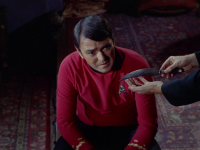
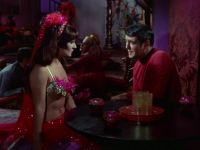
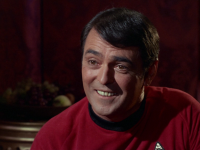
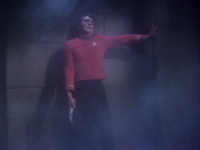
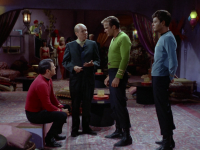
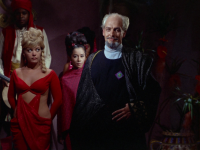
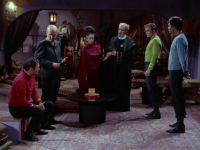
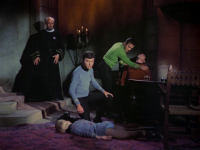
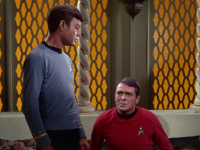
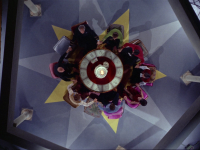
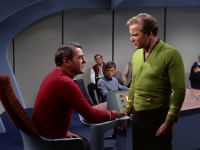
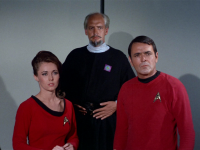
Star Trek TOS - 2x14 - Wolf in the Fold
Originally Aired: 1967-12-22
Synopsis:
Scotty is implicated in a Jack the Ripper-style murder. [Blu-ray] [DVD]
Filler Quotient:
3, bad filler, totally skippable.
- Pretty lame episode with no significant long term continuity.
Problems
None
Factoids
- John Fiedler, the man possessed by Jack the Ripper in this episode, also played the voice of Piglet in Winnie the Pooh.
- It is stated that in the Star Trek universe, there was a colony on Mars by 2105.
Remarkable Scenes
- Scotty's serious satisfaction with his salacious shore leave.
- McCoy: "S/he's dead, Jim." Counts 4, 5, and 6 all in this episode!
- Spock: "Humans and humanoids make up only a small percentage of the life forms we know of."
- Spock: "In the strict scientific sense, doctor, we all feed on death. Even vegetarians."
- Sulu all drugged up.
- Spock ordering the computer to compute pi to the last digit in order to clog up its processing and memory capacity.
- The entire crew drugged at the end.
My Review
What started off as a fairly entertaining story about a murder investigation in the tradition of The Conscience of the King focused nicely on the underutilized character of Scotty turned out instead to be a flop induced by yet another non-corporeal entity, poor pacing, some awkward aesthetic choices, and some wonky writing. At the start of the story, the idea that Scotty while recovering from an injury could be committing murders he couldn't recall due to his injury was an intriguing idea. I question the medical ethics of allowing a concussion victim to galavant around in a strip club, but McCoy's always played it somewhat fast and loose. ;)
But it doesn't take long for the annoying details to kick in. What the hell is a psycho-tricorder and by what fantasy mechanism is it capable of determining without a doubt whether or not Scotty murdered anyone? Why was Scotty not confined until the murder investigation was concluded? Exactly how was Sybo supposed to receive "impressions" from inanimate objects? And then there's of course the annoying recurring issue of the aliens of this planet being yet another alien race which looks identical to humans without explanation.
The most annoying detail though is the Jack the Ripper connection. I suppose there's nothing fundamentally problematic with the idea that Jack the Ripper was in fact an alien entity which feeds off death, but aside from the fact that that idea is pretty silly to begin with, the plot logic didn't take the logical consequences of that premise very seriously. For starters, the way they used the computer to jump to this conclusion so quickly based on the lookup of a single name was silly, as was the ridiculous over-reliance on the computer in general. At one point they ask the computer to validate the hypothetical conclusions of five minutes worth of conversation, as if the computer is some kind of all-knowing godlike arbiter of truth.
They then spend another several minutes after this continuing to uselessly speculate on that very hypothesis in a painfully verbose fashion. All the while the entity sits and listens to all this while inhabiting Mr. Hengist. Why the entity waited so long to go hide in someone else's body is beyond me; it must not have been very smart. Were I an entity of such power, I wouldn't have inhabited the body of someone charged with performing the murder investigation. Instead, I'd have picked the most irrelevant bystander I could find and disappeared into the crowd.
Finally the episode reaches its climax of absurdity when they beam the entity into space while it's still inhabiting Mr. Hengist, killing Mr. Hengist in the process! I suppose you could say the crew was desperate to survive, but they didn't even try to save that poor, unfortunate man, nor did the plot make any excuses for why the characters may have been unable to do so. Overall a terrible episode.
The following are comments submitted by my readers.
- From Orion Pimpdaddy on 2008-07-24 at 5:23pm:
The leader of the planet had his wife murdered right in front of him. Why does he not show any remorse? - From Orion Pimpdaddy on 2010-05-17 at 3:19am:
I found something odd. Remember when the administrator who was possessed by Jack the Ripper dies while trying to flee the room? Watch closely what McCoy and Scottie do with the body. They pick it up and place it in a chair at the table. Since when is this the procedure when someone dies aboard the ship. Why would they pick up a corpse and seat him at the table with everyone else?
Well, the obvious reason is that the director of the episode needed his body to remain in the room because it was going to be reanimated later on. I guess they didn't want to bother having him walk all the way back to the room from the sick bay morgue, where he should have been. - From rpeh on 2010-07-13 at 12:54pm:
The episode starts well and is interesting and suspenseful... right up until the Jack the Ripper connection is made. It turns what could have been a decent story into a stupid one. - From Wiley Hyena on 2012-05-14 at 6:12pm:
Reviewer missed the mark here. The suspence of the revelation of Hengist was very good. Some continuity problems, but those are standard fare in TOS and usually forgivable. Give this episode a 6. Entertaining. - From Harrison on 2012-09-04 at 8:53am:
A turkey to be sure, but a titillating one, and darn funny in spots. John Fielder is incredibly funny and the tranquilized immortal serial killer, chanting "with a groggy smile "Die! Die! Everyone is going to Die!" - From Troy on 2013-01-14 at 5:15am:
Although I was worried about the killing of Mr. Hengist at the end there, I believe it was justified by the fact they declared him dead earlier in the episode. To me this implied the entity already killed this man and was basically using his lifeless body as a vessel, hence why the crew had no qualms with beaming him into space. - From Tooms on 2013-10-12 at 9:52am:
I agree with Troy that it was already explained why Hengist couldn't be saved. When McCoy said Hengist was dead earlier in the episode, they were shocked because although Kirk had kicked him, it wasn't anything that should kill a man. I took that to mean Hengist was long dead and reanimated by the entity, so there was no way to save him. - From Chris Long on 2017-11-10 at 7:33pm:
Aside from all the other problems described the main reviewer and commenters... Why didn't Kirk just have Spock beam down and mind meld with Scotty to at least get an idea of what may have happened to him?
Also, the funniest line in all of TOS,
McCoy describing a possessed person on his tranquilizer: "Well, it might take up knitting, nothing more violent than that."
- From Azalea Jane on 2023-08-26 at 10:21am:
Boy, that computer voice is awkward!
I'm finally bingeing my first full watch of TOS. I've definitely seen a few episodes, but not many until now. It's ... an interesting experience. Obviously the effects and sets are dated, but I can appreciate that it looked cooler at the time. The misogyny is frustrating, often to the point of being funny. Like viewing it in a museum. Overall I'm enjoying the show. I never get tired of Spock. Watching TOS is especially interesting at the moment, having just finished the second season of Strange New Worlds, which, for the uninitiated, is set on the same ship but several years earlier under Pike, giving us a lot of backstory on several TOS characters. I quite like it. The contrast between the shows is, to borrow a term: fascinating. And this is where it all started! It really says something about a show when it can spawn a fandom as huge and passionate as this one.
Anyway, I watched movies 1-6 as a kid, but very little TOS for a long time. TNG was my Trek. I grew up hearing Majel Barrett's voice aboard the 1701-D, speaking like an actual person, and I'm quite amused at the same voice doing this 60s rendition of what a future computer might sound like. Stilted monotone with reverb! That's not going to get irritating to listen to for extended periods of time *at all!* The 60s were trippy, man.
This plot needed a lot of massaging. The premise was good, it had a lot of good moments, but it started unraveling pretty quick. My eyes rolled into the next room at the whole "women are easier to scare" thing, and the whole conversation about Scotty having issues with women was weird and random and didn't pay off at all. (Also: he does? Since when?)
It's Piglet's voice! I didn't make that connection right away, but I did notice what a distinctive voice that actor had.
RIP that specialist who beamed down. I think we all knew where that was headed. (I did because I accidentally read ahead on the Memory Alpha article.) She should have been wearing red. Yay for gender diversity among redshirts, I guess? LOL.

Star Trek TNG - 5x03 - Ensign Ro
Originally Aired: 1991-10-7
Synopsis:
The Enterprise becomes a pawn in a deadly conspiracy. [DVD]
Problems
- The Bajorans are often referred to as "Bajora" in this episode.
- Why is Worf's Klingon sash allowed but Ro Laren's earring not? Maybe because Riker felt like picking on her because of her history?
- Why does Ro wear her earring on the left when every other Bajoran wears their's on the right? Maybe because she follows the cult of the Pah-wraiths, or maybe because she's just being harmlessly rebellious?
Factoids
- This is the first episode to feature a Bajoran, which will become a majorly important race on DS9.
Remarkable Scenes
- Picard avoiding the Bolian hair stylist.
- Ro Laren's arrogance.
- Picard offering the Bajorans assistance.
- Guinan confronting Ro.
- Guinan discussing her trust in Picard with Ro. More good continuity with the upcoming episode TNG: Time's Arrow. The details of Guinan's statement are revealed then.
- Ro's story about her father.
- Picard accusing the admiral of conspiring with the Cardassians.
- Picard confronting the admiral and exposing his foolish decision.
- Picard requesting Ro to join the Enterprise crew.
My Review
This episode is a starting off point to what will later become the epic story of the Bajoran people. We get great little details all over this episode. We're told the Bajorans are an ancient civilization that was more advanced than humanity for ages. We're told that they were conquered by the Cardassians 40 years ago. We're told that the Federation is sympathetic to the Bajoran rebelious cause. We're even introduced to their culture through a Bajoran starfleet officer and a visit to a Bajoran refugee camp. Unfortunately, this episode's primary story itself is lacking. Besides the technical problems, we have yet another corrupt starfleet admiral. How many is that now anyway? Whilst the Bajorans could have had a better opener, they only get better in the future.
The following are comments submitted by my readers.
- From Pete Miller on 2006-04-14 at 9:01pm:
The Bajorans. In my opinion a blatant manifestation of Israel in Star Trek. Forced off their homeland by the evil cardassians who actually have a legal claim to it. The federation is sympathetic to them, but there's nothing they can do to help even though they dislike the cardassians. It is so blatant it's almost corny. Bajorans=Jews, Cardassians=Arabs, Federation=America - From Orion Pimpdaddy on 2006-05-07 at 11:36pm:
The high points of this episode are the excellent dialog between Guinan and Ro. In many ways, Guinan is a better psychologist than Troi, at least from what we see on the screen. Guinan's extra screen time in this episode was fun to watch.
Ro is a fresh character to bring into the mix, and a much more believable character than Wesley. The groundwork is also laid for future storylines on DS9. Nothing else regarding this episode is worth mentioning, which is why I gave it a 6.
- From ben on 2006-12-06 at 5:02am:
I disagree with the notion of a Jew/Arab metaphor as the situation appears to have more in common with a post WWII Jewish reconstruction, with Germany as the Cardacians.
I should point out further that while some of the continuity issues are laughable in retrospect, IMO this seminal Bejoran episode at least presented a decent human interest story having to do with the species, in contrast to nearly every Bejoran-oriented episode of DS9, in which the "epic" is unveiled. Not a clear favorite as a solitary episode, but still a solid link in the chain of events that make season 5. - From benq on 2006-12-10 at 7:41am:
Cardassians are not Arabs, IMO, because the story is a metaphor for a post-WWII reconstruction, where Bajor is kind of like Israel, even if the Bajorans aren't exactly like Jews. - From DSOmo on 2007-09-05 at 5:26am:
- Near the beginning of the show, Picard offers the admiral his aunt's cure for the common cold. The admiral replies that he doesn't have a cold, he has a Cardassian virus. Picard must have forgotten that people no longer suffer from the common cold in the twenty-fourth century. His chief medical officer, Dr. Crusher, said so in "The Battle."
- The graphics at the beginning of the episode - showing the Enterprise arriving at Lya Station Alpha - are used once again. It is the same sequence used for Starbase 133 in "Remember Me" as well as Starbase 74 in "11001001." (See comments for "Remember Me.") Wouldn't it have made more sense just to call them all Starbase 74?
- When Picard sees Orta's ships he realizes Orta couldn't have attacked the Federation colony. He tells the admiral that Orta's ships don't have warp capability and therefore cannot reach any other star systems. The star system he inhabits is outside Cardassian territory. Without warp drive capability, it would take his terrorists "forever" to get to a Cardassian planet and attack it. So why are the Cardassians so worried about Orta? - From JRPoole on 2008-07-05 at 8:14pm:
This is one of my pet episodes, mostly because Ro is an interesting character and the Bajoran storyline, one of the best Trek ever did, gets started here. - From Mark McC on 2009-01-06 at 8:22am:
I enjoy some aspects of this episode such as Ensign Ro's slightly rebellious attitude to authority, and the groundwork laid for future Bajoran stories.
I don't like the resolution at the end. No doubt the Cardassians had scanned the Bajoran ship for life signs and found none. They'd also been tracking the Enterprise's movement for some time and Picard had flown directly from the moon where the Bajorans were encamped. The Cardassians would have had no trouble tracking the Bajorans down and killing them.
Although since the Bajorans only had sub-light travel, restricting them to attacking targets within the solar system in which they were hiding, I can't understand how they managed to evade the Cardassians for so long.
Some good ideas, but poorly executed.
- From J Reffin on 2009-05-11 at 6:40pm:
The Bejora appear (in this episode at least) to be modelled on the Roma/Romany people (aka Gypsies). The dress, style and approach are also very similar to this group. - From Mrugesh on 2009-09-14 at 12:36pm:
Actually, I find the Bajoran situation much akin to India's due to the British occupation. Much if not most of it matches. The slavery, torture, underground movements dubbed as terrorists... - From Yaspaa on 2010-06-08 at 11:06am:
Picard refers to the Bajorans as Bajarans twice in this episode and I'm sure the Cardassian Gul refers to his own race as Cardacian. - From tigertooth on 2010-10-23 at 4:26am:
I think it's a mistake to try to look at the Bajoran/Cardassian thing as a perfect parallel to one situation in human history. The beauty is in finding various (imperfect) parallels to various situations.
I think the great thing to get out of this episode is how they made the Bajorans -- the terrorists -- the more sympathetic group here.
That's not to say that terrorism is a noble act. We all know it's quite the opposite. But it gives us an opportunity to see how good people could be motivated to do very bad things when they're put in very bad circumstances.
I suspect this kind of treatment of terrorism could not be made post 9/11, so it's nice that TNG beat the curve on it.
Another random thought (which involves a SPOILER for events that occur later in TNG): is it possible that one reason Picard embraced Ro was not only because he saw her value as an officer, but that he wanted to keep her out of the Bajoran terrorist movement? Surely after he heard Ro tell the story about witnessing her father's torture we can imagine that he would have feared that she was a prime candidate. And he was impressed by her, so that gives him all the more motivation to want to see her talents used for the proper purposes. We all know that's where she ended up (Picard failed to keep her from joining with the Bajoran terrorists), but maybe Picard was hoping to get her on the straight and narrow Federation path. - From p@arallels on 2011-09-07 at 5:11am:
There is a much better parallel to be made between Bajorans and Palestinians than I think any of the other examples cited (good episode, BTW). Of course, the circumstances aren't identical, but I think it's a better parallel than the others.
The Palestinians were the ones expelled from their homeland almost 70 years ago, and they are the ones who live in poverty and in diaspora, many in refugee camps. The Palestinians are the ones who find themselves within the territorial borders of another sovereign state (Israel), and since their conflict is legally an "internal state matter" they have difficulties appealing for help. The Palestinians are the ones who have been forced, or at least compelled by circumstances into violence and terrorism. The Palestinians are the ones who are collectively humiliated, and have a troublesome national heritage (though of course the European Jews who founded Israel share this history as well).
It's the Palestinians who find themselves in the middle, worrying about "blankets," while other relevant parties - Israel, the U.S., Turkey, Iran, Persian Gulf countries, other Arab countries, Russia, etc - operate in a world of diplomacy, politics, stratagems, addressing the issue in their own ways and for their own purposes.
And finally, Israel behaves most like the Cardassians, doing everything it can to convince powerful "bystanders," like America, that its enemies are the world's enemies. I'm not sure that Israel would go so far as to carry out a false flag operation to drag someone else into their conflict and "do their dirty work for them,
but I wouldn't be surprised if there were some historical examples of just this sort of behavior, or at least proposals for such missions that perhaps were never carried out.
That's my two cents on the matter. Check your history if you strongly disagree. The Jews have their own history of exile, homelessness, and victimization, and their own real and present security issues, but Israel itself has gone berserk with a hard-line, far-right nationalist government that is aggressive, repressive, cynical, and deceptive.
I wish it wasn't true (my own family is Jewish, from the same Eastern European stock that founded Israel), but this conclusion is simply undeniable if you look into it. - From Jeff Browning on 2011-10-22 at 8:01am:
I don't find the comparison of Bajor with the Jews and the modern state of Israel very persuasive, personally.
First of all, the Bajoran religion has pretty much nothing in common with Judaism. First of all, it's polytheistic. As the first truly monotheistic religion, I think most Jews would bristle at having their religion compared with one so obviously pagan as Bajorism. I mean, the Bajoran "prophets" are manifestly not even divine! They are limited in their location in space, for one thing. See my comment on DS9: Emmisary for more of my thoughts on the nature of the prophets or "wormhole aliens" (WHA). For whatever else you can say about it, Judaism is definitely monotheistic and the God of the Jews is (assuming you believe He exists) the God of the universe.
For another thing: Judaism, like Christianity and Islam, is firmly based upon a scriptural basis, the Canon of which is very well developed and established. We see none of this in Bajorism. They have a mystery religion very similar to Greek or Roman paganism. There religion is characterized by traditional practices combined with a continuously revealed set of prophecy, similar to the Oracle of Delphi, who was of course a "prophet" (in her case of the god Apollo).
I think the creators of Star Trek are too literate to ignore or miss these issues. In the end the Bajorans are simply a fictional people, with no parallels in our own history.
- From ChristopherA on 2012-07-01 at 9:21pm:
I like the basic concept that Ensign Ro has such a gigantic chip on her shoulder that she creates the very distrust and misunderstanding that she is bitter about. She gives other people no good reason to trust her – yet the hyper-perceptive Guinan senses that if you can trust her anyway, you will find she is a good person. And, of course, this introduces the whole Bajoran/Cardassian story arc.
- It was interesting how Ro reacts as if humans are so provincial that they couldn't conceive of a culture putting family name first. Of course, that is common with humans, at least in our time. Perhaps the point is that she is so obsessed with her persecution complex that she would rather get satisfaction resenting people for saying her name in the wrong order than tell them what the correct order is.
- Yes, another corrupt admiral – sigh.
- There is some weird stuff going on with the geometry of space. From the dialog in the episode, it sounds like the Cardassian border is 50 million kilometers from the moon, and thus runs right through the middle of the star system. This makes no sense, the distance is way too small. Planets would be crossing the border as they revolve around their sun. Any sensible border would be drawn through interstellar space, to make clear which star systems are on which side of the border.
- Guinan's role on the show, aside from counseling the main characters, is to tell them when they are misjudging people and clear away mistrust. It makes me wonder, does she ever do the opposite – warn the crew about people who look friendly but are actually malevolent?
- From Dstyle on 2013-08-23 at 3:11pm:
This episode does not refer to the Bajoran people as the Bajora; the Bajora is the name of the terrorist group. - From Bruce Smith on 2023-09-13 at 2:37am:
Wow, I just learned that the Palestinians have been “forced” into terrorism. Good Star Trek reviews and comments here, poor geopolitical analysis.

Star Trek Dis - 2x09 - Project Daedalus
Originally Aired: 2019-3-14
Synopsis:
When the Discovery crew infiltrates Section 31's headquarters, suspicions arise that the crew may have a traitor in their midst. Burnham tries to help Spock but her efforts don't go as planned.
Problems
- Why not throw some photon torpedoes at the mines to blow a few of them up before they strike the ship?
- Saru scans for ultraviolet light to detect a heat signature, but he would actually have needed to scan for infrared light.
- Bodies don't freeze when they're spaced.
Factoids
None
Remarkable Scenes
- Cornwell showing a video of Spock committing the murders.
- Burnham and Spock arguing over the chess game.
- The mines pelting Discovery.
- Tilly putting together Airiam's deception.
- Airiam taking Nhan's breathing apparatus.
- Airiam getting spaced.
My Review
Another fairly banal offering, but not too bad. The increasingly annoying mystery of just what Airiam is and whether or not she is a continuity error is resolved satisfactorily. She's not an android, but a person who suffered a traumatic injury and had extensive implants installed in order to survive; sort of like a more extreme version of what happened to Detmer. A compelling concept for a character. But this satisfactory resolution to the potential continuity error comes just in time to kill her off and waste all of this character development, in the classic Star Trek tradition of bad episodes conspicuously shining a lot of attention on a minor character only to swiftly kill them off a short time later.
The main plot driving the story involving Control spinning out of control is less effective. It is curious why Starfleet would allow Patar—a logic extremist; a member of or at the very least a sympathizer of a terrorist group—to be an admiral and wield such extraordinary power over critical decision-making. It's also remarkable how sloppy a job Cornwell did in her supposedly extensive checking into the validity of the video depicting Spock committing murder when all Saru had to do to prove it was fake was check the non-visible light sensors to show that it was made using holograms. It's also astonishing that after Airiam was trapped in the airlock, Nhan—who was literally suffocating on the floor—was totally forgotten for several minutes, left to retrieve her breathing apparatus on her own. Burnham didn't spare a single moment to help her. Nobody else noticed either.
What worked better was the several scenes depicting Burnham and Spock banter. They continue to be credibly presented as siblings with believable sibling rivalry tinged with Vulcan cultural quirks. Watching them snipe at each other out of both frustration and love simultaneously is good fun. So was the space battle with the mines. But that's about it.
No fan commentary yet.

Star Trek Dis - 3x02 - Far From Home
Originally Aired: 2020-10-21
Synopsis:
After the U.S.S. Discovery crash-lands on a strange planet, the crew finds themselves racing against time to repair their ship. Meanwhile, Saru and Tilly embark on a perilous first-contact mission in hopes of finding Burnham.
Problems
None
Factoids
- This episode establishes that Discovery currently has a crew of 88, down from 136 in Choose Your Pain.
- Linus, the Saurian character, says that he can see a spectrum of 74 micrometers which would mean that he can see some infrared radiation as visible light.
Remarkable Scenes
- Discovery crashing into the planet.
- Tilly's barely contained glee at seeing the programmable matter technology.
- Saru: "We are an older model." Zareh: "Aren't we all."
- The slow death torture gun.
- Burnham rescuing Discovery and revealing that she had been stranded in the future for a whole year.
My Review
It seems all that's left when you strip away the hyperactive manic pacing of Discovery's first two seasons is a boring, banal caricature of Star Trek. While the previous episode at least had some compelling exposition and a reasonably interesting new character for Burnham to bandy about with, this second introduction to the 32nd century mostly just repeated exposition we already knew for the benefit of characters that hadn't experienced it yet, except in a much less compelling way. While the manic pacing may be gone, the excessively contemporary slang is not. Here we're treated to such pseudo-witty dialog as "all I got was this lousy t-shirt" and "Brace! Brace! Brace!" along with "cleanup on aisle five." Plus Reno and Stamets spend basically the entire episode constantly trying to outdo each other's snide one liners. Starfleet is supposed to be an aspirational presentation of humanity at its best, but instead Discovery consistently portrays it as full of acerbic and at times downright obnoxious people that are hard to relate to because if you met any of them in real life, you'd hardly want to be friends with someone who acted like that all the time. It's certainly not unrealistic or unprecedented to portray Starfleet as having a few obnoxious people here and there like so many admirals of the week, or the occasional awkward misfit like Barclay, but while previous portrayals presented such characters as atypical and unacceptably unprofessional, Discovery seems to have nearly everyone act that way and the narrative celebrates such behavior as normative and acceptable.
Also out of step with the spirit of Star Trek was Saru's bizarre take on the Prime Directive somehow applying to this situation. Nhan correctly points out that nearly every society they encounter will be more advanced than they are, so how could the Prime Directive possibly apply? If anything, it's a violation of the Temporal Prime Directive for anyone from this time period to interact with Discovery's crew. But Saru seems to have it backwards, arguing that it would somehow contaminate the culture of future societies for people from the past to suddenly appear. He justified this by making the nonsensical argument that "we carry with us a knowledge of certain past events that we cannot share." In other words, Discovery's crew are living witnesses to ancient history. It's like saying we should not be delighted to meet a person frozen in stasis from ancient Rome and revive them so that we could get a direct recounting of history from someone who lived through those events because knowing more about our history from a living witness would somehow contaminate our culture. This kind of pseudo-moralizing has become alarmingly common on Star Trek lately with high-minded-sounding principles being spouted by characters in very confident, grandiose terms that are totally devoid of any philosophical coherence whatsoever, the most recent and egregious example before this being Picard and Data suddenly becoming death worshippers in the Picard show's first season finale. Besides, Saru violates his own dumb principle when immediately after his Prime Directive speech, he goes and interacts heavily with the locals up to and including divulging who they are and where they came from.
Another notably odd preoccupation of the story is its constantly contrasting Saru's instincts with Georgiou's, with the apparent narrative purpose to establish Saru's high-minded principles as being ultimately more beneficial to the marooned crew than Georgiou's ruthless pragmatism. To that end, Saru idiotically decides to make the landing party consist solely of himself and—of all people—Tilly, arguing—laughably—that Tilly would make a wonderful first impression in any first contact situation. Yes, it is clear that the narrative intent was to focus on Tilly's positive qualities, like her boundless enthusiasm, optimism, and eagerness, but those aren't the qualities of Tilly that are the most memorable. The most memorable qualities of Tilly are her incredible lack of emotional regulation and therefore her impulsiveness and unpredictability. That quality is so memorable in fact that Burnham immediately thought of Tilly when she was drugged in the last episode, insisting that it would be very bad indeed if Tilly's eccentricities were ever magnified by that same drug. As such, bringing Tilly into any high stakes, sensitive situation without proper supervision is a recipe to get themselves all killed, which Georgiou correctly pointed out is exactly what would've happened to them had she not disobeyed orders and followed them so she could save their lives just in time while Saru literally ordered Tilly to hide behind the bar during the fight because even he recognized her total uselessness in that moment. Meanwhile, perhaps the most irritating aspect of that narrative failure is how it requires us to praise Georgiou, who is a truly awful character concept because she glorifies Section 31, which should never be glorified. We should all want the narrative to convincingly portray Saru's commitment to Starfleet principles as always superior to Section 31's amoral cynicism in any situation, but in that the narrative completely fails to deliver in this story.
There are some bright spots in the episode though. Detmer appears to be experiencing either some sort of malfunction with her implant or perhaps much more interestingly a form of PTSD after the crash landing. Perhaps she's feeling some survivor's guilt and blames every injury and death that happened on her piloting skills. The episode doesn't get into precisely what's going on with her, but whatever it was it was presented in a compelling way that certainly piques one's curiosity. Another curious detail was Zareh referring to Saru as a "V'draysh" captain. The term "V'draysh" was used to describe the enemy that Craft had fought against in Calypso, which seems to imply that Craft had fought against some remnant faction of the Federation left over after The Burn perhaps. Also notable was Zareh being surprised that Saru doesn't know "pidgin," a language that the universal translator can't translate for some reason. Saru encourages everyone to speak "the common tongue" which is a lingual concept that would seem to be unnecessary in a world with universal translators, but whatever. It wouldn't be the first time the UT was presented as more than a little confusing conceptually. The ending of course was perhaps the biggest highlight of the episode. Having Burnham stranded for a whole year away from Discovery is a bold storytelling choice and a welcome one. Hopefully it means Burnham will be able to help along the exposition about what this "V'draysh" thing is exactly so we can keep the story moving in the direction of suspense rather than mystery.
The following are comments submitted by my readers.
- From FH on 2020-11-14 at 8:57pm:
For what it's worth, I thought "V'draysh" is simply the future slang name for the "Federation", that is, a slightly shortened version of the same word if pronounced quickly and sloppily enough.

Star Trek Voy - 6x25 - The Haunting of Deck Twelve
Originally Aired: 2000-5-17
Synopsis:
Neelix spooks the Borg children. [DVD]
Problems
- I fail to see how shooting a computer console can deactivate a forcefield.
- Tuvok says to Neelix: "Concentrate on the rhythm of your breathing. Envision your lungs filled with light." But Neelix has only one lung.
Factoids
- Borg Species Designation: 5973, name unknown. The Borg encountered them in galactic cluster 8. They're multispectrum particle life forms.
Remarkable Scenes
- Neelix: "But I'm warning you. This is not a tale for the faint of heart." Mezoti: "We're not faint of heart." Icheb: "Our cardiopulmonary systems are reinforced."
- The replicator malfunction, replicating the coffee, it spills, then the cup. :)
- The computer telling the bridge crew where everyone on the ship is.
- Tom: "Don't you ever sweat?" Tuvok: "Not unless the temperature reaches 350 degrees Kelvin with a humidity factor of approximately--" Tom: "Forget I asked."
- The life form communicating with Janeway using the computer.
My Review
A rehash of several previous episodes, but told in a unique manner. Instead of just telling us the story directly, we watch as Neelix tells the story to the Borg children. Among this there are other details redeeming the episode. It was nice to see Tal Celes from Voy: Good Shepherd again, and I much enjoyed the various system malfunctions, as well as the alien using the computer to communicate. All things considered though, the episode is largely an unexciting rehash that remains most predictable throughout.
No fan commentary yet.
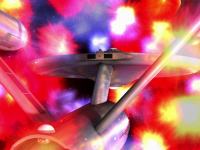
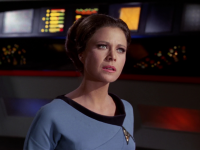
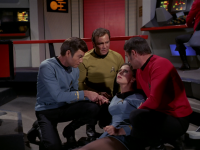
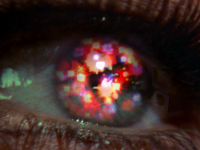
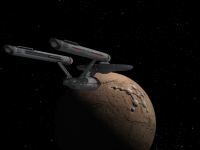
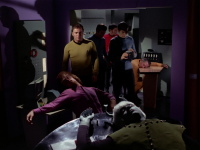
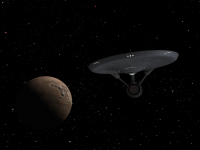
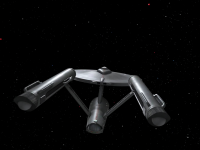
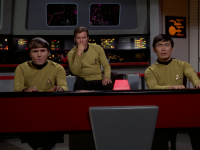
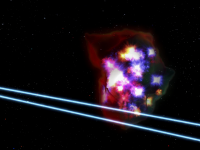
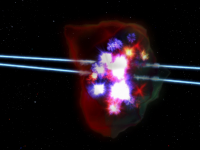
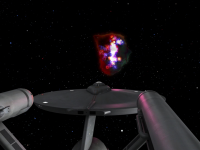
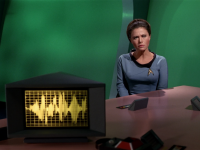
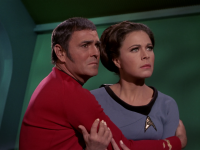
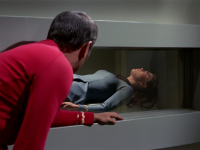
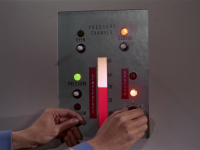
Star Trek TOS - 3x18 - The Lights of Zetar
Originally Aired: 1969-1-31
Synopsis:
Zetarians threaten Lieutenant Mira Romaine. [Blu-ray] [DVD]
Filler Quotient:
3, bad filler, totally skippable.
- Pretty lame episode with no significant long term continuity.
Problems
- Kirk claims no natural phenomenon can travel faster than the speed of light. What about tachyons?
- When the landing party reaches Memory Alpha, they complain about having beamed into darkness. But the room is actually quite well illuminated!
Factoids
- This episode confirms the figure from The Mark of Gideon that there are 430 people aboard the Enterprise at this time.
Remarkable Scenes
- Nurse Chapel making fun of Scotty.
- Kirk's impatience with Scotty's behavior.
- Kirk sticking Mira in the pressure chamber of doom.
My Review
Poor Scotty. He's such a terrific character, but for some reason episodes revolving around him always seem to suck. He and Mira were just insufferable together which wasn't helped by the fact that the show kept intercutting their boring scenes with the crisis situation. The climax of absurdity is Kirk calling a long conference room meeting in the middle of the ship being attacked by the entities in order to slowly and verbosely determine their next move. Kirk occasionally called the bridge to check in with Sulu and to make sure they weren't all seconds from destruction, but that doesn't really save it.
Likewise Kirk's reasoning for why he chose to toss Mira in the pressure chamber to kill the entities was terribly opaque. We have no idea exactly why Kirk thought the pressure chamber was the best move or why he thought it would even work in the first place. For all we know he was just guessing. Another area of opaque reasoning was Spock's rather hasty conclusion that the lights were an alien attack and not a natural phenomenon. Although perhaps by this point in the series Spock is as cynical as we are about the repetitive nature of the plots.
The concept of Memory Alpha as a central repository for all Federation knowledge is also a bit puzzling. Why would only one colony possess all the knowledge of the Federation? Computer data is easily copied. Why not maintain a number of these public space libraries, e.g. Memory Beta, Memory Gamma, Memory Delta, etc. Likewise since the galaxy appears to be filled with any number of hostile aliens, why not equip these crucial facilities with better defenses? At least Kirk seemed irritated with the fact that Memory Alpha lacked shields though.
The only part of the story with any real merit was the philosophy articulated by Kirk's line to the aliens, "the price of your survival is too high." He goes on to say that they are entitled to their own lives, but not that of others. In this short, but profound line Kirk articulates the philosophy of Star Trek quite eloquently. The Federation respects all life, but sometimes despite that respect for life you have to kill in order to survive. A better episode would have wrestled with the ethical implications of killing one sentient being to save another a bit more, but alas, this story lacked sufficient nuances to really do that.
The following are comments submitted by my readers.
- From Lt. Fitz on 2012-06-20 at 8:24pm:
Horrible episode. I had to watch it like 5 times to get through it without falling asleep. Even the actors looked bored. It looked like Kirk was falling asleep in the conference room. I still don't know why they figured that putting her in a pressure cooker would solve the problem of alien possession. And, what were those pressure cookers for, anyway? They use replicators for food. Thank goodness those otherwise useless devices were put on the ship.
- Kirk's intense whisper: "Pressure, Spock. Pressure." And, then: "Pressure."
- Bones: "The pressure's dangerously high, Captain!" Good writing. Glad that he said that to remind the audience that there is a threat in this snoozer of a plot.
- Spock: "We may tax Mr. Scott's patience, Doctor." That's OK. He's been taxing my patience the entire episode. - From James Ingalls on 2014-11-12 at 9:55pm:
What happened to the great screencaps in these last few episodes? - From Kethinov on 2014-11-13 at 5:41am:
This was the last episode I could get to before other projects unrelated to this site began consuming my time.
I actually do have a complete set of new 1080p screenshots to post for the rest of TOS and all the films, but I just haven't gotten around to putting them up yet.
Stay tuned, it will come! That, and a brand new completely updated design for this entire site is in the pipeline. :) - From jd_juggler on 2015-03-22 at 3:14pm:
Phasers are fired into the entity and Mira collapses in pain. Scotty reports to the bridge that just one more such shot would kill Mira. Kirk seems to believe this without question, without even any medical examination. Yet, having heard all this, Sulu STILL says "phasers ready for firing". At this point I usually audibly mutter at Sulu "you cold-hearted bastard!"
The aliens certainly must realize that putting Mira into that pressure chamber was an attempt to destroy them. So why didn't they leave Mira's body? The inhabitants of memory alpha were all killed; how did the crew of the enterprise escape this fate? - From Chris on 2019-01-13 at 2:13am:
If you ask me! ... and you didn't this episode just pissed me off from start to finish with Scott's insufferable attention to Mira at the expense of everyone else!!!
Starship Officers are allowed to act this way? EVER?!?!
Aside from the absolute nonsense bitched about in the other reviews, this episode was close to vomit inducing for me!
Hey! What happened to Karyn! - From Chris on 2019-01-17 at 2:00am:
If you ask me! ... and you didn't this episode just pissed me off from start to finish with Scott's insufferable attention to Mira at the expense of everyone else!!!
Starship Officers are allowed to act this way? EVER?!?!
Aside from the absolute nonsense bitched about in the other reviews, this episode was close to vomit inducing for me!
Hey! What happened to Karyn! - From Anan8 on 2020-10-18 at 2:03pm:
Take it easy on the "data is easily copied" comment. I was alive in 1966 and it was not easy to copy data, nor cheap. They may not have realized that some day we would have memory sticks and online data storage. We didn't even have good copiers until the '80s. Before that we used what was called a Mimeograph machine. Loved the smell, but they were a mess.
I never understood why the Zetarians just didn't escape the pressure chamber and move on. They easily penetrated the hull. Maybe they should have made the hull out of the material they made the pressure chamber.
And I can't figure out why they make Scotty look like a bumbling 7th grader when he's featured in an episode with women.

Star Trek Voy - 3x10 - Warlord
Originally Aired: 1996-11-20
Synopsis:
Kes' body is taken over by a ruthless political leader. [DVD]
Problems
None
Factoids
None
Remarkable Scenes
- Kes and Neelix adversarial date.
- Kes phasering people.
- Tieran using Kes' body to make Resh bleed Darth Vader style.
- Teiran's coup.
- Kes' personality surfacing in Teiran.
- Teiran discovering undercover Tuvok.
- Teiran using Kes' mental powers against Tuvok.
- Kes fighting Teiran's in his sleep.
- Teiran beginning to slip into insanity thanks to Kes' influence.
- Paris to Tuvok regarding the Vulcan neck pinch: "Some day you're gonna have to show me how to do that."
My Review
I like this one, for Jennifer Lien gives a spectacular performance playing possessed Kes, just as when Keiko was possessed in DS9: The Assignment. Moreover, the character of Teiran was nicely presented. Even better a character than the rather simplistic Pah-wraith on DS9. Also in this episode's favor was Janeway; she once again shows us how awesome a diplomat she is. Overall, a rare great Kes episode.
The following are comments submitted by my readers.
- From adam on 2010-09-23 at 10:24am:
Nice little homage to characterization and visual style of Dune. Probably the best 'possession' episode in Trek, but that's not saying much... - From Mike on 2017-07-09 at 1:36pm:
I think TNG: Power Play was pretty good too, with solid acting by Meaney, Sirtis and Spiner. But this one was very exciting and Lien was surprisingly awesome. I say surprisingly only because no other Kes focused episode came close to giving Lien the chance to act like this, so it was cool to see.
The only problem area I saw was that in the end, you have an infiltration assault on the palace involving Janeway, Chakotay, Neelix, and the alien prince. But no Starfleet security personnel? I doubt the ship's two senior leaders would charge in without at least a couple of other officers especially since they were outnumbered 2:1.

Originally Aired: 1998-5-6
Synopsis:
An alien species tries to populate its planet by duplicating the Voyager crew. [DVD]
Problems
- Why did Janeway wait so long to deal with the fuel problem?
- Deuterium is extremely common. The writers must have mistaken it for dilithium. It's quite an oversight though.
Factoids
- Class Y planets are referred to as "demon" class.
- This episode features another ship landing.
Remarkable Scenes
- The doctor complaining to Chakotay regarding Neelix and his "squatters" only to have Chakotay blow off his complaint.
- The ship landing.
- Torres: "Take Seven of Nine with you." Chakotay, surprised: "You're recommending her?" Torres: "You said you needed cool heads, didn't you? Nobody's head is cooler than hers."
- The doctor and Neelix fighting with one another.
- Chakotay: "Looks like they went this way." Seven: "My tricorder isn't picking up any life signs. How did you reach that conclusion?" Chakotay: "Footprints. I guess you never assimilated any Indian scouts."
My Review
This episode is full of logical and technical problems, but I won't waste my time pointing them all out, for its the premise itself which is flawed. It makes no sense that Voyager would suddenly develop severe power problems out of nowhere. Rather than waste so much time on pointless details that don't make any sense anyway, the writers could have created a situation which justified the sudden power loss. That said, the plot doesn't interest me much. Most of the episode's thrill value is supposed to come from the danger of the planet itself, a manufactured danger. The oddities produced by the sentient "silver blood" fail to enhance the plot, and the revelation regarding what exactly is going on is realized far too late. An interesting note, look at the StarTrek.com description of this episode and the previous one. An interesting coincidence?
The following are comments submitted by my readers.
- From Pete Miller on 2006-11-06 at 2:17am:
How is a class Y planet the "most inhospitable planet for humanoids"? At least it has a SURFACE! I mean there are plenty of planets that are solely gas giants and don't even have a solid surface. I would think that is more inhospitable than this class Y planet that simply has a bad atmosphere.
The Enterprise has saucer separation; Voyager has landing sequences. Janeway lands the ship WAY too damn much. She is extremely reckless.
The 'backup systems' in the environmental suits was a really cheap deus ex machina
I think it would have been pretty cool if the 'silver blood' was a colony of shapeshifters that had been dispersed here by the founders (as alluded to in ds9) and had made their home in the delta quadrant. Can you imagine the possibilities if Voyager had allied with some of the shapeshifters here and brought them back with them, only to find that the Federation had been at war with the Gamma Quadrant shapeshifters when they got back? Oh well. Just the dreams of a ds9 fan... - From TheAnt on 2013-10-12 at 6:19pm:
Harry gets a mudbath
Kethinov and Miller got it right, deuterium is not that horribly uncommon. And the planet itself only appear to be no worse than Venus.
Another detail I find unbelievable is that life support appear to take such an extreme amount of energy, we've heard it in other episodes also. As much as lasers, the warp drive and what's not.
In fact life support could only be a negligible amount compared to those systems - or to put it differently, several magnitudes less.
And so shutting down life support as here, and in a few other episodes should not make any significant contribution.
In short, you might skip this episode with extreme prejudice. Unless you're doing a study where ST loose track and derail completely. - From L on 2013-12-29 at 6:23am:
The basic concept would have been interesting in TOS, less so here. - From Alex on 2014-05-19 at 12:14am:
So Pete you wish that Voyager had brought back evidence of shapeshifters back from the delta quadrant.Personally the less Voyager had to do with a certain pile of overrated dog mess like DS9 the better,You can keep that rubbish. - From Dstyle on 2015-06-16 at 1:58pm:
Woah ho! Some fighting words from Alex!
I don't see why we need to see the build up to the power problems: that seems too nitpicky of a complaint and would have made for boring television. Things happen off-screen and between episodes all the time. I'd much rather be dropped into the story right at the point of dramatic tension than watch all the buildup. And honestly, Voyager needs more episodes like this: it's too much like TNG v2.0, with the whole "limited resources" thing taking a backseat to holodecks and frivolous side-trips and whatnot. Voyager's hulls needs scars and dents. It was refreshing to see them running in "gray mode" for once.
No, the real problem with the episode is it is poorly written. Janeway doesn't want to risk losing Chakotay by sending him down to the surface in a shuttle... so she decided to land the ship? (Seriously, writers, if you want to land the ship so badly just make it so their orbit was deteriorating and they didn't have power to correct it so they had no option. No captain in their right mind would put their entire crew at risk like that, and no officer on the bridge would ever let them) Then when the ship starts sinking into a mystery fluid on the surface, Janeway... goes to sickbay to check on Harry and Tom? C'mon Captain, your ship and everyone on it is in mortal peril: maybe you should be on the bridge trying to save them, i.e. DOING YOUR JOB.
In the hands of a better writer this premise could have made for a better than average episode, but, like Voyager in a pool of silver blood, this episode sank quickly. I'd rate it a 3.

Star Trek DS9 - 2x07 - Rules of Acquisition
Originally Aired: 1993-11-7
Synopsis:
A Ferengi female who has defied the law and disguised herself as a male risks it all when she falls in love with Quark. [DVD]
Filler Quotient:
0, not filler, do not skip this episode.
- This is the first episode in the Dominion War arc, strangely enough. This is also the episode that establishes the role of women in Ferengi society.
Problems
None
Factoids
- This is the first episode to show Ferengi playing Tongo.
- This episode establishes that there are 285 Rules of Acquisition and that in addition to memorizing them, Ferengi are encouraged to memorize the various official commentaries on them as well.
- This is the first episode to feature a female Ferengi.
- This episode establishes that Quark doesn't have all the Rules of Acquisition memorized. He didn't know rule 103.
Remarkable Scenes
- Rom describing how he likes his women: "Naked and submissive."
- Zek "negotiating" with Sisko and Kira.
- The revelation that Pel is a female Ferengi.
- Zek smacking Kira on the ass!
- Quark and Pel negotiating with the Dosi on Deep Space Nine.
- Zek's gift for Kira. I love Kira's ensuing insults about the Ferengi.
- Dax telling Pel about a supposed time when Quark recreated the bedroom she slept in as a child in the holosuite from memory of a conversation he overheard between Dax and Kira.
- Dax discovering Pel a female.
- Zek slapping Kira on the ass again!
- Pel's reaction to being forced to sleep with Quark.
- Zyree, the first to mention the Dominion.
- Zek's reaction seeing Pel a female.
- Rules of Acquisition: 21. Never place friendship above profit. 22. A wise man can hear profit in the wind. 33. It never hurts to suck up to the boss. 48. The bigger the smile the sharper the knife. 59. Free advice is seldom cheap. 67. The riskier the road the greater the profit. 103. Sleep can interfere with--(Pel is interrupted, we don't hear the rest. It might be "profit").
- Morn appearances; 1. Odo catches him sleeping on the promenade. When awakened and told to "go home," he goes to see if Quark's is open! 2. In the background behind Quark, Rom, and Pel. 3. Can be seen just after Odo and Rom talk about brothers.
My Review
Another episode to feature another smashing performance by Wallace Shawn as Zek. He's so funny. Quark and Rom are excellent Ferengi characters too, but something about Zek just strikes me as great. Everything about his character is just perfect for his role. All the nuances and all the little details add up to a most remarkable character. Additionally, Pel's secret love for Quark makes for most remarkable story. The Dosi are interesting as well; the Gamma Quadrant equivalent of the Ferengi with unfortunately terrible makeup. They make mention of an ominous sounding thing called the Dominion, which is alluded to as a major power in the gamma quadrant. It's nice to see the inhabitants of the gamma quadrant finally fleshed out a bit. They've certainly been sitting at the edge of the wormhole long enough for us to finally map out the place somewhat.
The following are comments submitted by my readers.
- From Pete Miller on 2006-05-22 at 3:31pm:
I'm surprised that eric didn't take off more for their dropping of the Dosi race, never to be seen again. - From Bernard on 2010-10-12 at 12:58pm:
Since revisiting Season One episode 'Nagus' and thinking it was one of the strongest episodes of that season I looked forward to revisiting this one. It didn't disappoint.
Simultaneously blending the exploration of more ferengi social structure, teasing out another tidbit about the dominion and creating a plot twist nicely, this episode is excellent.
I love the part where Pel is revealed and Zek cries out! Brilliant stuff. - From Wes on 2012-12-01 at 2:08pm:
Notice in the scene above the bar where Kira returns the earring to Zek and then Quark and Pel come up, that you can see the tape on the floor marking where Kira was supposed to stand. - From Dstyle on 2013-09-09 at 2:36am:
There were Pakleds at Quark's! I only wish we could have overheard a bit of their conversation. - From Dstyle on 2013-09-12 at 2:59pm:
I feel silly now that I got so excited about seeing Pakleds at Quark's: as I continue to watch this season, I've been seeing Pakleds all over the station. Perhaps they were around the station in the first season or earlier in the second season and I just didn't notice them, but I always love seeing them: they're such a fascinating and absurd species. What are they doing at DS9? Looking for things? Things they need? Things that make them go?

Star Trek Voy - 4x17 - Retrospect
Originally Aired: 1998-2-25
Synopsis:
Seven of Nine experiences repressed memories. [DVD]
Problems
None
Factoids
- The set for Kovin's craft was a reuse of the Federation time ship Aeon.
Remarkable Scenes
- The first scene depicting the test firing.
- Tom regarding the haggling session: "That guy's worse than a Ferengi."
- The experiment proving Kovin's innocence.
- The destruction of Kovin's ship.
My Review
Another episode depicting Seven of Nine having hallucinations and personal issues. Thanks to that, an innocent man dies and Voyager didn't get that really cool "isokinetic canon." And that's pretty much it. Seven of Nine and the doctor make a big mess, get someone killed, and Janeway forgives them. Aside from the remorseful ending, this episode is truly not in the spirit of Star Trek and I'm completely unfond of it.
The following are comments submitted by my readers.
- From Rick on 2013-07-16 at 10:36pm:
So Seven is Tawana Brawley and Doc is Al Sharpton except he eventually shows contrition and never does it again. I think that about sums up this episode. - From Inga on 2013-10-09 at 8:06am:
I think the idea of this episode is an interesting concept to explore in a TV show. Sure the ending is unsettling, but it shows the subject of pre-judgement vs objectivity, which, in my opinion, fits in Star Trek quite well. - From thaibites on 2014-08-23 at 10:56am:
"...this episode is truly not in the spirit of Star Trek and I'm completely unfond of it."
That's exactly why I liked it! This episode explores the darker side of our subconscious. It teaches the doctor a lesson in humbleness. And most importantly, it reinforces the previous episode where Seven is Janeway's counter balance - yin and yang. I don't know if this dynamic continues, but I hope it does. Seven is a kick-ass bitch, and Janeway needs her ass kicked sometimes. Chakotay is too nice and lame to really do it, even though he tries sometimes.
Seriously, who are you to judge what the "spirit of Star Trek" really is? TOS had a lot of dark episodes, like the one where Kirk is split into his good half and bad half. Try to think of Janeway/Seven in the same way. - From Dstyle on 2015-06-14 at 6:46pm:
I wonder if Janeway was able to keep the cannon?
Seriously, though, I thought this episode was awful. Sure the whole thing about repressed memories not being reliable was kind of interesting, but it was overshadowed by a far more troubling problem: namely, Seven effectively made a false rape accusation. The takeaway of this episode was that women should not be believed when they claim they were assaulted, because even if they themselves truly believe it happened that's still not necessarily reliable. It's a very frustrating and troubling message, for sure. - From QuasiGiani on 2017-08-11 at 3:22am:
Disturbing?
What is disturbing here is that what they discovered about the Borg nanoprobes regenerating disproved 7 Of 9's accusations. Yet, Janeway, the doctor ...and everyone else (even among the {re}viewers here) seems to believe it did. Terrible, disturbing lack of logic. Truly not in the spirit of Star Trek and I'm completely unfond of it.
- From QuasiGiani on 2017-08-12 at 5:17pm:
The comment I made was supposed to say:
"What is disturbing here is that what they discovered about the Borg nanoprobes regenerating IN NO WAY DISPROVED 7 Of 9's accusations. Yet, Janeway, the doctor ...and everyone else (even among the {re}viewers here) seems to believe it did. Terrible, disturbing lack of logic. Truly not in the spirit of Star Trek and I'm completely unfond of it." - From Pim on 2018-04-30 at 9:40pm:
Thank you QuasiGiani for pointing out that HUGE flaw in logic. The findings of that experiment may have been consistent with Koven’s story, but in no way proved or disproved either Koven’s or Seven’s claim. All evidence up to that point was still ‘inconclusive’. This is what’s really not in the spirit of Star Trek, it’s just bad science. Other than that I’d say this episode okayish. - From Turbo on 2020-06-22 at 7:11am:
Unlike seemingly a lot of other viewers I actually thought the episode was done rather well. It shows that decisions have actual gravitas, that emotional preoccupation may lead to misjudgment, and that misjudgment may lead to undeserved harm to others. There are far too many instances in Voyager otherwise where high risk decisions are kept unreflected because they lead to success by sheer luck, or where harm resulting from high risk decisions is seen as collateral or glanced off entirely. It's a nice change to actually see someone doing something wrong and having to live with the guilt.

Star Trek TNG - 3x01 - Evolution
Originally Aired: 1989-9-25
Synopsis:
A computer breakdown threatens the ship. [DVD]
Problems
None
Factoids
None
Remarkable Scenes
- The computer malfunctions were amusing.
- The ship spontaneously playing loud music.
- The experimenter doctor guy: "A brand new era in astrophysics postponed 196 years on account of rain."
- Wesley lashing out at his mother when she pounded him to take it easy.
- Data serving as a conduit for the nanites.
- Dr. Crusher observing Wesley at the end.
My Review
Dr. Crusher's return is refreshing, though I miss Pulaski. I thought Dr. Pulaski was a better character, but they never let her reach her full potential. Experimenter doctor guy's arrogance was annoying at times. Other times it was cool. His interactions with Wesley were especially annoying, but necessary as it served to validate Wesley's concerns about his causing the computer to break down. The nanites becoming intelligent was interesting and it was handled well. My personal favorite little detail is the fact that Wesley was only useful in discovering the problem, not formulating a solution. After all, he is still just a kid. Experimenter doctor guy's confrontation with Counselor Troi was eloquently done as well. But the ending was a little too perfect, rendering the episode largely inconsequential.
The following are comments submitted by my readers.
- From DSOmo on 2007-07-05 at 6:30am:
- Shortly after discovering that his nanites are missing, Wesley begins setting traps around the ship. In Ten-Forward he sets two traps approximately six feet apart behind the bar. Using this spacing would require thousands and thousands of traps. Does Wesley have thousands of traps to put out, or does he think the nanites like to hang out in bars? ;)
- When the nanites start pumping poisonous gas into the main bridge, Riker and Picard leave the ready room and join in the coughing with the rest of the bridge crew. Riker then walks up to the environmental controls. The atmosphere on the bridge returns to normal. Is Riker the only person who knew how to do this? Otherwise, everyone would just have sat in their chairs and coughed until they died.
- Given the attacks on the Enterprise by the nanites, it is difficult to believe that Picard would allow them to take over a bridge officer, especially one with the strength and intelligence of Data. (Worf is the only one who protests) - From djb on 2007-12-21 at 10:10am:
While the science behind the idea of two little nanites created by a student replicating themselves into something capable of taking over a starship computer leaves something to be desired, the main thing that upset me about this episode was the "neutron star" explosion at the end. The astronomy in this episode is just appalling.
First of all, it should have been called a white dwarf. A neutron star is, I believe, the remnant of a single star going supernova, and is very, very dense, and therefore small. Something like 50,000 times as small as our sun, in diameter. The type of situation in this episode is where a white dwarf is accreting material from a stellar companion. The result of such accretion is a periodic supernova.
Material expelled by a supernova travels fast, but not as fast as it does in this episode. It might travel up to a tenth the speed of light- about 30,000 Km per second, but that's optimistic. Given the estimation that the white dwarf and its companion are, say, a million km apart, it would take the explosion at least 33 seconds to reach as far as the other star. Also, at its brightest it would be about 5 billion times as bright as the sun, which at that immediate closeness would probably overload the ship's sensors (and shields) and instantly blind anyone looking out a window. What to speak of the effect the emanating heat and radiation would have on the ship and the crew. Marshmallows anyone?
They could have at least made the supernova look something like a supernova instead of a bomb explosion superimposed on the shot.
And, of course, there should be no sound to go with it, but we reality sticklers gave up the "no sound in space" argument with Star Trek a long time ago.
I know it's just a show, but I figure they could have made it look at least somewhat realistic. - From JRPoole on 2008-03-12 at 9:35pm:
Finally a good Wesley episode. I rather like this episode; the scientist is interesting and acted fairly well, Wesley finally gets an episode in which his wunderkind aesthetic sort of falls apart, and the whole package is done well.
My only beef with this episode is Picard's non-reaction to Wesley's delay in telling him about the nanites. By trying to capture them on his own when he'd already theorized they were causing the problem with the computers, he put the crew and the mission in jeopardy. Picard should have put the smack down on him then and there. - From KStrock on 2009-01-31 at 5:30pm:
When he comes to the bridge, Wes relieves a guy wearing the old style uniform from Seasons 1 & 2.
- From thaibites on 2010-09-25 at 1:32am:
This episode could've been really good if they would've focused more on interacting with the nanites and less on the visiting scientist. I think this episode has helped me focus on why I have a problem with TNG - the episodes are more about people and their emotions and less about scifi. It's kind of like "Soap Opera Trek" instead of Star Trek. The name of the episode is "Evolution", so why concentrate so much on the doctor and so little on the nanites? The nanites are the ones who have evolved so quickly into sentient life. Most of the show should've been the nanites talking through Data, instead of the scientist talking and talking and talking...
Another disappointing episode out of many disappointing episodes so far. I was hoping for big things from this season 3 opener. - From CAlexander on 2011-03-29 at 7:06pm:
This episode didn't impress me. Nothing I can pinpoint, it just seemed unsatisfying.
Amazing how Federation scientists are still struggling to replicate the work of Dr. Soong, but Wesley creates a sentient life form accidentally. But then, the same thing happened with the holodeck. Apparently Federation technology has reached a point where sentience will self-generate if just given a chance.
- From Jeff browning on 2011-09-26 at 5:44pm:
It is exceedingly strange that you show Problems: None. The scientific problems of the nanites are legion. Just a few:
1. How they communicate with each other? Data is infected with nanites, yet they continue to communicate with the collective mind. How? Radio? Subspace? Either way, how do devices with components the size of atoms develop transmitters and receivers?
2. What is the power source? Much is made on star trek concerning power, yet it ignored here? To pull off what the nanites do here would require a great deal of power.
3. The nanites effectively consume much of Enterprise's computer core. The problems created by this seem minor compared to what would happen in one of our current computers.
4. Evolution requires mutation. There must be a mechanism for this. Biological reproduction is sufficiently buggy to accommodate evolution. Copying a very simple device would provide no such mechanism.
5. Evolution also requires a life or death struggle to weed out the fit from the unfit. There is no apparent competition among the nanites to allow for an intelligent selection process, like that provided by biological evolution.
6. Somehow the nanites repair the Enterprise computer core. How? What raw materials were used? Given that the bulk of the Enterprise's computer has been converted into nanites, do they scrifice themselves to accomplish this? - From Ggen on 2012-03-06 at 8:34am:
Although I didn't much care for the scene in Nanites - and found their identification and targeting of the scientist unrealistic - I thought this episode was rather neat.
The scientist is an interesting and somewhat complex character - he's both likeable and irritating, arrogant and, with a little help, willing to admit mistakes...and I like the way he's dressed and how he carries himself... it's all appropriately scholarly, somehow...
More importantly, I like the basic premise. The idea behind the Nanites is deceptively original...the Nanites aren't just an artificial life form, but they are also *self-evolving* - self-creating, in a sense - and microscopic to boot. Any one of those on its own might not be all that interesting, but put them all together and it's sufficiently creative.
- - -
Not without a few problems, but with plenty of redeeming features to warrant the fan 6. - From Ggen on 2012-03-08 at 1:18am:
PS
Problem: Early in the episode Data says "there has not been a systems-wide technological failure on a starship in 79 years..." What about the Season 2 Iconian probe-related problems on board the Yamato? Especially given the outcome, I think that would certainly qualify... Maybe Data meant "spontaneous" technological failure, without identifiable external causes? - From Maurice Randle on 2015-12-02 at 2:31am:
I thought this was a solid episode, but my main gripe with this particular episode is that of the nanites. I know this is an old show, so iI cut the writers some slack, but considering the current trajectory of modern science/technology, one would think that they would have implemented nanotechnology centuries before the time period of the show and that it would be much more developed than just some school science experiment, but I digress. - From lordcheeto on 2017-08-02 at 5:36am:
Data is no Vulcan, but it is...illogical to conclude that the nanites were intelligent because life support had been attacked. - From Azalea Jane on 2021-07-27 at 5:32pm:
Dr. Stubbs: "I will share the feelings I wish to share." -- Full agreement. I don't like how Troi is written such that she just speaks out loud what others are feeling in front of third parties. It's one thing for her to do it one-on-one; then it's part of her job. But outside the counselor's office, people's thoughts--and feelings--are their own. Neither of the Trois seem to understand this, since with Betazoids there is no reason or way for people to hide their inner lives.
Glad they didn't do like in "Home Soil" and have the universal translator create some weird-sounding voice.

Star Trek DS9 - 7x06 - Treachery, Faith, and the Great River
Originally Aired: 1998-11-4
Synopsis:
Odo is lured to a secret meeting site, where he finds himself face to face with Weyoun, the Vorta leader of the enemy Dominion. [DVD]
Filler Quotient:
0, not filler, do not skip this episode.
- Numerous major long term plot threads are serviced here.
Problems
None
Factoids
- Weyoun 4 was murdered by his Jem'Hadar first in DS9: To the Death.
- Weyoun 5 died in a "transporter accident." Though whether or not it was an accident is questionable. Damar may have been involved.
- Weyoun 6 killed himself for his betraying the Dominion.
- This is the first episode to feature a Changeling suffering the effects of the disease which threatens their entire population. The female shapeshifter displays symptoms, which Damar points out. Additionally, Weyoun 6 also tells Odo of the sickness that's spread throughout the Great Link.
- This episode establishes that the Vorta sense of taste is extremely limited.
Remarkable Scenes
- The teaser, O'Brien's swamped with repairs and Weyoun is defecting...
- Odo: "Aren't you being a little paranoid?" Weyoun: "Of course I'm paranoid, everyone's trying to kill me."
- Odo: "I'm not sure the universe is ready for two Weyouns."
- Damar convincing Weyoun to attack Odo's Runabout.
- Nog explaining to O'Brien his network of trades.
- Weyoun betraying the Jem'Hadar allowing Odo to destroy one of their ships.
- Weyoun: "The Vorta used to be quite different from what we are today. We were forest dwellers. Small, timid, ape-like creatures living in hollowed out trees." Odo: "Eating nuts and berries..." Weyoun: "And living in fear of the many predators that would hunt us for food. One day, a wounded Changeling came stumbling through the forest fleeing from a mob of angry solids." Odo: "Why were they chasing him?" Weyoun: "What does it matter? Solids have always feared and mistrusted shapeshifters, you know that. Well, a family of Vorta hid the Changeling from his pursuers. And in exchange for saving his life, the Changeling promised the Vorta that one day we would be transformed into powerful beings. That we would become an important part of a great new empire that would stretch across the galaxy."
- Odo's "become the ice" strategy.
- The ice battle.
- Weyoun 6 committing suicide to save Odo.
- O'Brien relieved to see his trust in Nog was not misplaced.
- Rules of Acquisition; 168. Whisper your way to success.
My Review
Another spectacular episode which skillfully merges several plot threads. Weyoun 5 was murdered, Damar may have killed him. Weyoun 6 is defecting, and Damar and Weyoun 7 are trying to kill him. The founders are all dying from a serious illness, and finally we have the story on DS9 in which Nog is attempting to procure replacement parts for O'Brien. The various plot threads are woven together well, providing a more than sufficiently entertaining episode which has just the right mix between humor, action, danger, and drama. Overall, a brilliant outing.
The following are comments submitted by my readers.
- From Azduel on 2010-03-31 at 2:16am:
This is one of my favourite episodes ever. A 10/10! This episode gives an in depth look at the unwavering devotion of the Vorta to the Founders. The meta exploration into the relationship of the Vorta and the Founders is brilliantly conducted through Weyoun's interaction with Odo, where Weyoun's obvious jubilation of simply being in his presence Odo is depicted. This episode further exceeds my expectations with its unorthodox delivery of insight to one of my favourite antagonist powers, the Dominion, and one of my favourite antagonist characters, Weyoun. To top off this 'magnus opus' of DS9 season 7, 'stubborn old Odo' in the end gives Weyoun what he so desperately wants, his blessing. In the end, Odo's blessing of Weyoun 6 brings meaning to his existence. Bravo!
...and the side story is entertaining to boot, offering much needed comic relief to the intrigue and intensity of the Odo Weyoun study. - From MJ on 2011-03-03 at 6:33pm:
I enjoyed everything about this episode.
Jeffrey Combs has the role of a Vorta down so well it makes one wonder if he came up with the concept for the race. The smooth speaking delivery, the cautious, diplomatic language, the ability to feign sincerity in both word and expression, and unflinching devotion to the Founders...he does it all flawlessly.
This episode was an interesting twist for the Weyoun character, exploring whether his (or rather, Weyoun 6) doubt of the Founders is partly due to a cloning flaw, or if, despite their cloning, the Vorta are capable of questioning their gods. It also was a nice continuation of the very complex relationship Odo has with his people.
The subplot was a perfect balance to the main plot. Nog's skillful navigation of the "Great River" was hilarious and very...Ferengi-like. I guess there's a little Ferengi in all of us! - From hugo on 2013-02-28 at 6:46pm:
i understand it as all communication through the wormhole is cut off for the dominiom, including reinforcements.
Then - how do they know that the Great Link is contaminated?
Otherwise a great ep! - From spline on 2013-09-10 at 9:45am:
Hugo, Wayoun likely got the information from the female changeling that is on Cardassia at this time, who knows of the sickness because she is herself sick, and the extent of it due to information revealed later in the season... - From Axel on 2015-05-17 at 7:49am:
I enjoyed the Nog/O'Brien subplot immensely. Throughout much of TNG and DS9, the Ferengi obsession with profit has been portrayed in a negative light, and given Star Trek values, this is understandable. But here we have a situation where Ferengi skills prove highly useful, and it adds another dimension to their race. It was really imaginative on the part of the writers to add the "Material Continuum" element, giving the Ferengi some cultural depth. And, it's all done in a light and funny way that makes for an enjoyable storyline.
Alongside this, we get a better glimpse of the Vorta in this episode as well. We find out about their background, about their cloning process, and about their utter reverence for the Founders. Jeffrey Combs, who seems to have been born to play the role of a Vorta, again just nails it in this episode and shows his versatility by acting as both Weyoun clones. - From tigertooth on 2017-01-20 at 8:08pm:
This is another episode where I feel like the average rating is rigged. Most of the user ratings are quite high... except for the fact that there's over 100 zero votes.
You might think about dumping those zeros since it seems likely somebody spammed the rating. - From Kethinov on 2017-01-21 at 7:27pm:
There is a big update to the site coming in February and I will be doing exactly that among other things.

Star Trek Voy - 6x11 - Fair Haven
Originally Aired: 2000-1-12
Synopsis:
The crew enjoys the holodeck creation Fair Haven. [DVD]
Problems
- A big point is made about transferring energy from the holodecks to another ship system, yet in Voy: Parallax a big point is made about how you absolutely cannot do that under any circumstance. This isn't the first time an episode has contradicted this detail of Voy: Parallax, but I'm starting to wonder exactly why they keep doing this. Are we supposed to believe that they've modified the holodeck power systems such that now they can do this as well as believe they rebuild shuttles and manufacture photon torpedoes?
Factoids
None
Remarkable Scenes
- Janeway reprogramming Michael Sullivan.
- Tom, Harry, and Neelix unintentionally worsening Tuvok's space sickness.
- Tom: "You'd make a good barometer, Tuvok. Every time you get queasy, we go to red alert."
- Seven acing the rings tournament.
My Review
Not very interesting in the slightest. A lot of people complain about how every episode of Star Trek introduces a new dangerous situation and a new conflict; that at times it feels redundant or that we never get a sufficient feel for daily life aboard ship. However, this episode is deficient because of its distinct *lack* of any such contention. It's also annoying that in order to show an episode about the day to day life of the characters, there had to be some kind of space anomaly to stop the ship from moving first. That said, the main plot of this episode would have made a decent B plot for a more interesting episode and there were details about the setting and characters of Fair Haven that were quite charming. But ultimately it seemed to be a poor use of episode time.
The following are comments submitted by my readers.
- From L on 2014-01-26 at 4:33am:
"But I've broken the fifth commandment again!"
"Say ten Our Father's and call me in the morning."
The fifth commandment for catholics is 'thou shalt not kill'. Oh those wacky loveable Irish. - From Hugo on 2015-04-26 at 7:12pm:
What a total yawn-fest (watched this while waiting for my 2 y/o to fall asleep). Found it very hard to stay awake with this, nothing there to grab my attention. I think it needed a b-story, at least.

Originally Aired: 2002-4-3
Synopsis:
The crew is directed to a barren planet, where a derelict ship may be salvageable for supplies. But the crew quickly learns that rumors about the shipwreck being haunted may be true. [DVD]
Problems
- This episode further aggravates the holodeck invention date problem. See comments.
Factoids
- René Auberjonois, who played Odo on DS9, plays Ezral in this episode.
Remarkable Scenes
- T'Pol reminding Trip of his encounter on the Xyrillian ship.
- Trip: "What if she gets hurt? What are you going to do then, program up a holographic doctor?" Ah, if only Trip could see Voyager. ;)
My Review
A rehash of DS9: Shadowplay regarding living one's life in a holographic world, with a bit of DS9: Progress. Ezral is a lot like Mullibok. And the treatment of Liana is a lot like Vina from TOS: The Cage, or Kes on Voyager. I think the rehash-o-meter is going through the roof again! As a result, we have a most unremarkable episode. In some ways, annoying too. Ent: Unexpected aggravated the holodeck invention date problem enough, but this episode contributes to it even more. Not only do we have Trip experiencing a holographic system, but he's experiencing a holographic system with holographic people, along with his entire crew! That, and they get a long hard look at the technology too. Finally, unlike Ent: Unexpected, this episode doesn't even have an excuse to show this kind of plot. Like Ent: Civilization, it could have been done on any other Trek series much more appropriately. Given all these problems and the horribly slow plot, I must declare this episode as the second biggest disappointment of the show.
No fan commentary yet.

Star Trek TNG - 3x08 - The Price
Originally Aired: 1989-11-13
Synopsis:
Troi falls for a handsome dignitary. [DVD]
Problems
- When the empath guy is trying to intimidate Riker, Riker concludes the discussion by taking a final swig and saying "to the last mile." He then gets up and leaves the table, leaving his PADD.
- How could Troi tell that the daemon was lying? Betazoids can't read Ferengi.
Factoids
None
Remarkable Scenes
- Troi's frustration in the opening scene.
- The Ferengi entrance and subsequent scheming.
- Picard nominating Riker to become the Federation negotiator.
- The revelation that Troi's lover is quarter Betazoid.
- The revelation that the wormhole is not fixed at the exit aperture.
- The aerobic scene with Dr. Crusher and Troi.
- The look on the Ferengi's faces when the wormhole moved.
- Empath guy getting under Riker's skin. First by insulting his negotiating skills, then by insulting his rank, then by gloating about his affair with Troi!
My Review
This episode's premise is fascinating. A prospective stable wormhole in neutral space is discovered by a non Federation race and results in a power struggle for control of it by several independent bodies. The Ferengi involvement in this affair for once is in character and enjoyable, albeit still dreadfully idiotic. Troi's love affair was obnoxious. When Troi's lover empath guy defended his use of empathy for business to Troi, his argument was wholly hypocritical. First he said, "Everybody does this, I'm just better at it therefore it's okay." Then he said, "You do it to gain an advantage in situations of life and death. I just do it in business. Therefore you're less ethical." Uh, what? You either believe it's ethical or you don't. Don't go changing your argument on the fly. The sad thing is Troi just took it. Didn't even bother pointing out his hypocrisy. The ending amused me. Finding that the wormhole was neither stable nor were the Ferengi ever to return from the Delta quadrant was apt in many ways. It makes sense that Troi could figure out the foul play based on empath guy's feelings, but making it seem as though she could read the Ferengi was absurd. Overall this episode is one of the better and more memorable TNG installments, but its flaws are numerous and I must strike it down a few points consequently.
The following are comments submitted by my readers.
- From DSOmo on 2007-07-19 at 7:00am:
- At the very beginning of the episode, a tired Troi shuffles into her quarters. Troi gets paged by Picard. She reponds with "Now what?," sighs, and taps her communicator. A normal reaction from a person having a long and/or bad day. However, I have read, that Troi's badge tap was merely habitual, not necessary. When Picard called for Troi, the computer immediately connected Picard to Troi's room. So, the badge tap or communicator panel touch is unnecessary. This is the "answer" to all the communicator discrepancies. Removing the badge tap creates a problem. It obliterates a person's privacy. If this is true, Picard heard Troi's "Now what?" comment. This is a prime example of why "immediate connect" will not work. It's like a telephone that rings only once and then turns on a speakerphone so you can talk to the person on the other end.
- When Picard, Riker, and Data discuss the worm hole, Picard says it might be a "proverbial lemon." Data reacts with confusion to this statement. Yet in the episode "The Naked Now," Riker (after referring to a needle in a haystack and seeing Data's confusion) clarifies his analogy by saying, "I should have said, 'proverbial needle in a haystack.'" At this point, Data understands. Did Data lose his understanding of the word "proverbial" somewhere along the line?
- During Ral and Troi's intimate dinner, Ral puts his fork into the bowl in front of him and then draws the fork to his mouth, the fork has NOTHING on it! - From JRPoole on 2008-03-24 at 4:24pm:
Up to this point in the series, the Ferengi are terrible characters. They're broadly written, over-acted, and their actions seem so stupid and self-destructive that it's hard to believe they'd be capable of this level of technological sophistication. That said, I love the plot surrounding the wormhole in this episode. It's a fascinating concept.
My problem with this episoded is the subplot about Troi and the negotiator. The dialogue is straight out of a Harlequin romance novel, and it's hard to believe Troi would react this way. I found most of their scenes to be painfully embarrassing to watch. His turnaround at the end is also completely unbelievable. Uggh.
Had this episode focused on the intrigue surrounding the wormhole, it would have been above average, as is, it wallows in cliche. - From Rob on 2008-04-13 at 10:02pm:
Unless Troi actually says "I sense (blah-blah)" re: the Ferengi (and its been too long since I've watched this episode) then I would argue that knowing someone is lying doesn't have to necessarily be because of her empathic abilities. Troi is a trained counciler and part of her job would be to parse out when a patient is holding out on her with or without an empathic awareness of the client. She could have observed the body language of the Ferengi, sensed Ral's feelings toward the Ferengi and realized they were conspiring together, or done some deductive reasoning based on past experience dealing with the Ferengi. Like I say, it's been too long since I've watched the episode but it's possible that Troi could realize the Ferengi were lying without using her Betazoid abilities. Even humans have an empathic awareness of one another based on other's facial features, actions, body language, etc. and Troi would be trained to recognize these. - From online broker on 2009-09-26 at 9:56am:
I really like this episode, but one has to fast forward through the troi/ral scenes, they are just mindnumbing, dreadful. But the negotiations and the ferengi are wonderful. The followup of the voyager episode just tops it off. - From thaibites on 2010-11-27 at 12:41pm:
Soap opera Trek:TNG marches on...YUCK!
I need Borg. - From CAlexander on 2011-04-14 at 1:24am:
I have mixed feelings. The whole concept of negotiating for the wormhole was quite interesting, and the twist was clever and unexpected. On the other hand, the portrayal of Ral seems to achieve what it sets out to achieve, but I felt like I was watching a Lifetime movie about sexual predators.
- This episode opens a can of worms that I think is best left closed. It acts like the concept of an empathic negotiator is a novel situation with no well-established ethics. But gosh, doesn't the Federation have an entire planet of super-telepaths (Betazed)? The Federation ought to use telepaths for every important negotiation, not to mention trials, interrogations, and many other circumstances. Even if they don't do this for some reason, you would think everyone would be paranoid at every meeting that the other side might have snuck in some telepaths, and there would be protocols to deal with that, which Ral would run afoul of. Oh well, we shouldn't think too hard about such things.
- From EvanT on 2011-06-24 at 9:33pm:
"their actions seem so stupid and self-destructive that it's hard to believe they'd be capable of this level of technological sophistication."
Apparently, even the writers of the show caught on that and had the Ferengi admit in DS9 that they buy technology (e.g. Warp Drive) They've also made a point of showing that Ferengi scientists are rare later on (though, it's odd since there's obviously a lot of profit in new inventions, though perhaps not as effortless).
What I didn't care in this episode was how poorly the romance was delivered. I've seen the episode several time and the romance has never felt natural for a second. I don't mind that Troi was slightly out of character (that's the point of "coup de foudre" anyway), but it's obvious the idea is that she has the hots for this guy and tries to hold back and then gets swept up in the moment, but it comes off as if he's using the Jedi mind trick to get her to bed. It all feels...TOO rushed to be realistic.
To be fair, Sirtis acts out romantic scenes a lot better later on. Was it bad directing? Just a bad day for Sirtis? Too much material cramped in too little screen time?
On the bright side we got to see a pleasantly surprising appearance of Matt McCoy in Star Trek. - From domi on 2015-07-12 at 2:30am:
i believe Data was confused at the "lemon" part not the word "proverbial". - From Phil on 2016-02-13 at 7:22am:
Not that I think this episode was all that great, but I don't see the ethics argument as being particularly hypocritical. When he says "everyone does it" he is talking about using what you know about peoples' feelings, and when he says "you do it in matters of life and death" he is talking about *hiding* the fact that you are have empathic powers. - From Mike on 2017-08-14 at 12:22am:
I like Ral's character. He's a pretty interesting antagonist. On the one hand, he's cocky, slimy and brash. On the other hand, he's also got a good point when it comes to the use of his Betazoid empathic abilities. It's good that they show Troi at a loss when trying to differentiate between her services and his, because he's right. Of course, his methods ultimately backfire, but it doesn't take away from the fact that he presents an interesting challenge to the use of empathy in Federation dealings.
I like how things play out in the end, with Ral once again attempting to subvert the Federation by making a backhanded deal with the Ferengi. Although Trio sees through it, it's a nice way to present the denouement. - From JB on 2020-05-08 at 11:03am:
This was a very good episode right up until the poorly written final scene. Ral's penitence here is both inexplicable and unbelievable, completely out of character.
Throughout the whole episode, Ral is shown to be extremely confident, coldly calculating, and ruthless. His rebukes to Troi after she questions his ethics at dinner clearly demonstrate that he thinks her position is hypocritical and that he sees no problem with using his natural talents to their greatest effect.
Then, Troi calls him out in front of everyone, betraying his trust and attempting to scuttle his successful negotiation. And suddenly he sees the error of his ways??? "I'm very grateful for what you did...it's made me take a hard look at who I am. I don't like what I see....You could help me change. You could be my conscience." Give me a break. This is one of the worst scenes in all of TNG. - From Katie on 2020-08-19 at 7:54am:
I think Ral is the worst side character in all of TNG. What a creepy sociopathic jackass. His scenes with Troi are so disturbing. He’s a straight-up predator and they poorly portray it as a tragic love story instead. - From Azalea Jane on 2021-08-03 at 6:42pm:
Yeah, Ral is a total creep. I was quite disappointed that Troi fell for him so hard, though I also understand a bit of why she did. Being "out of control" when you're used to being in control can be quite exhilarating. (At least in some situations.) Falling in with people ultimately bad for us is certainly something humans are known to do.
What redeems this episode for me is the scene with Ral and Riker. Ral is getting under Riker's skin, but he goes too far and tries to get Riker jealous of his relationship with Troi.
"If you can bring some joy into Deanna's life, nothing would make me happier." I love Riker's and Troi's relationship. In polyamorous communities, being happy about your partners' other connections is called "compersion." Even though they're exes, they still care deeply for each other and want each other to be happy. If Riker *was* jealous, he did a good job at hiding it, because Ral seemed unsettled after that scene. Good!
And the nerve of the guy to ask Troi to give up her Starfleet commission and be his personal counselor/lover. What a narcissistic douchebag. Glad Troi told him off. Glad we don't see Ral again.

Originally Aired: 1997-1-29
Synopsis:
Janeway is trapped in a time loop. [DVD]
Problems
None
Factoids
None
Remarkable Scenes
- The repeating time loop.
- Everyone forgetting the time loop except Janeway.
- Janeway contracting the Vidiian Phage.
- The doctor attempting to euthanize Janeway.
- Janeway being disembodied.
- Janeway's dead father appearing.
- The memorial service.
- Janeway discovering what's really going on.
- Alien: "You're in a dangerous profession, captain, you face death every day. There'll be another time and I'll be waiting. Eventually you'll come into my matrix. And you will nourish me for a long long time." Janeway: "Go back to hell, coward."
My Review
First a repeating time loop TNG: Cause and Effect style. Then nobody remembers the time loop but Janeway. Then Janeway gets the Phage. Then the doctor tries to kill her. Then Janeway is disembodied TNG: The Next Phase style. Then Janeway's dead father appears and tells her she's dead. Then Janeway realizes she dreamt it all. I'm not sure this episode could get more random if it tried! There are mixed opinions about this of course. Some of the beginning is largely a waste of time, but it's done in such a nicely exciting way that I forgive it. Honestly, the episode gets better and better as it goes along. The teaser was a lousy shuttle crash. We've seen enough of those and they're not particularly remarkable stories. In the end we have an alien who seems to feed on consciousness playing a game of illusions with Janeway. In this respect, the episode is much like TOS: The Cage, which also made good use of illusions. Much like TNG: Where Silence Has Lease, I must say bravo to this episode for it's skillful waste of time. Filler with style.
The following are comments submitted by my readers.
- From Jenny on 2006-07-25 at 7:28pm:
I largly agree with our all powerful master reviewer man here. However, I do NOT think this is a time-waster, however skill full yet random it is. I think the time loop, humour and touching memorial sequence work very well together and are very interesting. I found this surprisingly emotional, actually.The part When Janeway is strangled is really carried of well- and I did feel quite distressed. Also- the memorial scene and the stuff leading up to it was very moving- eventhough you knew the captain was really alive. ( unlike the irritating sequence in 'Resolutions' where the crew acted as if Janeway would never come back- but you knew she would anyway cos there was still another 5 seasons to do).
All in all an enjiyable, touching episode. - From Hugo on 2013-11-08 at 2:13am:
Is it just me, bit I don't get what the time loops and the phage had to do with the odd alien...
Also, the alien, what was he, a spirit just floating around? They could detect him on the tricorders, but only when he was active...? And this alien had no material substance at all? - From thaibites on 2014-03-28 at 12:27pm:
I ended up liking this episode a lot. There was a point in the middle where it got a bit too sentimental for me, but the ending really justified all the sentimentality and launched this episode into the upper echelon of Voyager episodes. Well done! - From The Spirits of Obummer on 2022-02-14 at 8:29am:
I was wondering, why was Janeway so skeptical all the time?
Only a couple of episodes earlier she learned that she should just believe everything "spirits" tell her, and then they cure death ^^

Star Trek TOS - 3x22 - The Savage Curtain
Originally Aired: 1969-3-7
Synopsis:
Kirk and Spock are forced into a battle of good and evil. [Blu-ray] [DVD]
Problems
None
Factoids
None
Remarkable Scenes
- Abraham Lincoln floating in space. WTF?
- Uhura not taking offense to Lincoln's accidental racist remark.
- Spock correcting Scotty when he pointed to the direction Earth was in. Hilarious!
- Surak's appearance.
- Surak: "Perhaps it is our belief in peace that is actually being tested."
- Lincoln: "There's no honorable way to kill, no gentle way to destroy. There is nothing good in war except its ending."
My Review
One wonders how much respect an ancient revered European leader like Sir Winston Churchill or an Asian leader like Mohandas Karamchand Gandhi would get on this most blatant episode of Americans in space. Thankfully, McCoy's and Scotty's objections offset Kirk's odd behavior. Unfortunately, yet another alien who forces our cast to fight for its own amusement. One remarkable detail is that Kahless is considered evil in this episode. In TNG he is considered quite the honorable figure. This isn't necessarily a technical problem; surely the Klingons are considered evil by Kirk, and the alien in this episode just extracted that impression in his recreation of Kahless. Ultimately, this episode consists largely of pointless fighting which makes it totally inconsequential. I wish there was less of this in Star Trek.
The following are comments submitted by my readers.
- From TashaYar on 2008-09-15 at 4:38am:
I just saw this ep again the other day... interestingly they address your objection. In the transporter room, Scotty in his dress uniform says something about rendering honors to "Lincoln" and asks who will be next, will it be Robert the Bruce. Kirk enters at this point, having overheard the remark, and replies "in that case we will render appropriate honors to him as well." For further details see "http://startrek.wikia.com/wiki/Robert_the_Bruce" - From technobabble on 2010-11-22 at 9:48pm:
Seemed odd that the aliens did not understand the good vs evil moral dynamic of the human condition but chose to interpret it only through small bout of combat. If they could use the ship's library etc. to replicate important historical figures could they not also sift through historical analysis?
Aliens seemed only interested in the brute strength of the two moral philosophies & dismissed the rest, making the story only about the contention that good & evil have to function similarly in times of war, offering the peace laurel at the wrong time can just leave you dead.
Points for showing a unique alien this time, made of scalding volcanic living rock.
- From Orion Pimpdaddy on 2012-05-27 at 11:11pm:
It's the Hunger Games! LOL The fight ends very prematurely, probably because they stuffed too much into a one hour show. They probably could have scrapped the whole "Lincoln walking around the Enterprise" bit in order to show a more complete battle on the surface. Still, it's not a bad episode. I thought the pacing was perfect, and the lava being's costume is the best costume of TOS. On the Blu-ray version, the planet's new appearance enhances the episode quite a bit. There's a part where a section of the lava planet changes to earthlike conditions, and it is now clearly seen. I'm not sure why the creature created such a large arena for everyone to fight in though (thousands of miles). - From Warp factor 10.1 on 2012-07-19 at 11:11pm:
I love it when superior beings abduct different species from around the galaxy to pit them against one another, as in 'Gamesters'. It's just what superior beings ought to do and why the other series aren't as good (they seem to have given it up).
Like you, I'm puzzled by the choices for the two sides. What about Hitler, Margaret Thatcher or Dick Dastardly for the baddies? - From Jake on 2019-01-11 at 2:11am:
This episode further confuses the Klingon forehead issue by showing Kahles as a TOS style klingon.

Star Trek Voy - 5x04 - In the Flesh
Originally Aired: 1998-11-4
Synopsis:
Voyager makes a disturbing discovery. [DVD]
Problems
- Species 8472 got a few things wrong in their Starfleet Headquarters recreation. The uniforms were outdated, and there were multiple Ferengi in Starfleet. (Nog from DS9 is the only Ferengi in Starfleet...)
- Janeway orders Voyager to charge weapons twice.
Factoids
- The fake Starfleet headquarters was created using a combination of holographic generators and the previously mentioned "particle synthesis" from Voy: Hope and Fear.
Remarkable Scenes
- Boothby appearance.
- The discovery that species 8472 is behind the training facility.
- The doctor: "Talk about a wolf in sheep's clothing."
- The doctor: "Throughout human history, weapons of mass destruction were designed in the hopes that they would never be used." Seven: "And yet in Earth's third world war, nuclear weapons accounted for 600 million casualties."
- Paris: "It's a date! These things can't be rushed. They've probably just finished dinner, a couple of drinks, and now they are moving past the polite stage." Kim: "The polite stage? The last 8472 I met tried to dissolve me from the inside out!"
- The "class reunion."
- Boothby: "Sit down, Admiral." Bullock: "Sir?" Boothby: "I said sit down, or I'll knock you right on your human butt!"
My Review
Another episode tying up another loose end. We never quite knew how species 8472 was going to react to losing the war with the Borg due to the Federation's help, and now we know. It seems they've built training facilities in which they are training operatives to infiltrate Earth. This was a nice opportunity to show us Starfleet Command for the first time since DS9 and TNG, as well as to bring back the beloved Boothby. He's only been in a few episodes so far, but each time used well. I liked the statement regarding Boothby having given valuable advice to all the captains in Starfleet, including Picard, which is a nice reference to TNG. That said, this episode is a bit annoying. While it is true to the spirit of Star Trek, it reeks of the writers saying, "well, let's wrap up this 8472 thing." But they didn't in fact wrap it up. The ending is *almost* a cliffhanger as there is still room for further conflict. I hate it when writers use this kind of cop out. This plot thread is wrapped up, but not! Additionally, 8472 seemed vastly out of character in this episode. This can be attributed to their "think human, be human" attitude, but again, it reeks of a cop out. Overall, disappointing.
The following are comments submitted by my readers.
- From Bron on 2013-11-19 at 4:56am:
Not sure if it's a "problem" that there's multiple Ferengi in Starfleet, since they're still learning about the Alpha Quadrant-they can get some of the details wrong and be consistent.
I agree with your assessment, though I think your grade is a little too generous. This is a 2 or a 3. 8472 had a lot more story potential than this, but isn't that always the case when it comes to Voyager? Setting up plots and adventures with poential and failing to realize them, that's the legacy of Voyager.
I guess the idea was to do an 8472 episode without having to do SFX shots every time they were on screen, thus saving money. But then they have to recreate the whole Starfleet Academy set, you still end up doing an effects shot at some they, and in the end, they've written them completely out of character and inconsistent. I don't mind "wrapping up" the plot thread, and I don't mind that they came to a peaceful resolution, but the road toward it did not flow logically. For one, at some point, Species 8472 is going to say, "Hey, stop calling us by that Borg designation, we're called Twileans" or something to that extent.
The whole subplot where they recreated Starfleet academy...that's a cool image and makes for a nice teaser, but it feels out of place in this plot. Earth shouldn't factor into this at all. There's many reasons that it's kind of silly, but from a dramatic standpoint, it makes more sense if it's only Voyager they're specifically antagonistic toward. Voyager is much more alone, vulnerable, and easily threatened by them, and it's the only ship they've interacted with. Bringing earth into it adds an element that hasn't been previously justified by the story in any way. But once earth came into it and the writers established that 8472 was AWARE of earth, they were forced into a pat TV ending where everyone shakes hands at the end, or else we would be left wondering if they were busy invading earth while we were stuck watching Janeway. If the dispute remained solely between Voyager and 8472, the threat is not only more personal, they'd have at least had the option to end on an ambiguous note. They agree on some things, maintain some disagreements, but go their separate ways for now with this potential looming threat remaining. - From pbench on 2015-09-11 at 8:45am:
previous poster is right. lots of potential but the same old voyager mediocrity. doesn't stop me from being addicted, but boy am i an ungrateful addict.
i digress. ultimately i was shocked that they took 8472 so out of character. and then blatantly lifted from the ds9 dominion plotline??? am i wrong that these were on at the same time?? come on, two species with the exact same plan? but yeah--my take was that 8472 were higher-order beings, to the point where verbal communication itself was almost beneath them. even as they are 'practicing' to be human they just come off as very...well, human, and not at all like this grand powerful species. what are they doing hanging out in this dimension anyway?
so yeah the episode was contrived. for some reason at the opener i hoped it was about chakotay's past and how he became maquis. - From Mike on 2017-07-28 at 1:26am:
Pon Farr night at the Vulcan Club? This has to be the result of Species 8472 misapplying some of what they learned about Vulcan culture. Otherwise, if such a place existed, no one in Starfleet HQ would get any work done, ever.
This episode is kind of eerie, in a way. They are having these conversations with people who look and act like Starfleet officers, but are members of the ominous Species 8472. Since the only communication with that species was telepathically through Seven, it was a bit off-putting to hear their normal, "human" conversation. I think I liked them better when they were shrieking praying mantis apex predators in bio-ships. But, the episode, on its own, is a pretty good one. - From Mitchell O on 2023-09-14 at 1:40pm:
I feel like there is an additional problem that could be added to that section.
During negotiations with species 8472, message in contact with Earth over four years, which isn’t true.
They first made contact when the doctor travelled to the USS Prometheus, and the second when Starfleet replied later in the season.
I would be very surprised if the doctor didn’t make Starfleet aware of a 8472 during his visit to the Alpha Quadrant considering the threat they pose.

Star Trek DS9 - 7x15 - Badda-Bing Badda-Bang
Originally Aired: 1999-2-24
Synopsis:
Vic's is about to be taken over by the heavy-handed mobster Frankie Eyes. [DVD]
Filler Quotient:
3, bad filler, totally skippable.
- This episode feels like it was plucked out of season one's roster of filler and dropped here accidentally.
Problems
None
Factoids
None
Remarkable Scenes
- Odo stretching out his arm to impress the bar flies.
- I like Bashir's line in which he says he wants his martini "stirred, not shaken," the opposite of what James Bond likes. ;)
- Morn Appearances; 1. Watches as the senior staff enters Quark's to execute their little robbery operation.
My Review
Even worse than DS9: It's Only a Paper Moon, we have another Vic Fontaine episode, but this time there's not even an excuse for Vic's inclusion in the plot. He is the center of the plot. The episode is entertaining, and the light hearted comedy is effective, but the timing is absolutely wrong. An episode like this should have been done in the vast wastelands that were season one, or another one of the seasons filled with filler episodes. The middle of the Dominion war is no time for filler.
The following are comments submitted by my readers.
- From Pete Miller on 2006-07-26 at 3:15am:
I think your dislike for Vic Fontaine is obscuring your judgement here. If the reason for giving this a 1 was that it is filler in the middle of the dominion war, then you should have given "Take Me Out to the Holosuite" a 1 instead of a 10. This episode is extremely entertaining, and is a wonderful use of Vic's character. Obviously they couldn't have done this episode EARLIER because they invented Vic during the Dominion War arc.
I especially like that this episode demonstrates that the characters still have personal lives amidst all the turmoil, and that they can still have fun. I wouldn't care for episodes 15 and on to be solely dominion war arc episodes. That would be boring, and not Star Trekish enough.
Sisko's comment about black people in the sixties also shows that this episode isn't just filler. Not only does it make a point about racism in the sixties; it also shows how hypersensitive Sisko is to anything regarding racism. Great character development episode all around, and it's always fun to watch one of these holodeck malfunction episodes. I love them!
Just because you didn't care for it isn't justification to give it a 1. I mean, come on. It's not THAT bad, even if you hate it. - From Kethinov on 2006-07-26 at 6:46am:
This episode fails to measure up to "Take Me Out to the Holosuite" in a number of ways.
Firstly, it was redundant. We already have a comedy episode in the holodeck in this season. I forgave it once, and only because "Take Me Out to the Holosuite" was so unusually profound.
But more importantly, this episode was inferior. The situation in this episode was a result of either holosuite error, or simple diversion, depending on how you look at it. Neither situation is a good premise for the episode. In the middle of the Dominion War, I don't want a "holodeck malfunctions" episode, and I even less want a "let's all go to Risa" episode. This episode was an excuse for slapstick comedy.
Conversely, the situation in "Take Me Out to the Holosuite" was brought on by an external player (the Vulcan captain) with an arrogance problem. Sisko didn't ask for any of this, he simply faced it. And it taught him a lesson about the value of one's principles, reinforcing his seemingly weaker hand in the entire Dominion war.
Ignoring the timing of this episode, yes, it deserves a higher rating. But as is so often said, timing is everything. This episode's timing was unforgivable. Such diversions are only acceptable when an episode has something truly profound to say, and guess what, everything it had to say was said better in other episodes!
You speak of the crew having a personal life. Well, we're made aware of that in "Take Me Out to the Holosuite." We're also made aware of it by Vic's various cameos across the later episodes. You also speak of the episode making a statement about racism. But that was easily done better in "Far Beyond the Stars."
Fnally, yes, I am fully aware of when Vic's character was created. That doesn't justify the episode's placement in the timeline and certainly doesn't invalidate my criticism that an episode like this was better suited in an early season. The episode had plenty of intrinsic value. Replace Vic with any other hologram, rebrand an early season episode, and not only is it now a good episode, it's better because it's less out of place.
And that's just how it is. "Badda-Bing Badda-Bang" was filler of the worst kind. It's underserving of a zero solely because it has no technical problems. It sure would have been worth more points in an earlier season, but alas, it's smack dab in the middle of season 7. So there you have it. - From Pete Miller on 2006-07-27 at 2:46am:
I was very pleased that you responded to my commentary, and I'll have to say you cleared it up a bit for me. I will concede that the timing does lower the rating substantially. And you're right, some of the character development-type things are covered in other episodes, so I guess this one is dispensable in that manner as well.
I still hold that it doesn't deserve a 1, because it isn't as horrible as something like "Move Along Home", but I take back what I said about your rating being based on your dislike for Vic. I see your point about the timing, but I guess it's just a matter of how important that kind of thing is to you. If you hold sequence and timing of episodes in high regards, then I guess a 1 could be appropriate. For me, however, a 5 is more like it.
But thanks for the response. Always awesome to hear different viewpoints on Star Trek!!! - From Kevin on 2009-06-07 at 2:06pm:
One of my least favourite DS9 episodes for sure. The Vic Fontaine character was a fun novelty for one episode, but has certainly worn his welcome by this point. Now we have a whole episode about him? Also, holodeck malfuntions of any kind are so cliche. Vic Fontaine and holodeck malfunctions... guess the writers were feeling really lazy that week. (Or were simply bad writers) - From Remco on 2009-08-01 at 3:43pm:
I guess your enjoyment of this episode really depends on whether you like Vic. The same was true for "Take Me Out to the Holosuite". To enjoy that episode, you needed to enjoy baseball.
I absolutely hated "Take Me Out", because I find watching baseball (or watching any sports) utterly boring. I skipped through most of the episode, and I wasn't entertained by all the sports movie cliches. I know that they were deliberately paying homage to such movies, but I just couldn't stand it.
Because of that experience, I can completely understand your sentiment in giving this a 1 while giving "Take Me Out" a 10, even though they are essentially the same episode. That's an aspect of ratings, which makes averages meaningless. I would give this episode a 7 for being a very entertaining, if not very relevant episode. A rating I would have given "Take Me Out" if I wasn't so completely bored by it. - From rpeh on 2010-08-05 at 11:55am:
I think everyone is being harsh on this episode.
It's true that the timing isn't ideal, I don't particularly like Vic Fontaine either, and I don't particularly like holodesk episodes, but beyond that it's probably my favourite holodesk episode.
One thing you all seem to have missed is that it's *not* a holodesk malfunction - we're told that Felix designed the takeover to stop the program from getting boring. The way all the senior staff (bar Worf) get into the spirit of things for a hologram shows their spirit of friendship to great effect, and the way they resolve the situation is well-done and a lot of fun.
I'm only giving this a 4, but I felt I had to speak up for this episode because of all the vitriol it's received up until now!
One extra little thing. The "stirred, not shaken" point was picked up in the West Wing too, where the president points out that shaking a martini would chip the ice so Bond was really "ordering a weak martini and being snooty about it". Perhaps Bashir is a *real* man? - From Psycroptic on 2012-07-20 at 12:41am:
The timing was definitely not right, but it was still an extremely entertaining episode. - From Bronn on 2013-07-29 at 6:15am:
I actually really liked this episode. "It's Only a Paper Moon" is a personal favorite of mine because I see a lot of myself in Nog in that episode. He escapes into a fantasy world because the real world is really tough and scary, and he's faced it for the first time. But I like that it's not really a holodeck malfunction episode, because those are tired and stupid. It's just a holodeck story in which they have to solve in a holodeck manner, and nothing is at stake except for Vic Fontaine's program.
I don't know where else they could have timed it, though. They wanted one last bit of fluff before they got back to the serious war plot to close out the series. The problem is that the war plot has been sitting ignored for too long-the last episode that really dealt with it was "Paper Moon"...which was also the last Vic episode. They wanted to introduce Vic as a recurring character, so it seems like he gets shoved down the audience's throat a bit. And the episode in which he introduced was a fluff episode in which they used musical numbers basically as filler, not a good way to introduce him to the audience.
This episode had to take place after "Paper Moon," because that's the only episode when the audience really started to care about Vic-if at all. It would have been nice if "Paper Moon" hadn't been so recent, since it was an episode in which two non-regular cast members were at the center of the plot, which might be why some people were irritated about it. What they needed was a good stand-alone episode involving the war plot to air prior to this episode just to let the audience know that they hadn't gotten distracted. We probably could have done with "Prodigal Daughter" or "The Emperor's New Cloak" or "Chimera" and still had a solid season. If it were me, though, I'd have pushed back "Once More Into the Breach," Kor's last episode, and aired it just before this one. That was another one which didn't prominently feature the main cast members, but then you follow with this one, in which most of the main cast gets to operate together. It would have kept the war fresh, and I don't think people would have been as irritated at the war plot settling into the background for just one episode here. - From L on 2013-08-18 at 12:16am:
A pointless novelty episode that made me cringe.
Not that a 'caper' genre episode was necessarily a bad thing, but I just hated it. Maybe it was just the context of it coming this late in the series, and that the one before it actually explored some interesting issues through science-fiction, as Star Trek should.
This is just pointless indulgence in bad-taste americana. - From spline on 2013-09-14 at 11:17am:
This ep was great. It wouldnt work in an earlier season because we'd have had no connection to the characters. It's a simply fun ep that allows the cast to show off, combined with great music and great direction. Dont take it so seriously, and just love it for what it is!
The best is yet to come! - From mandeponium on 2014-08-03 at 12:04am:
This was actually one of my favorites. I watch it as a farewell episode: the last fun holodeck romp before the final episodes running-up to the series finale. The end of this one gives me tingles when they are all alone in the lounge with Vic. They are still dressed up and as the camera pans over them Sisko sings "The Best Is Yet to Come."
The viewer knows DS9 is almost over. This is such a hopeful episode and the second half of the season does not disappoint. They even copy the lounge scene in the last episode doing it all over again with Vic and the final farewell. - From Axel on 2015-06-07 at 10:54pm:
I don't see the appeal of Vic Fontaine. He was okay in "It's Only a Paper Moon" because that story served a purpose: Nog's post-injury recovery. But he's overused to the point of being annoying. It gets really bad in the finale when he takes up a ridiculous portion of the episode.
This one, though, is bad for several reasons. They already had a wonderful holodeck episode in "Mr Bashir, I Presume?" So that angle's been done. The timing in the story arc is also poor as pointed out. Not everything has to be about the Dominion War, but this is just too silly. Finally, it doesn't even really feel like Star Trek. From a purely entertainment point of view, I guess it works but it's hard to ignore the context of the episode, which you have to do to enjoy it IMO.
I'd give it a 2 for the acting, but it's by far the worst overall episode of the season. - From ChristopherA on 2021-06-13 at 4:35pm:
I really didn't much like watching this episode, and I wasn't quite sure why. There have been holosuite episodes I've liked in the past, the caper itself really isn't bad. I agree with others that the timing of the episode just didn't seem very good, while watching the series in order I was really feeling like it was time to return to the Dominion war, not to have yet another offbeat standalone episode.
I agree with Axel that the episode really doesn't seem connected to Star Trek, and the episode doesn't compare that well to “Mr. Bashir, I Presume”. Somehow that episode felt like the homage was more fun, and felt like you were exploring the Star Trek characters placed in an unusual environment. Whereas this episode felt more like you were watching an ordinary miniature heist movie that just happened to feature the Star Trek actors, but could have been put on with any actors and it wouldn't have been any different. The only attempt to tie it to DS9 at all was the idea that they were coming together to do it for their friend Vic, which really didn't come across as a very dramatically interesting reason, especially since Vic is kind of a questionable character to begin with, and because the show seems unable to clearly confront the question about whether Vic is a sentient being or not. If he is sentient why are the characters so unable to perceive or acknowledge it, and if he is not sentient then the justification for the episode is pretty silly.
Also, in all of the better Vic Fontaine episodes he is being used to significantly change the lives of the DS9 characters by offering them good advice or a different perspective. In this episode he seems totally pointless, he doesn't have any purpose other than to act as a MacGuffin to get the characters into a heist movie.
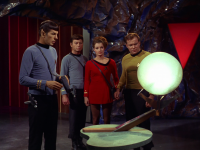
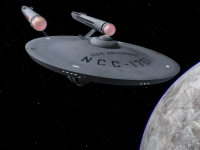
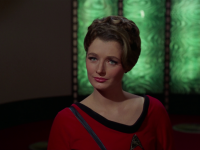

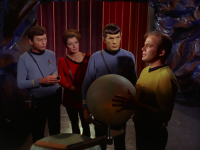
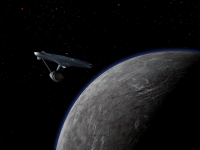
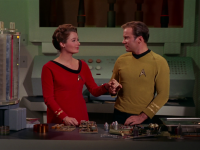
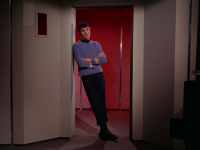
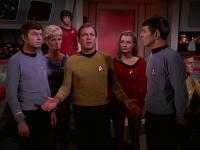

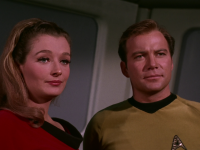
Star Trek TOS - 2x20 - Return to Tomorrow
Originally Aired: 1968-2-9
Synopsis:
Telepathic aliens take over Kirk and Spock's bodies. [Blu-ray] [DVD]
Filler Quotient:
2, filler, but an enjoyable episode nevertheless. You can skip this one, but you'd miss out on some fun.
- There's no essential plot or exposition in this episode that renders it unskippable, but it's a decent episode, even though it could have been better.
Problems
- It is claimed that Sargon's planet is class M, but it is also established that it no longer possesses an atmosphere. Since the designation of class M has been consistently reserved for Earth-like planets, it would seem to be a continuity error that a planet can be regarded as class M despite no longer possessing an atmosphere, even if it at one time did possess Earth-like qualities.
Factoids
- This episode in some ways rationalizes the problem of why so many aliens look so much like humans by heavily implying that Sargon's race seeded humanoid life throughout much of the galaxy 600,000 years ago.
- This episode and its writer, John T. Dugan, were nominated for a Writers Guild of America Award for Best Written Dramatic Episode in 1968.
- Kirk states in this episode that the U.S. Apollo program successfully reached the moon, a remarkable statement given the fact that at the time this script was written, the feat had not yet been achieved.
Remarkable Scenes
- Scotty: "You could materialize inside solid rock!"
- McCoy's terror regarding the transporter.
- Kirk: "We faced a crisis in our earlier nuclear age. We found the wisdom not to destroy ourselves."
- Sargon: "There comes to all races an ultimate crisis which you have yet to face."
- Kirk's speech about extending goodwill to this potentially dangerous alien species; calling for volunteers rather than ordering people to participate.
- Possessed Spock getting all emotional.
- Possessed Spock to McCoy: "I'm surprised the Vulcans never conquered your race!"
- Possessed Spock using a Vulcan mind meld to manipulate Nurse Chapel.
My Review
In this leg of the Enterprise's five year mission while having traveled hundreds of light years farther than any Federation starship has ever traveled before, Captain Kirk and his crew happen upon a most unusual discovery: the remnants of an alien race which colonized the galaxy 600,000 years ago, possibly even seeding life itself on both Earth and Vulcan! This little bit of exposition goes a long way towards rationalizing the problem of why so many aliens look so much like humans on Star Trek, so as you might imagine this episode has earned some bonus points from me for that. Unfortunately, the crew regards this bit of exposition with little more than a "gee whiz" response, so the impact is somewhat less than what I'd have preferred, dramatically. Nevertheless, the episode's main focus still has much to offer.
At first glance this episode seems to start off as yet another "godlike alien takes the crew hostage" story, but fortunately the episode rises above this cliche rather quickly by establishing these particular godlike aliens as remarkably benevolent. All except for the amusingly evil one that inhabited Spock, anyway. Shortly after the first encounter, I couldn't help but join in Kirk's enthusiastic optimism for aliens of the week that were outwardly cooperative and not hostile during his motivational speech to the crew, soliciting volunteers in extending a helping hand to the aliens in the hopes of forming a fruitful alliance. In a universe where godlike aliens seem overly plentiful and nearly always mad with power, this was a refreshing change of pace.
Likewise, at first I was worried that the evil alien inhabiting Spock would ruin the overall likability of the aliens of the week, but thankfully Leonard Nimoy's delightfully Machiavellian performance and the refreshingly amoral writing for the character saved the day by at least making our cliched antagonist suitably amusing, while giving rise to well utilized opportunities for the plot to exploit Chapel's attraction to Spock for both comic relief when inhabited Spock compliments the poor nurse as well dramatic appeal when Spock's consciousness is literally hidden within Chapel's body, much to her overt satisfaction.
Unfortunately, at least one too many such misdirections pile up by the end of the episode. Combine that with the fact that the "godlike alien takes the crew hostage" premise rarely yields a very good story to begin with no matter how well executed it is and the fact that the ending wrapped things up way too quickly and cleanly given the stakes and you end up with a bit more of a mixed bag of an episode. It's never well established why the two remaining aliens couldn't simply resume their efforts to build android bodies now that their evil colleague is out of the way; all that rhetoric about temptations being too great seemed merely like a weak excuse to push a reset button and end the story as quickly as possible. Oops, so much for that potential alliance! That said, however, this is certainly an above average outing.
The following are comments submitted by my readers.
- From Nick on 2009-03-06 at 5:25am:
An obscure gem. The character that takes over Spock is what makes the episode. Lots of good lines between Kirk, Spock, McCoy, and Dr Mulhall, and it's a cool concept for an episode as well.
- From Orion Pimpdaddy on 2010-06-13 at 1:58am:
The plot moves along nicely until the last 15 minutes when they start throwing in too many twists. However, there's still a deepness to the overall story as it does a large examination of the human condition (What does it mean to feel? What does it mean to be superior?). There's also a lot of heart in the performances of all the main characters. Specifically, I enjoyed Kirk's speech in the conference room, McCoy getting irritated about beaming down, the woman starting to regret he future transfer to the android, and last but not least, Spock's performance as a casual azz hole while being possessed.
Now, here's some odd stuff:
-At the beginning, they scan the planet and call it a class M, then they go on to say it has no atmosphere because it had been blown away. How is it a class M then? Don't you need air for that classification?
-It seems that at some points in the episode, the "soul" of the person being possessed (Kirk, Spock, etc) has to be "traded" into the sphere, and at other points in the episode, they "share" the brain with the being. It just seems like the rules are not consistent. It's kind of hard to explain. - From Strider on 2012-06-17 at 11:27pm:
Why does Dr. Mulhall wear red if she's an astrobiologist? Why isn't she wearing blue? - From Troy on 2013-01-14 at 6:11am:
Factoid: Diana Muldaur who played Doctor Ann Mulhall went on to play Miranda Jones (Also a Doctor) in TOS: Is There in Truth no Beauty and also later portrayed Doctor Pulaski in the second season of The Next Generation. - From Jim Wilcox on 2016-08-28 at 5:22am:
The ending is classic purification by death. Gill, who has obviously violated the Prime Directive AND proven why the Prime Directive is a vital Federation policy, dies in a hail of gunfire after confessing (making amends)his sins.
To complete the purification, Melakon, who kills Gill, is himself assassinated by the new, younger order that will lead each world (tribe) to peace and prosperity where the lamb will lie with the lion.
Star Trek used many age old dramatic vehicles but which were played out in space, instead on Terra Firma. - From Chris on 2018-03-19 at 6:18pm:
I like this episode despite its overwhelming issues and nonsense.
I love Kirk's motivational speech!!! Wow! Gave me goosebumps! ... still does!
The problems with the episode though, are innumerable!
- I don't see how anything could evolve from being a living being to pure energy in 600,000 years... Even the Organians, who are only slightly more powerful, not requiring receptacles, took millions of years to do their evolving!
- Why would Kirk, knowing all about the Organians, and the Tralaine's of the galaxy think that THIS alien would be impossible to exist?
- If they could build those cubbies along with the entire chamber, and along with the ability to control the Enterprise from under 100 miles of solid rock, it strikes me that it would be child's play to build their own robots without the need to hijack real humanoids. "Hands? We don't need no stinking hands!"
- Since Sargon was able to live in the ship, he hardly needed the special chamber to exist in and he and Felicia could have existed in vacuum cleaners for all they cared!
- Why wouldn't Sargon take over Spock's body instead of Kirk's?
- It would've been cooler if he did take it and Felicia took Chapell's and they made a love story with those two! MUCH COOLER!!!!
- Then have Kirk as the evil one in the weaker body! His over-acting would've been spectacular!!!
Anyway, the problems all seem to get so convoluted that they step on each other and one could go on forever!
Even after all of this, I still love the episode!
Kirk with his typical arrogance about humanity and its 'wisdom' by not killing itself (remains to be seen).
Scotty going on about the engineering problems of building decent robots even though he's well aware of Roger Corby's adventures, or the Nomad's of the galaxy.

Star Trek TAS - 1x03 - One of Our Planets is Missing
Originally Aired: 1973-9-22
Synopsis:
The Enterprise crew learns that a massive, planet-destroying extragalactic entity has entered Federation space and threatens every planet in the galaxy. [Blu-ray] [DVD]
Problems
- McCoy inexplicably disappears from the bridge during one of the overhead shots where he is previously and subsequently seen standing next to Kirk.
- When Kirk speaks to Governor Bob, part of his shoulder is drawn on the wrong computer monitor.
Factoids
- This is the first episode in which Arex has lines.
- This is the first episode we actually see the engines of the Enterprise in. The general design remains largely consistent with future series.
- This episode is more proof that Vulcan mind melds can be performed without touch but are much more difficult.
Remarkable Scenes
- Arex with lines!
- Our first look at the engines of the Enterprise!
- Kirk: "Am I doing the right thing, Bones? Once I said that man rose above primitiveness by vowing, 'I will not kill today.'"
- Spock's communication and mind meld with the creature.
My Review
This episode features a familiar theme. A planet eating monster, similar to TOS: The Immunity Syndrome or TOS: The Domesday Machine. The interesting difference, however, is that a nonviolent solution is achieved. The creature leaves our galaxy and returns to its own. One wonders if it's out eating planets over in Andromeda or something. ;)
The following are comments submitted by my readers.
- From CAlexander on 2011-04-06 at 1:15am:
Given the time constraints, a rather good episode.
- Mr. Scott's solution to the power drain problem is the most reasonable techno-solution I can ever remember to a Star Trek problem. Everything he says makes perfect sense given what we already know about the situation and the ship, no invented technobabble.

Originally Aired: 2003-5-14
Synopsis:
A Tellarite bounty hunter captures Archer intending to turn him over to the Klingons for a substantial reward. [DVD]
Problems
- Archer uses a Klingon escape pod in this episode. Yet in Ent: Sleeping Dogs T'Pol said Klingons don't use them.
Factoids
None
Remarkable Scenes
- The Tellarite's appearance.
- Archer won a fistfight! Against a Klingon!
- Enterprise defeating the Klingon ship.
My Review
This episode is good and bad at the same time. On one hand, I like the fact that relations with the Klingon Empire have finally soured after Ent: Judgment and this episode. I also like how the Tellarites, a future Federation member, have been introduced and are depicted to be on relatively good terms with Earth. On the other hand, the whole secondary plot concerning T'Pol's unscheduled Pon Farr was just unnecessary and totally obnoxious. I'm really getting tired with 1. the decon chamber being used for sex appeal and 2. the inappropriate use of T'Pol's character. I really hope this stops, along with the annoying retconning.
No fan commentary yet.

Star Trek DS9 - 6x17 - Wrongs Darker than Death or Night
Originally Aired: 1998-4-1
Synopsis:
Kira finds out some shocking news about her mother. [DVD]
Filler Quotient:
0, not filler, do not skip this episode.
- Unfortunately without watching this episode, you won't understand an important conversation between Dukat and Kira which takes place in a much more plot-relevant episode next season.
Problems
None
Factoids
None
Remarkable Scenes
- O'Brien and Bashir discussing participating in a possible new holosuite program: the battle of the Alamo.
- Kira as a comfort woman telling a Cardassian officer why she hates Cardassians so much.
- The Cardassian officer predicting exactly what Dukat would say.
- Morn Appearances; 1. Behind Quark when he gives flowers to Kira.
My Review
Another "flashback to Terok Nor" episode, and all because Kira wants to know if Gul Dukat and her mother were really lovers. Not that I'm insensitive, but isn't this all a little pointless? The only contention the episode presents is the possibility that Kira might alter the future, but as the episode progresses, it becomes clear that the only thing she could do is kill Dukat or her mother. She'd either alter several seasons of Star Trek's history, or erase herself from history. Both options were obviously not going to happen, so the ending was obvious and anticlimactic. A total dud.
The following are comments submitted by my readers.
- From Krs321 on 2011-09-12 at 12:18am:
Problem: The Bajorans have an orb that allows you to travel through time now? WTF? - From Cory on 2011-11-10 at 5:08am:
Yes, The Orb of Time was introduced in Trials And Tribble-ations. However the fact both the Bajorans and Sisko will risk altering the timeline just so Kira can figure out for sure if Dukat and her mother were lovers is the biggest problem which knocks the episode down to a 1 in my eyes - From Armsauce on 2017-06-16 at 12:57am:
It didn't take much for Kira to convince Sisko. There's no way he'd agree to her plan like that, at least no so easily. - From Jan on 2019-03-18 at 7:59pm:
I didn't think the episode was that bad, but this 'Orb of Time' is way too powerful in the wrong hands.
A bit of nit-picking: As we all well know, Nerys has dark brown eyes, but 3-year-old Nerys had very lightblue/grey eyes.
It's possible that this is one of these 'differences' between Bajorans and humans, but I don't believe that.
I AM aware that eyecolour can change even after a child hits one-year-and-a-half, but they won't turn from light blue to dark brown.

Star Trek DS9 - 7x13 - Field of Fire
Originally Aired: 1999-2-10
Synopsis:
Ezri must solve a series of murders by summoning Joran, one of her previous incarnations. [DVD]
Filler Quotient:
2, filler, but an enjoyable episode nevertheless. You can skip this one, but you'd miss out on some fun.
- One of DS9's best episodes, but nothing here is relevant to the overarching plot.
Problems
- Why the hell did O'Brien and Julian reject Ilario's request to join them in the holosuite? They invited Odo to be Santa Anna!
- Why does Odo have to wear goggles during O'Brien's melon demonstration? It's not as if his eyes needed protecting...
- You've got to wonder why the TR-116 with the microtransporter modification isn't something that Starfleet is producing en masse, especially with the war on and all. Maybe the microtransporter is subject to easy jamming.
Factoids
- This episode is a candidate for my "Best Episode of DS9 Award."
- According to Odo there are over 900 Starfleet officers on the station.
- According to the computer, there are 48 Vulcans on DS9. Well, 47 after this episode.
Remarkable Scenes
- Ilario: "You know something, Lieutenant, you're very beautiful." Ezri: "And you're very drunk." Ilario: "True enough. But in the morning, I'll be sober, and you'll still be beautiful."
- Ezri's dream, featuring a brief piano performance by Joran.
- Bashir and O'Brien discussing weapon fetishes and how some historical men would give female names to their guns changing the relationship from owner and object to something resembling man and woman. O'Brien in response: "Maybe I'll start calling my tricorder Sally."
- O'Brien realizing that the killer is using displaced targeting.
- O'Brien's melon demonstration.
- Ezri summoning Joran.
- Joran: "Handsome weapon." Ezri: "If you say so." Joran: "Come now, even you have to admire the aesthetic qualities inherent in its design, it conveys a sense of danger, of power, just looking from the trigger to the muzzle conjures up images of death. Take it down."
- Ezri using the TR-116 like the killer would, on Joran's advice, attempting to come up with a personality profile of the killer.
- Ezri talking to herself, or rather Joran, in public.
- Joran, regarding Quark: "How I'd love to slip a knife between his ribs."
- Ezri almost killing the man Odo was chasing because of Joran.
- Ezri discovering that the killer is targeting people who have pictures of laughing people in their quarters.
- I love the way onlookers kind of stare at Ezri when she talks to Joran in public, wondering who she's talking to.
- Joran staring into the face of the Vulcan on the turbolift, sure that he'd found the killer.
- Ezri looking up Chu'lak's history, then using the TR-116 to spy on him in his quarters only to discover that he picked her as his next victim!
- Ezri shooting Chu'lak.
- Ezri: "Tell me, why did you do it!" Chu'lak: "Because logic demanded it."
- Morn Appearances; 1. Walks down an empty and dark promenade with a giggling woman. 2. Is seen very briefly when Ezri fights the man Odo was chasing in Quark's.
My Review
Introducing the TR-116 with a microtransporter modification. The perfect assassin's weapon. It's a shame that we didn't get to hear Garak's opinion of the weapon. I think he would have been proud. Half the fun of this episode for me is my fascination over the ingenious weapon design. The other half is the wonderful character development we get for Ezri, finally. Joran was an underused concept when Jadzia was Dax, thankfully he gets another shot here and he excels as the murderous madman we thought he was. This is an episode which gets just about every detail right, Ezri as a psychologist is doing her job assisting Odo in a murder investigation, Ezri as a Trill is using the knowledge of her past lives, including that of Joran, and O'Brien the engineer discovers what the murder weapon must have been and builds a replica. For once, everyone is perfectly in character! The musical score is exceptionally good, better than usual, the overall tenseness of the episode is nicely high, and finally the murderer was a perfect fit. I absolutely loved the idea of a Vulcan that hates emotion and his singular reason for why he was doing this was just the perfect thing to say, "because logic demanded it." Overall, this is Ezri's best episode and one of my all time favorites of the series.
The following are comments submitted by my readers.
- From Remco on 2009-07-28 at 8:51pm:
Did Ron Moore get the idea for a virtual Six in Baltar's head on BSG from this episode? - From JR on 2012-07-02 at 2:39am:
I don't understand how the crew jumped to the conclusion that the tritanium bullet was fired from close range.
O'brien: " According to these readings, the bullet only traveled 8 or 9 centimeters."
Sisko: "Then the killer must have fired at point blank range."
Odo: "I don't think so; there are no powder burns on the body."
A bit of circular logic there...what exactly is the tricorder detecting to if not powder burns? The bullet's odometer? If that were the case, Obrien would say 8.63 cm, not "8 or 9 cm".
Taking it one step further, why wouldn't some of the powder be present anyway. If it is as conventional as Sisko claims, there would in fact be hot gases expanding right aside that bullet at the muzzle and they would be transported as well.
I liked the episode's premise, but between the Xray snooper scope, the false logic, and the very abrupt ending (Joran immediately convincing Ezri that particular Vulcan was the killer out of 28 possible, and actually being correct) I don't think it was particularly well done. I'd give it a 5 or 6. - From Lt. Fitz on 2012-07-07 at 10:01pm:
Not a great episode. It seemed too easy to find the murderer, and Joran annoyed the heck out of me with his weird and creepy muttering. Lots of good bits, but just it didn't fall together for me. - From Damien Bradley on 2013-09-25 at 6:32am:
This was a nice episode, but I'm surprised at its 10 rating here. The suspense was pretty well done, especially right as Ezri sets her sights on the Vulcan setting sights on her.
Some things didn't work well for me: first, Trek has a penchant for ridiculously powerful weapons. A phaser that can disintegrate a person in one blast is a long-standing staple, and now a gun that can deliver a high-speed bullet anywhere in the surrounding area, complete with a headset that can see anywhere? That's arguably more powerful than a phaser. I'm surprised no one's thought of it yet. Even the headset alone means goodbye to privacy for anyone. But that's one of the unfortunate effects of technology in Trek. So much of it is so over-the-top powerful that the writers haven't really thought through the ramifications of it all.
I really wanted there to come something after the climax. The Vuclan said "logic demanded it." I wanted to know his reasoning and some kind of epilogue to the whole thing.
I felt the dynamic between Ezri and Joran was a little cheesy. So the Trill have a ritual they can do to where they can temporarily hallucinate one of their past lives and converse with them? And they have to do another ritual to make it go away? I would have preferred something more subtle. (I don't remember if we've seen this ritual before.) I also would have liked Joran to be a little less one-dimensional.
Anyway, it's nice we're seeing lots of Ezri. She has a lot of catching up to do in terms of character development (and yes, she's cute as a button, maybe too much sometimes). - From Axel on 2015-06-06 at 3:27pm:
I agree with Damien's point about the Vulcan's motives. I was hoping to know a bit more, aside from the archetypical Vulcan "logic demanded it" response. That's the lazy way to wrap this up. Clearly there was some emotion behind what he was doing stemming from the loss of his companions. The inclusion of Joran was a fantastic story element, but his murderer profile was dragged on at the expense of the Vulcan.
I do disagree with the point about the high-speed bullet, though. Phasers would have a lot of other advantages over projectile weapons. It's easier to control the intensity, you can charge them rather than continuously load them, and they are no doubt lighter and more wieldy.
Overall, good Trill episode, good Dax episode, and good suspense. Murder mystery is rare for Trek, but this was done very nicely. - From ChristopherA on 2021-06-17 at 4:30pm:
I thought the episode had pluses and minuses, it had a decent murder mystery flow with good suspense and somewhat interesting acting between Ezri and Joran, but I also thought it was overly contrived attempt to emulate one of those “Silence of the Lambs” stories where the heroes have to work with a killer to catch a killer. The idea that because Joran is a disturbed murderer, he must therefore be an expert homicide detective, is just silly. And there didn’t even seem to be any reason whatsoever to believe that Joran was similar in any way to the mysterious killer.
I agree with the previous fan commentary about the abrupt ending and the super scope. Think of all the times they were sneaking around looking for the enemy instead of just using the scanner to view the entire station from a safe location and attack without reprisal. I can't be too critical because it is extremely common in Star Trek to invent incredible advanced technologies and completely forget about them later. However, in most cases these inventions are essential to the plot and are sufficiently foreign, experimental, or situationally specific to kind of handwave them away. In this case the superweapon was absolutely not required for the plot, the villain could have used any means to commit murders, so inventing a superweapon to do the job seemed a bit like lazy writing. Still, if you ignore the implications, the idea of two people with ultimate sniper technology trying to hunt each other down, and ultimately firing simultaneously, is an interesting idea that could have made a good science fiction short story.

Star Trek Voy - 7x09 - Flesh and Blood, Part I
Originally Aired: 2000-11-29
Synopsis:
Voyager's holo-technology comes back to haunt them. [DVD]
Problems
None
Factoids
- Tylium is said to be used as a power source for Hirogen ships. This is a reference to Battlestar Galactica on which it was used by the Galactica as a power source too.
Remarkable Scenes
- The doctor pressing Chakotay to let him take a shuttle to attend the symposium.
- Seven shutting down the hologrid, revealing the hirogen bodies.
- The doctor: "I'm a doctor, not an engineer." Count 35 for "I'm a doctor, not a (blah)" style lines, which McCoy was famous for.
My Review
I was a little annoyed that Voyager seems to be vastly more powerful than Hirogen ships now, a big change since Voy: Hunters. Holographic rights are the center of attention in this episode and Janeway puts forth a remarkably Draconian view on the subject. Finally, the doctor makes an amazingly stupid decision, betraying his crew like that. Flaws notwithstanding, this was a fairly successful action episode. It was nice to see that not all Hirogen are hunters; not all Klingons are warriors likewise. While this is a fun action episode with a fair amount of eye candy spread throughout, the flaws do add up and I can't justify giving it any higher a rating.
The following are comments submitted by my readers.
- From Lennier on 2008-05-02 at 5:53am:
In addition to Tylium, the mention of Ovions and Boray are references to the original Battlestar Galactica.

The following are comments submitted by my readers.
- After the first away team visits the colony, the leader of the Coalition tells a subordinate to find out everything "there is to know about the starship Enterprise." Evidently his search turned up the fact that Tasha Yar left the colony many years ago, joined Starfleet, and eventually served on the Enterprise, because, a short time later, he produces Ishara Yar and offers her services to Picard. Yet, earlier, Picard says that the colony severed relationships with the Federation fifteen years ago, and Data indicates the last contact came six years ago, when the Potemkin orbited Turkana IV. Also, Riker claims that the colony hasn't maintained reliable communications since the government fell apart fifteen years ago. Here is a colony, isolated from the Federation for at least six years, and the leader of the Coalition manages to extract a personnel list for a ship that wasn't even in service during the last contact? To explain this, the writers have Dr. Crusher say, "All [the leader] had to do was to search through their data base on Starfleet to find Tasha's name." Is it Starfleet's policy to continue to supply detailed information on crew rosters to colonies that no longer have relations with the Federation? Since the Federation has enemies, isn't it doubtful that Starfleet would leave this type of information floating around?
- Ishara feigns an interest in joining Starfleet. Wesley's efforts to get into Starfleet seemed to indicate that only the best and brightest could get into Starfleet. Ishara has grown up in a colony in turmoil. Is it likely her education has prepared her for Starfleet Academy? And what about Tasha? Wouldn't she have had the same problems?
- On the planet, the members of the Coalition, both male and female, wear the same type of loose-fitting, functional outfit. Yet once Ishara gets to the Enterprise, the crew makes all haste to get her changed into this really tight body suit. No one else in Star Trek - aside from Troi and Seven of Nine from Voyager - has to wear this type of outfit. Why does Ishara? Seems a bit sexist, doesn't it? At least the crew made sure that Ishara's little belt and holster for her phaser were color-coordinated with her outfit ;)
- At one point in the episode, Geordi talks about the location of the hostages. A blinking dot indicates where the hostages are held. Geordi then suggests that they use the phaser to bore a hole in the granite and transport an away team into a storage area. When Geordi points to the storage area on the display, he indicates a spot on the other side of the city, nowhere near the hostages!
- Of course, the larger question here is: Why send an away team down at all? Why didn't the Enterprise just bore a hole down to the hostages and beam them up?
In response to DSOmo:
- It would be consistent with Star Trek philosophy for Star Fleet to be looking for the most exceptional individuals, not the necessarily the best educated. After all, they want to have officers from a wide variety of cultures and races, not just Vulcan Science Academy graduates. I imagine Tasha would have needed a period of intense eductional training to get her up to speed, but that episode with the children learning calculus suggests they have advanced educational techniques. Still, to have learned so much, gone through Starfleet Academy, and risen to be security chief on the Federation flagship, she must have been pretty hot stuff!
- Presumably they couldn't bore down to free the hostages because that would require them to bore through the complex, which they would not be willing to do. They could only bore down to a point on the exterior of the base, beam in, then work inwards.
The positive side of this episode was that I found Ishara's story interesting and was wondering throughout the episode exactly how she would betray them and to what extent. But there wasn't much substance to the episode, and it I got tired of all the scenes with her and the crew after a while. And the way that the crew acted totally blindsided by her betrayal didn't make much sense. The episode would have had the same plot, but been more logical, had they known she would betray them, had no choice but to work with her, hoped that she would "turn to the light side", and been disappointed that she didn't.
Regarding DSOmo's comment on Ishara's change in dress, it is interesting to me that TNG is no different from other Star Trek series in exploiting the physical attributes of extremely attractive women. Beth Toussaint who played Ishara Yar was certainly one of these. The use of a tight, form-fitting "onesie" as I have heard it referred to is definitely a feature of both TNG (with Troi) and Voyager (with Seven). Ishara's well-coordinated onesie is simply along the same vein. Certainly, the camera spends lots of time on Ishara's attractive body during this episode. I believe DSOmo is entirely accurate that the creators of the episode are pandering here. (Not that that made it any less enjoyable.)
Regarding the all-revealing guest-of-the-week jump-suit being sexist, I have one word to debunk: Transfigurations.
That doesn't debunk it, that reaffirms it! The guest in transfigurations also wore a onesie and was very attractive!
Yes, DSOmo, it's sexist. Or at least, it's a symptom of overall societal (and Hollywood) sexism. Excessive and inappropriate pandering to horny straight dudes. It's the same with Troi, Seven, and T'Pol. (DS9 seems mercifully spared from this trope in the main cast.) I'm permanently salty about all of these women's objectifying outfits and how it undermines the seriousness of their characters. As DSOmo also points out in his comment on "Chain of Command", finally seeing Troi in a real uniform is an incredible relief, and it makes me grieve for how long she was overtly objectified up to then with her outfits (as if her character wasn't already constantly poorly handled). It'd be different if we routinely saw people of different body shapes, ages, and genders wearing similar catsuits, but they're almost all young, very fit and thin, and usually female (John Doe from Transfigurations being a worthy exception with gender). Even as someone *very* attracted to the female form in all its wonderful variations, I get quite put off by outfits like Ishara's here. In these cases my feminist brain outweighs my lesbian brain, lol.
(I'll grant the in-universe possibility that Ishara welcomed a change of clothes, and chose a form-fitting outfit because she wanted to. Hell, if I had her body, I'd wear that shit too! That's valid and realistic, of course. But at the end of the day, outfits are real-world production choices made by TBTB, most of whom are men.)
This episode drags a bit, but I feel it redeems itself somewhat by the end. Even though, having seen all of TNG before, I knew that Ishara was going to betray the crew, I still found it emotionally engaging. I like the point of how everyone is still so grieved about Tasha and _wants_ Ishara to be like her sister, that they are totally blindsided by her not being like her sister at all. Even Data is caught unawares. It's sad, and quite realistic.